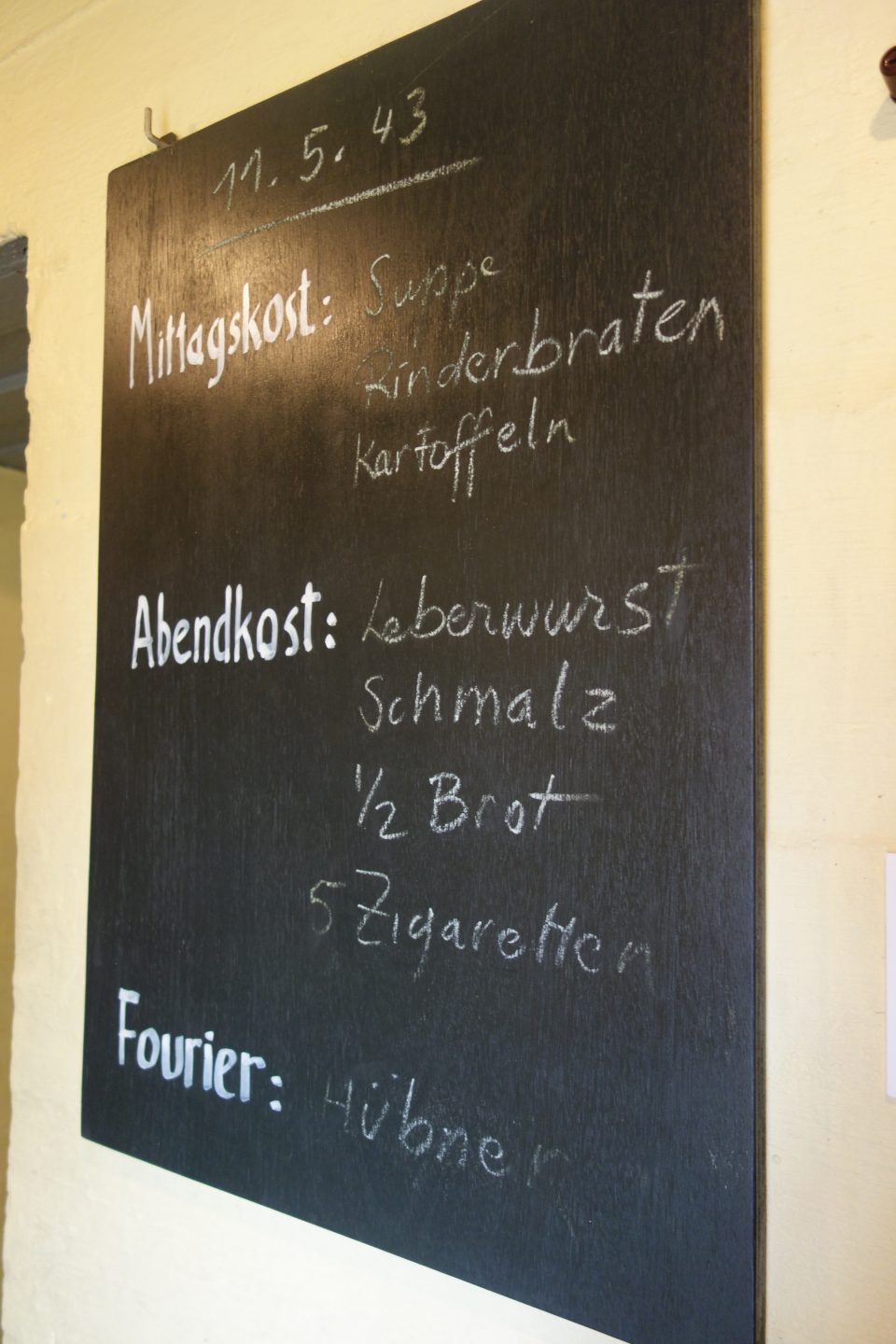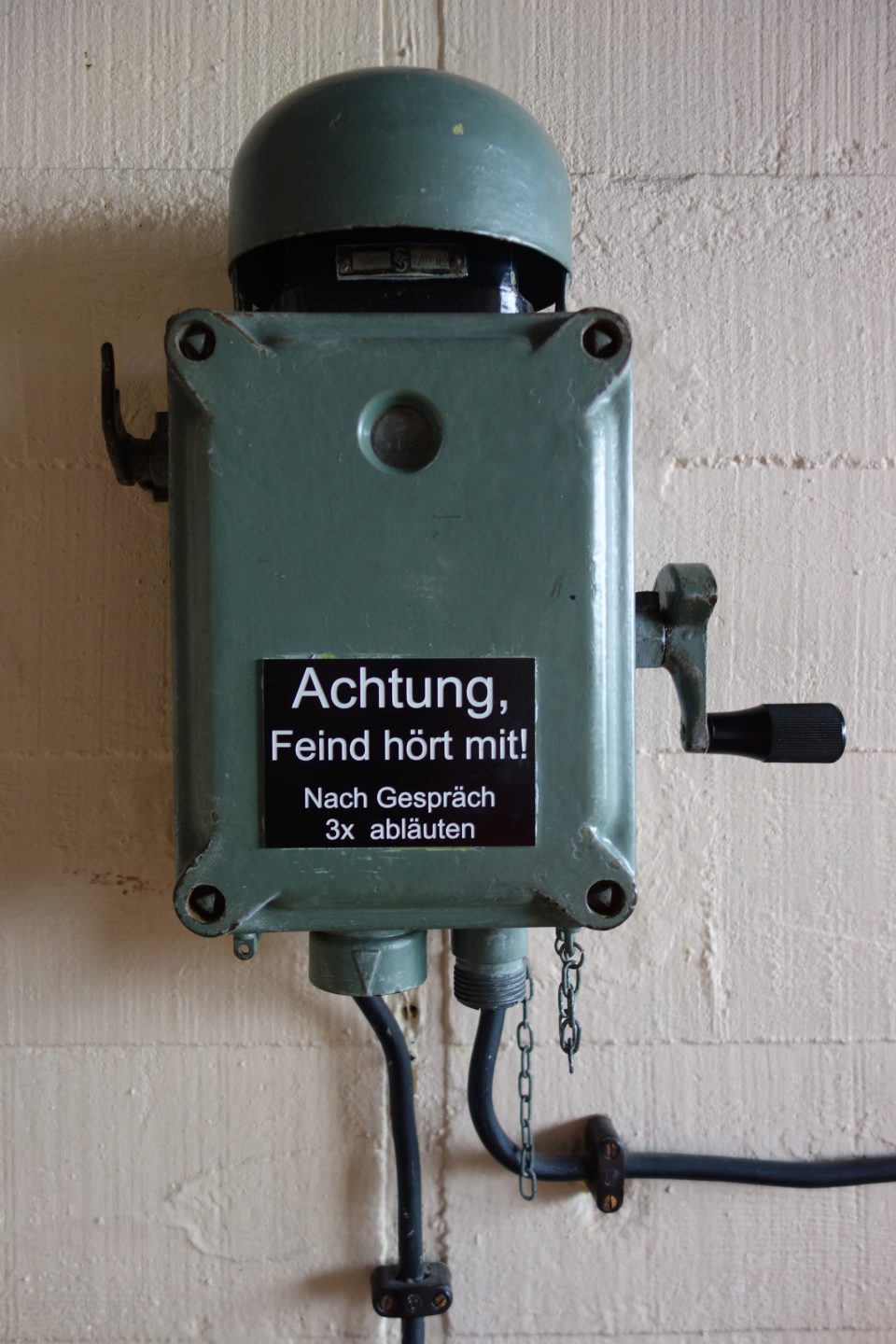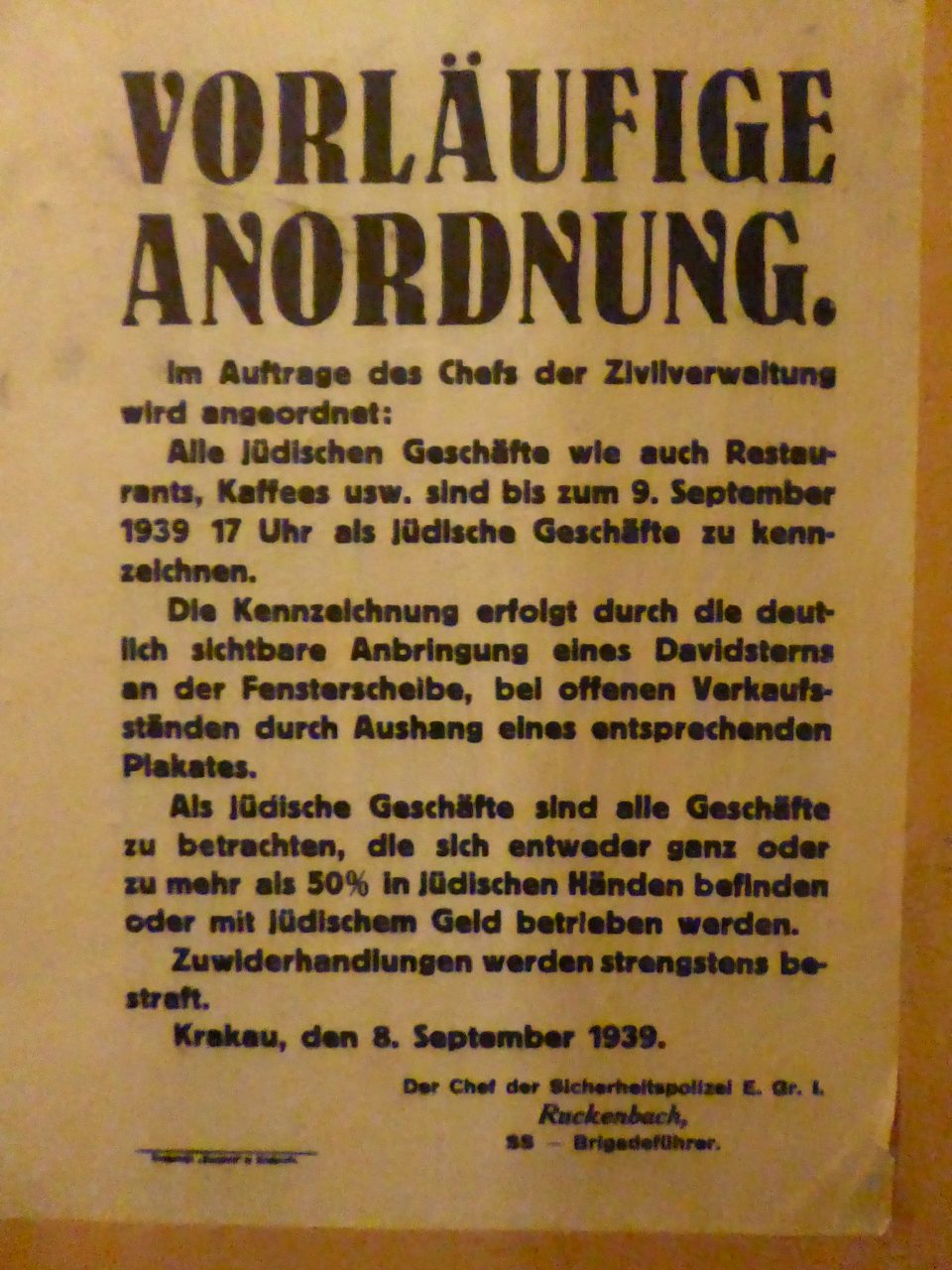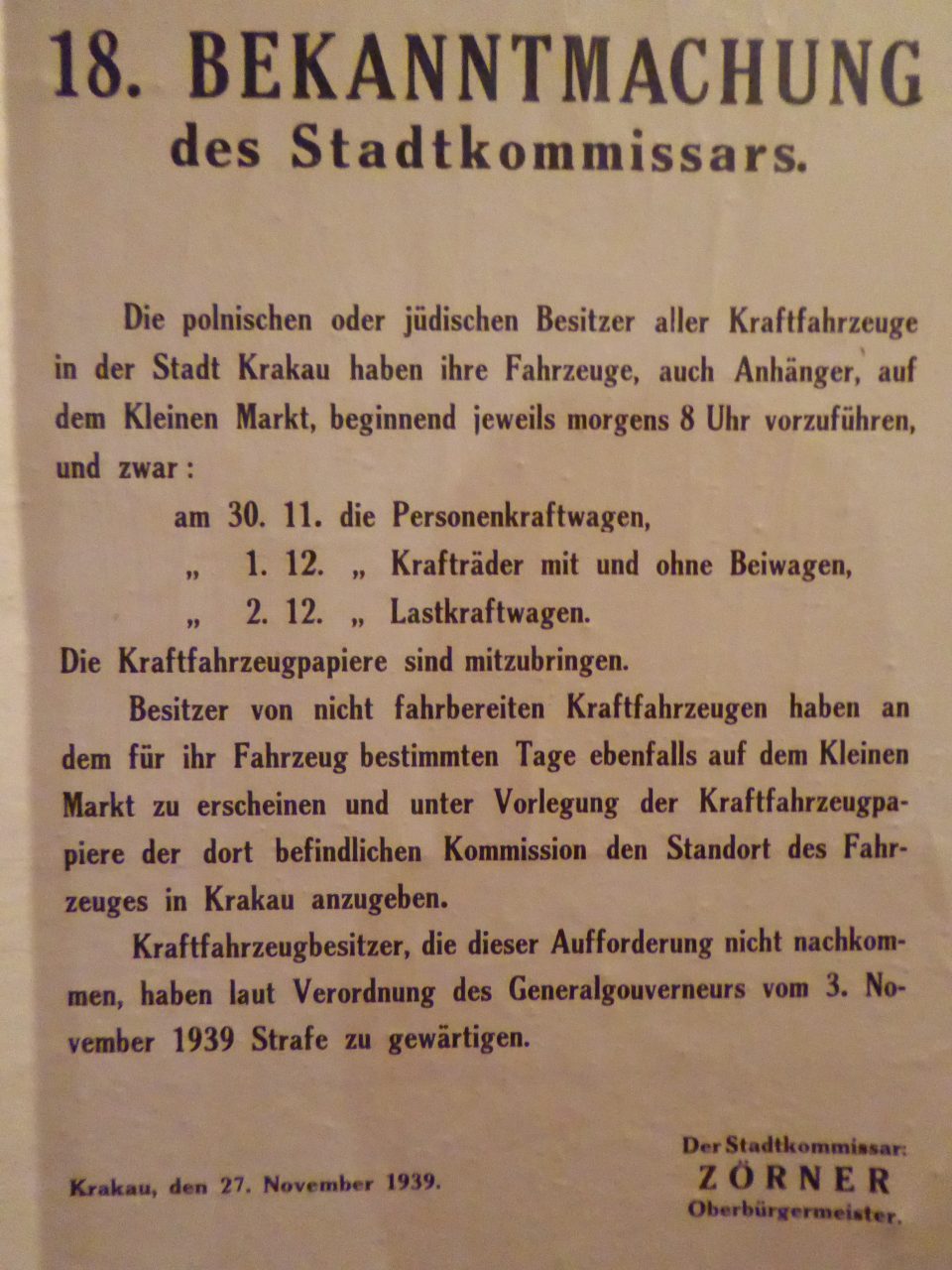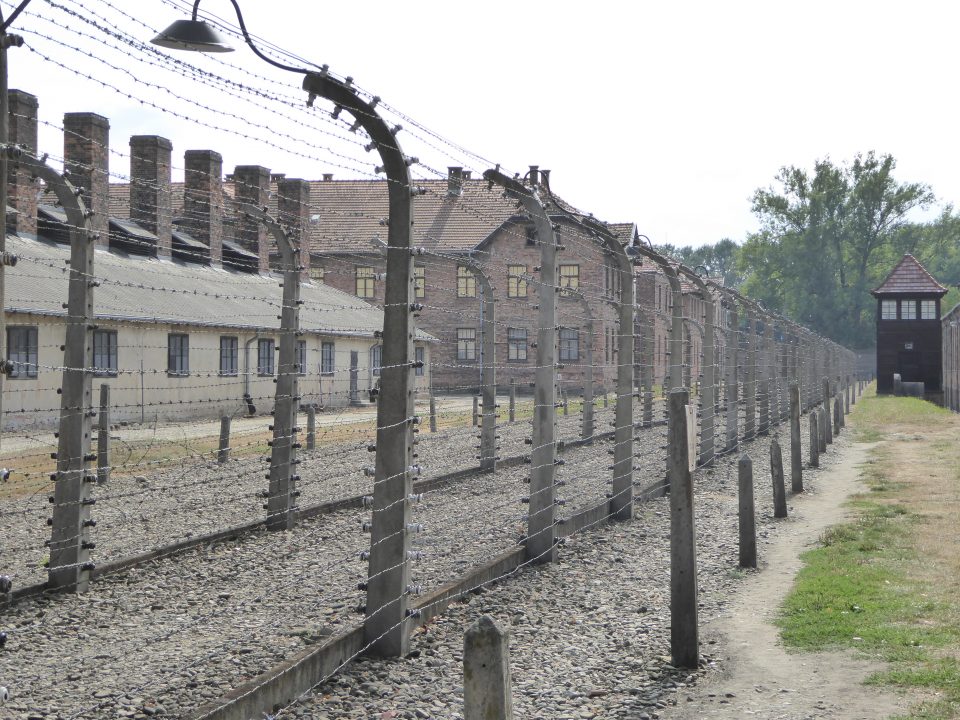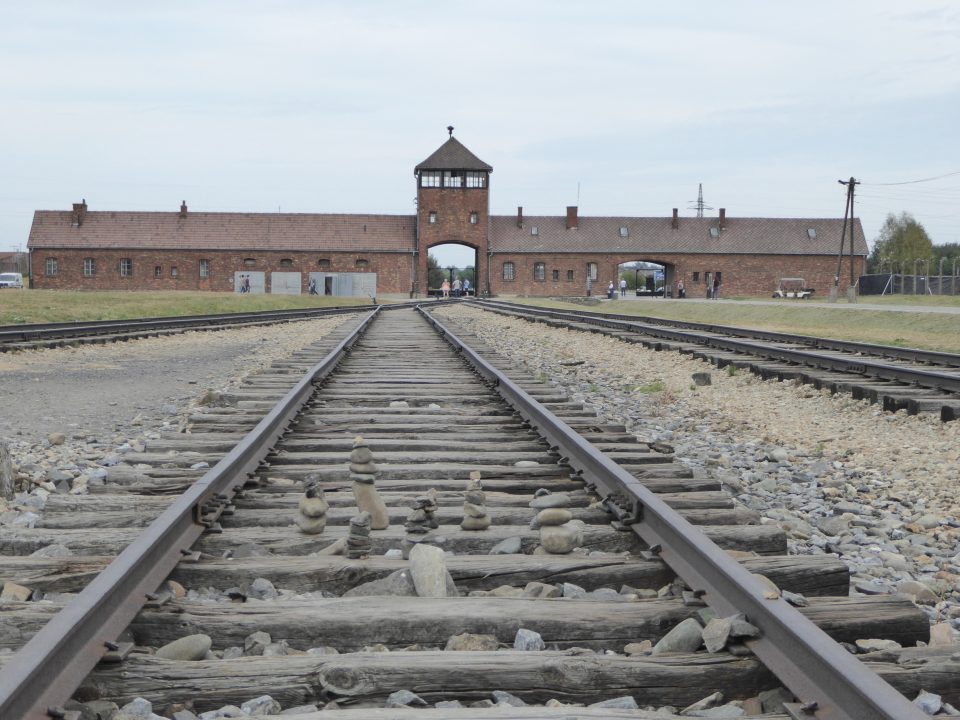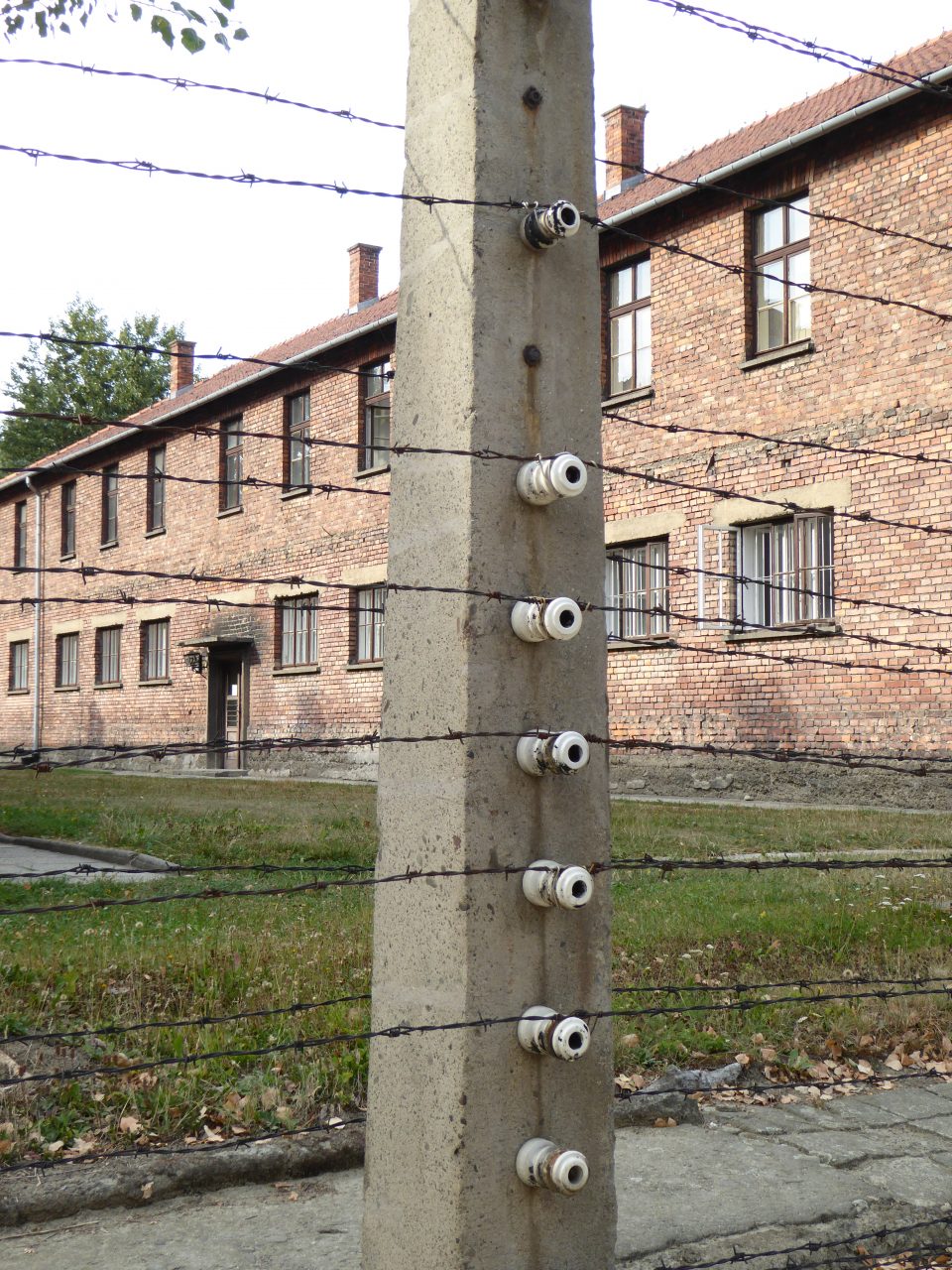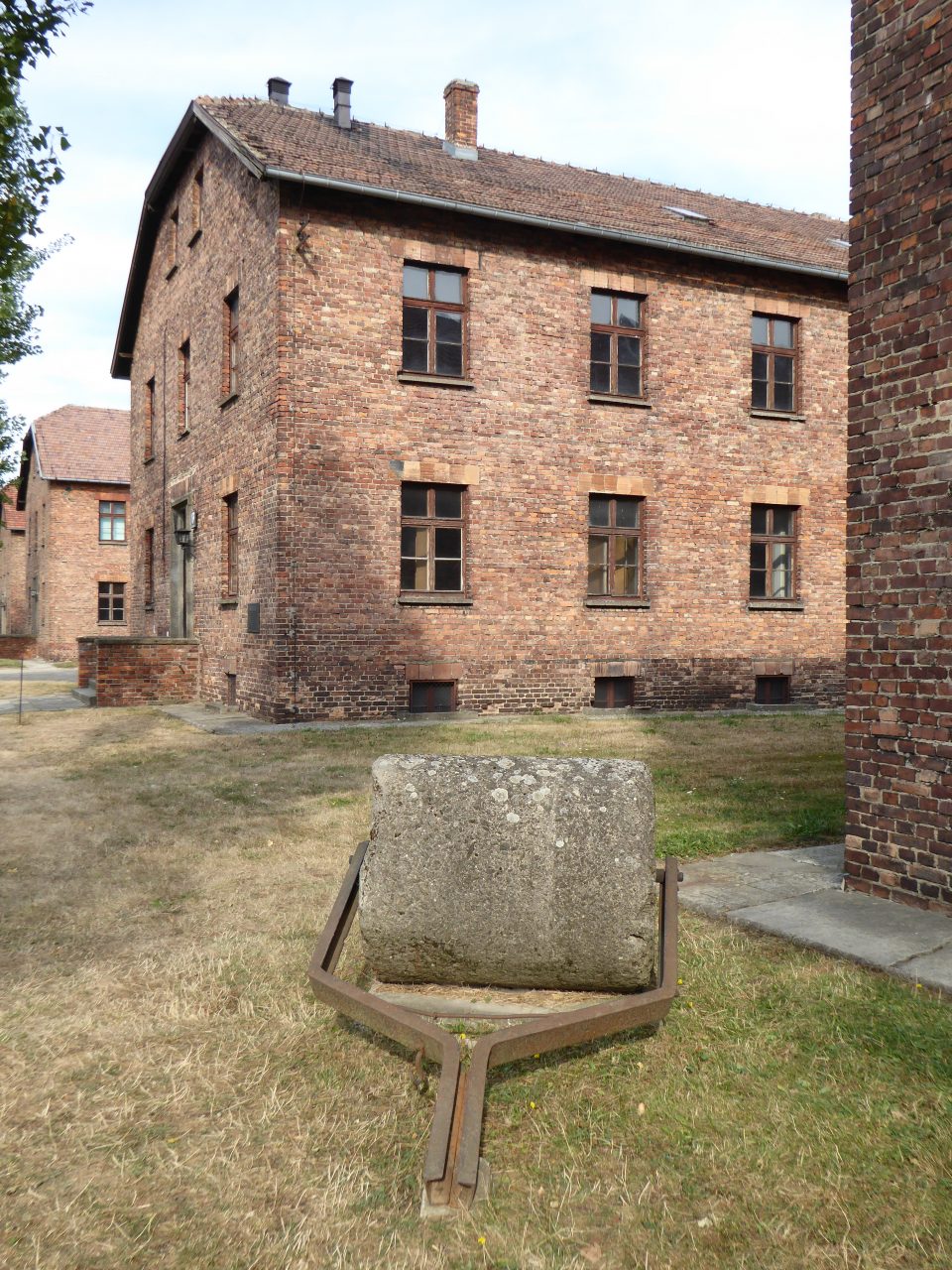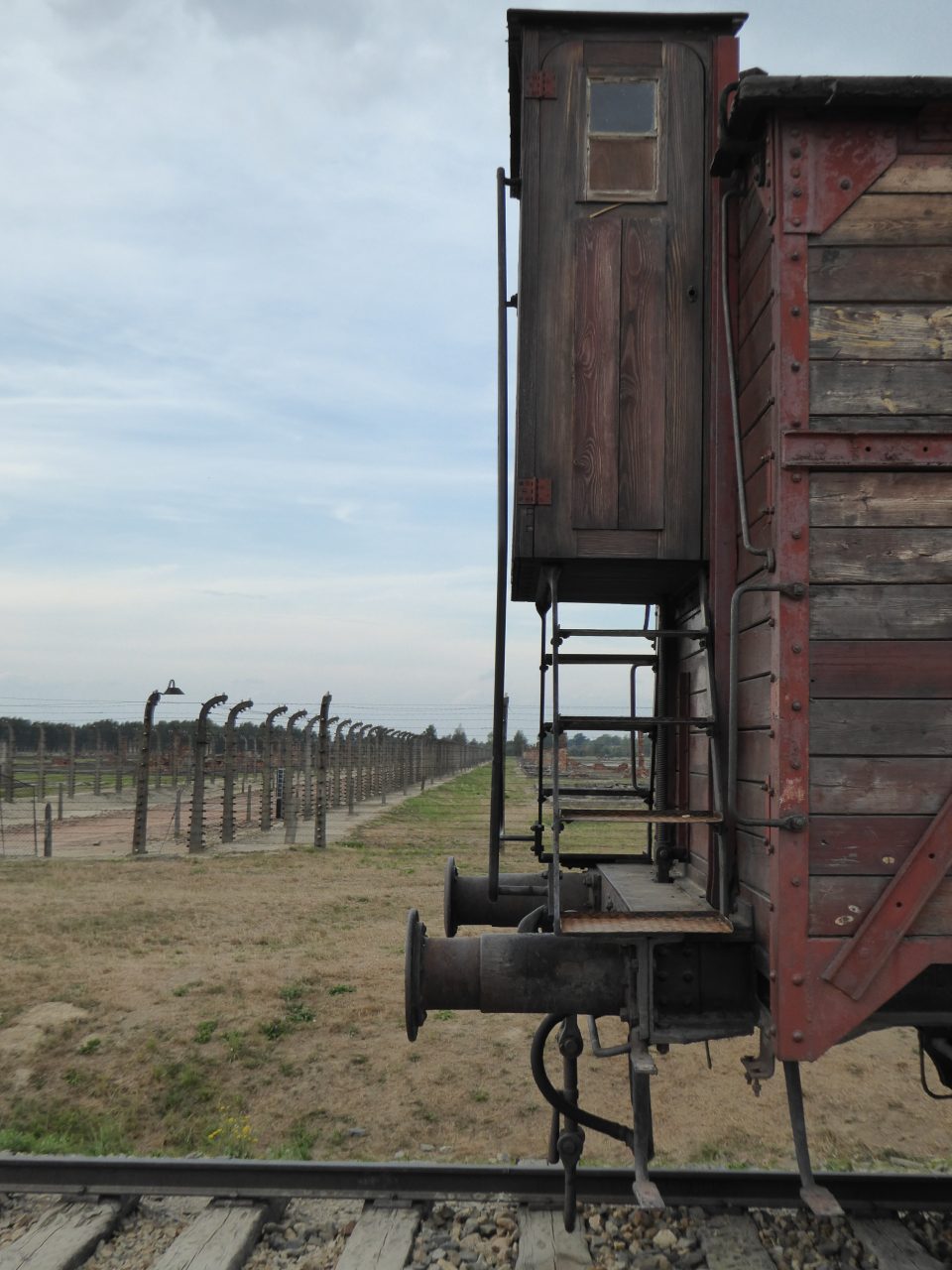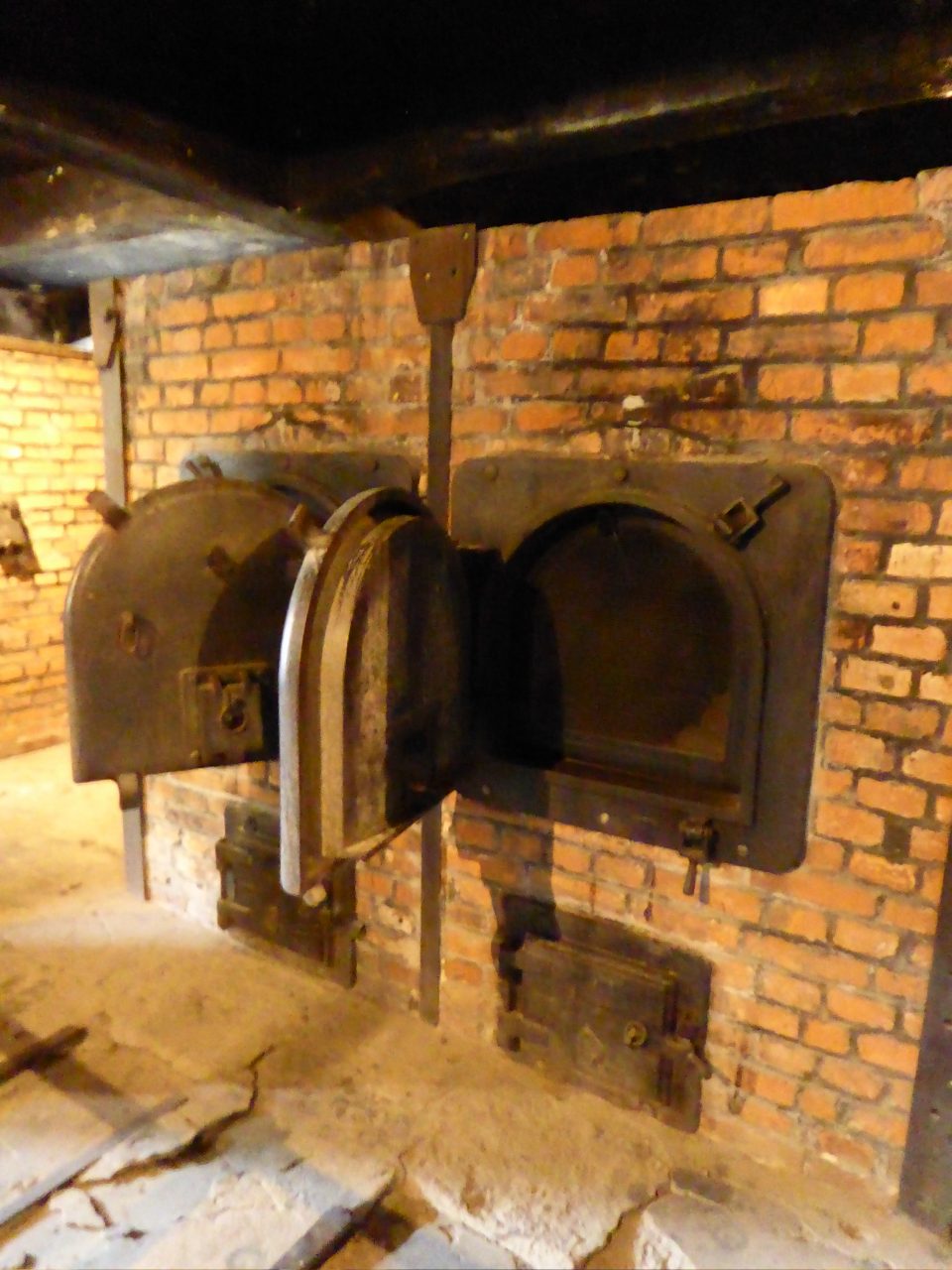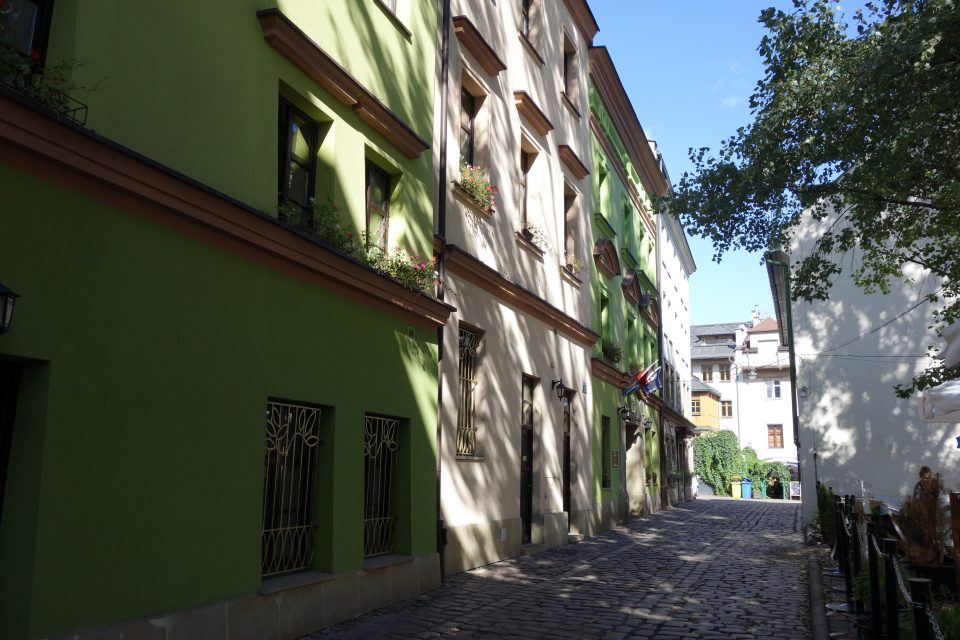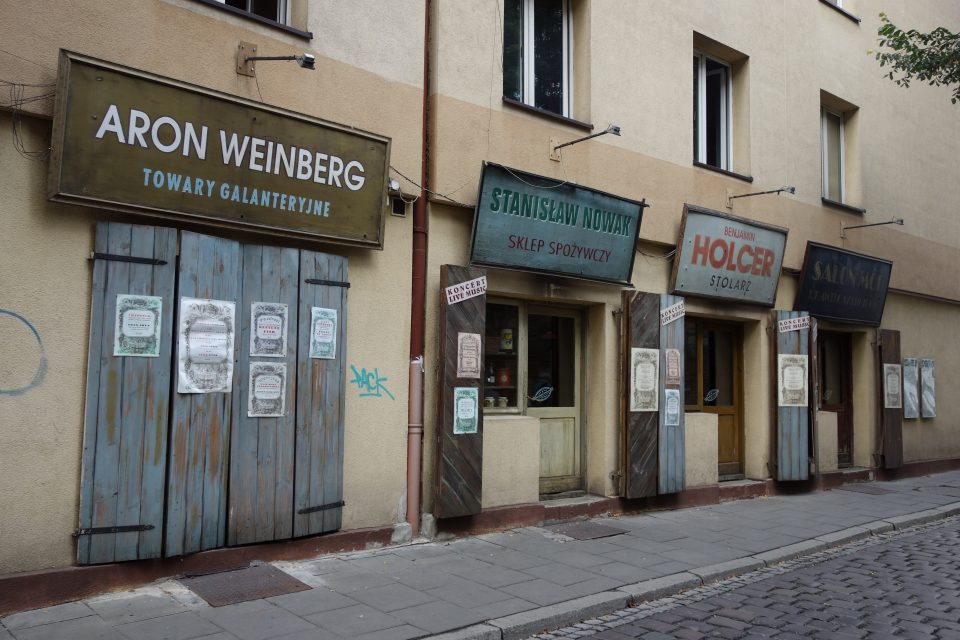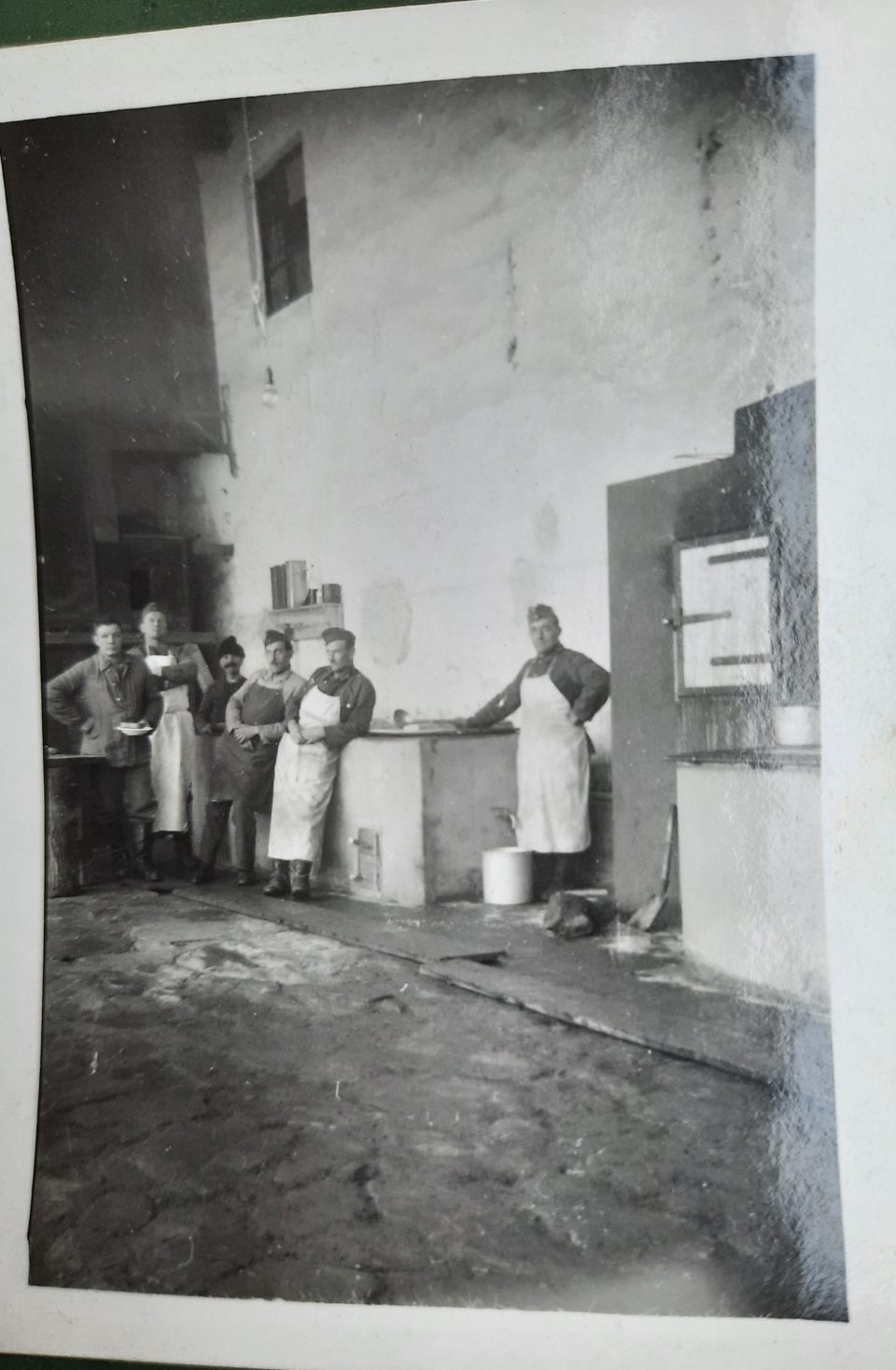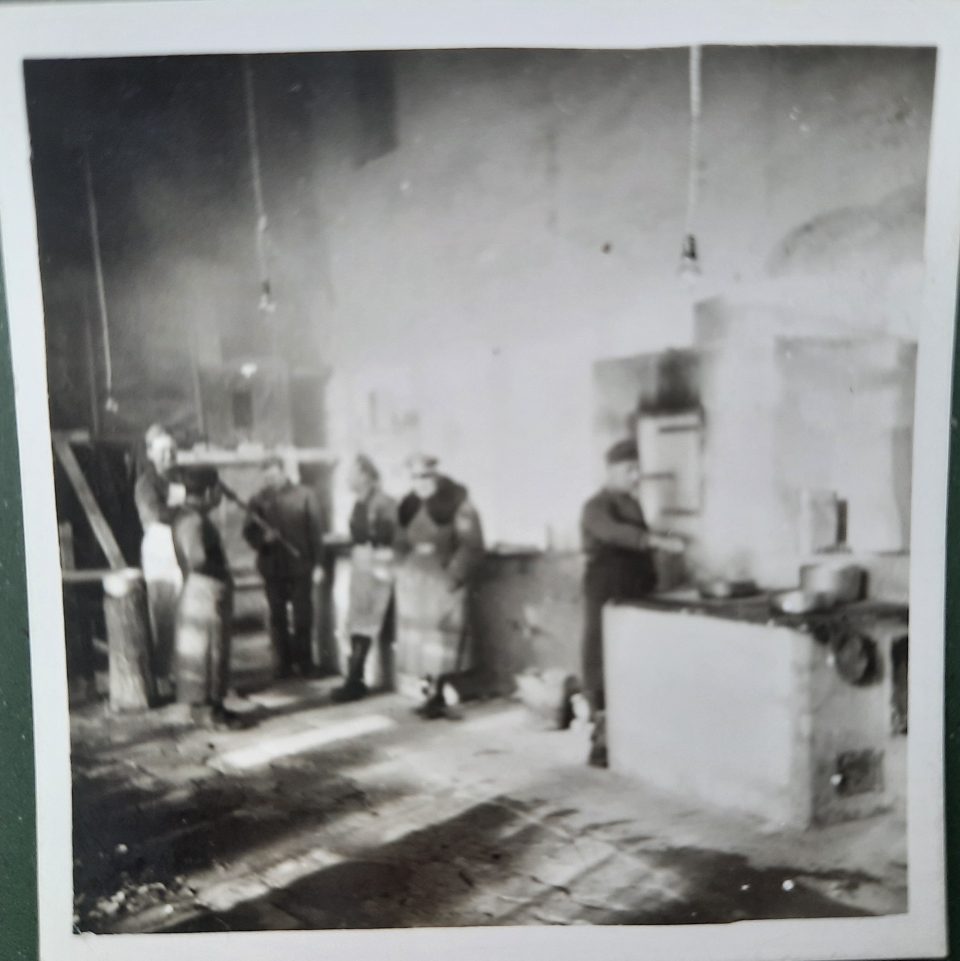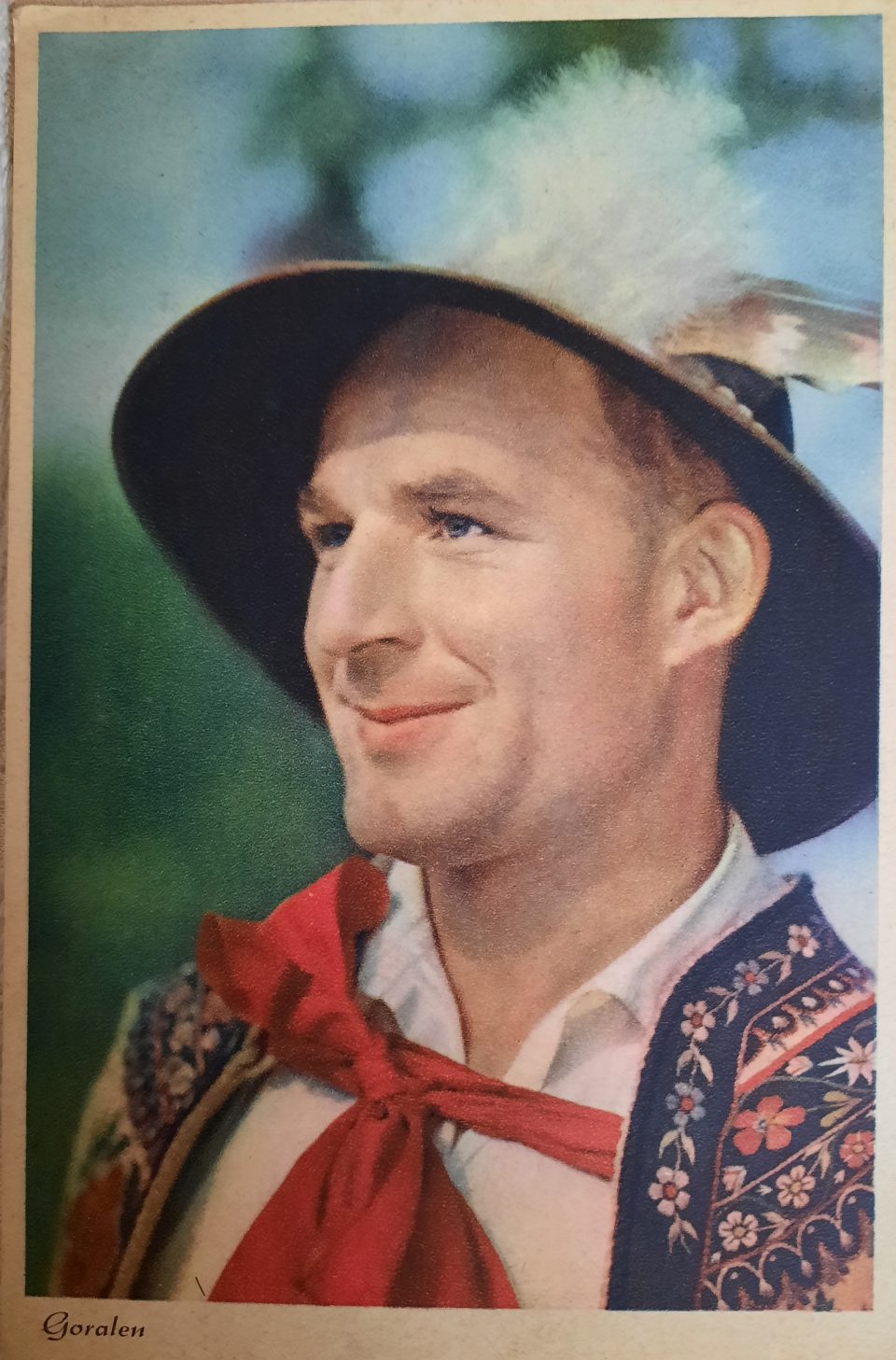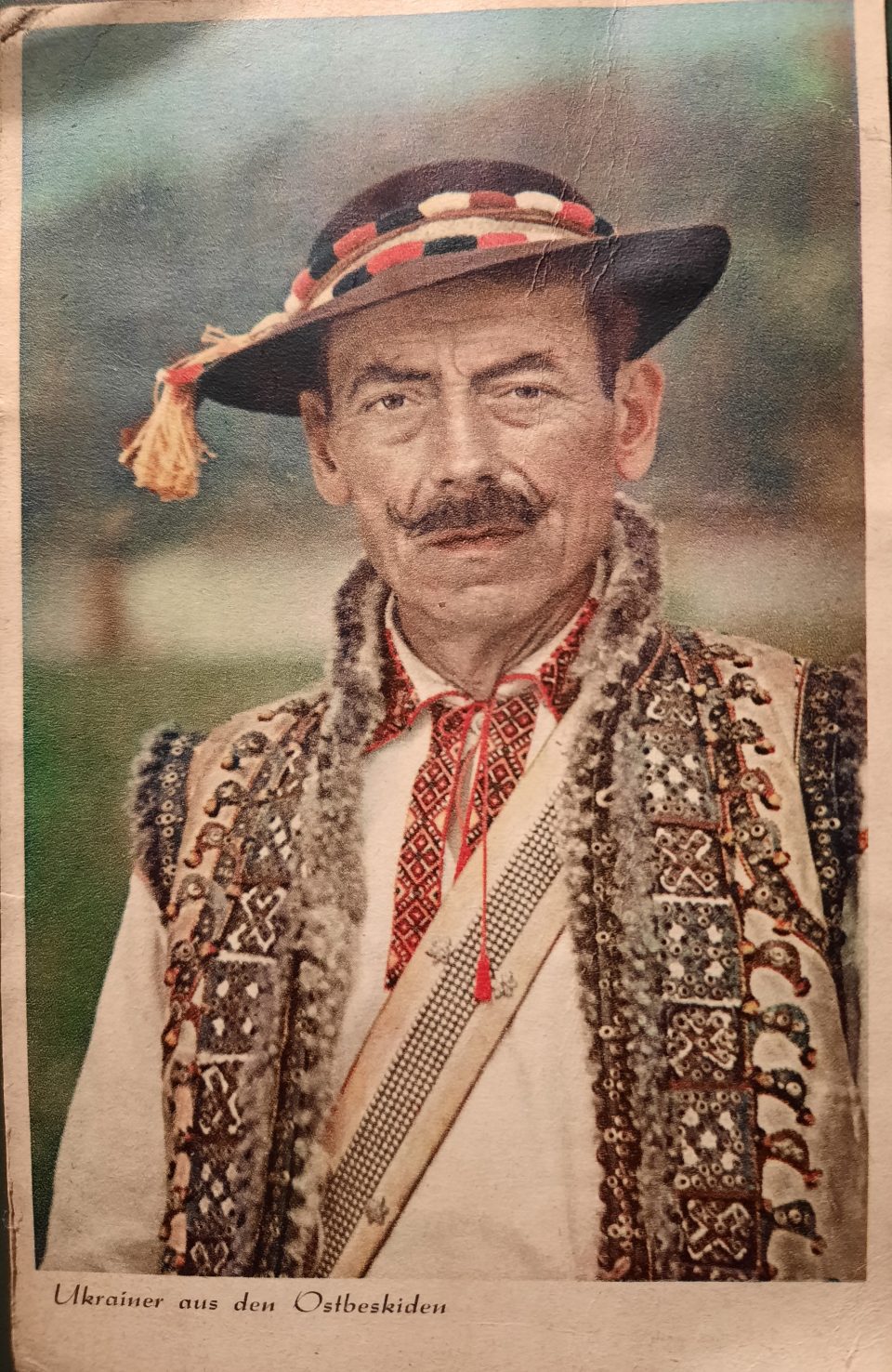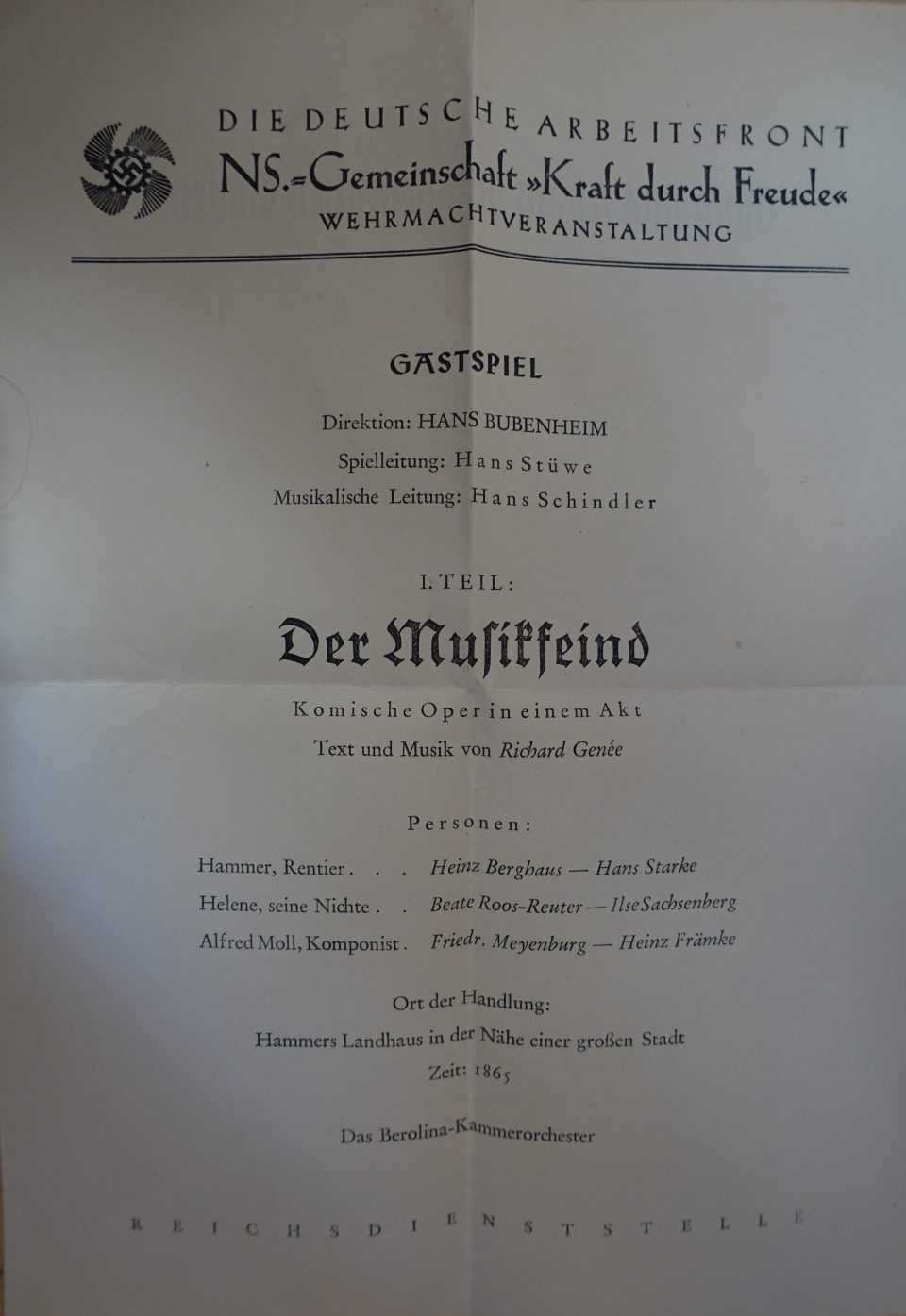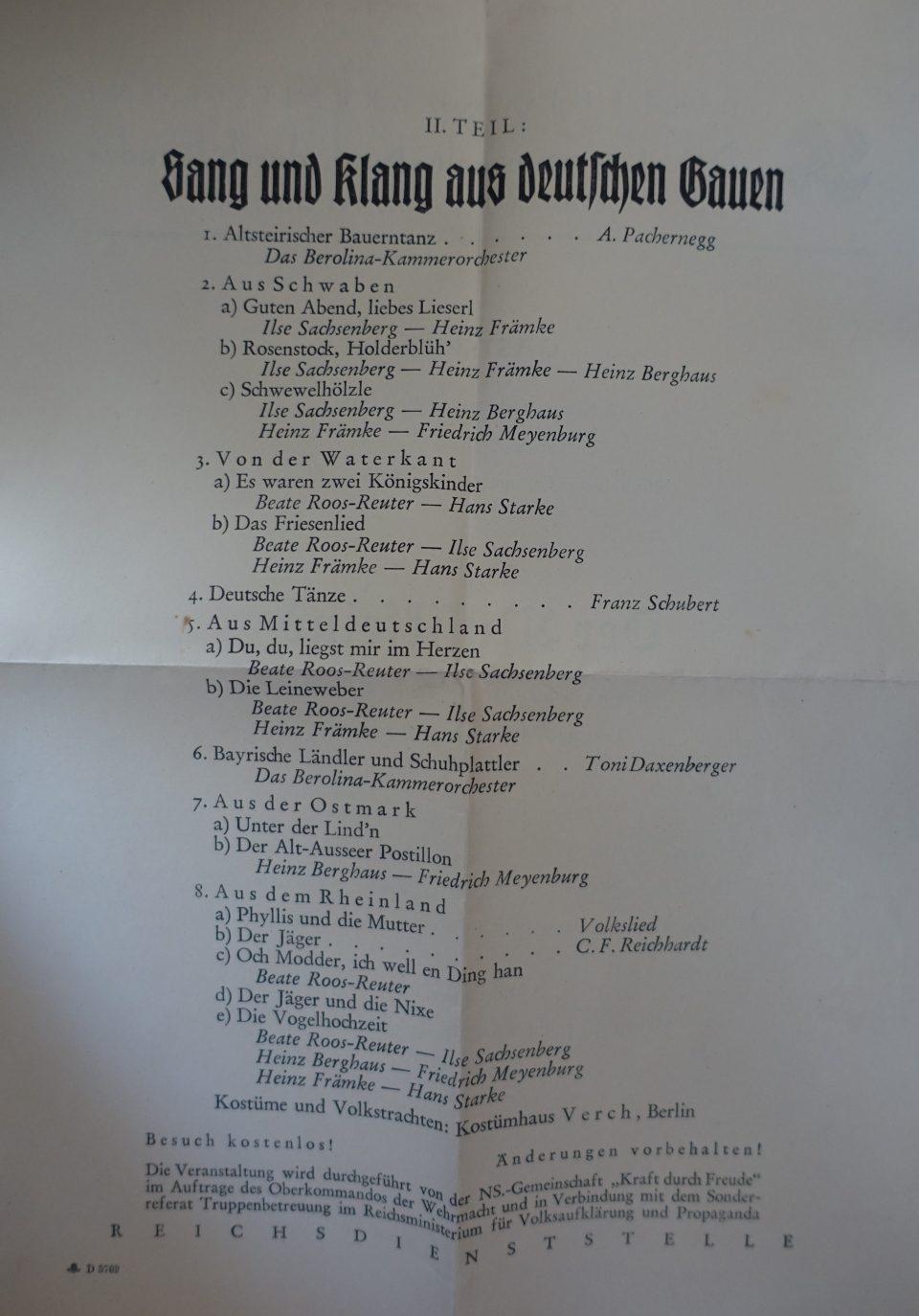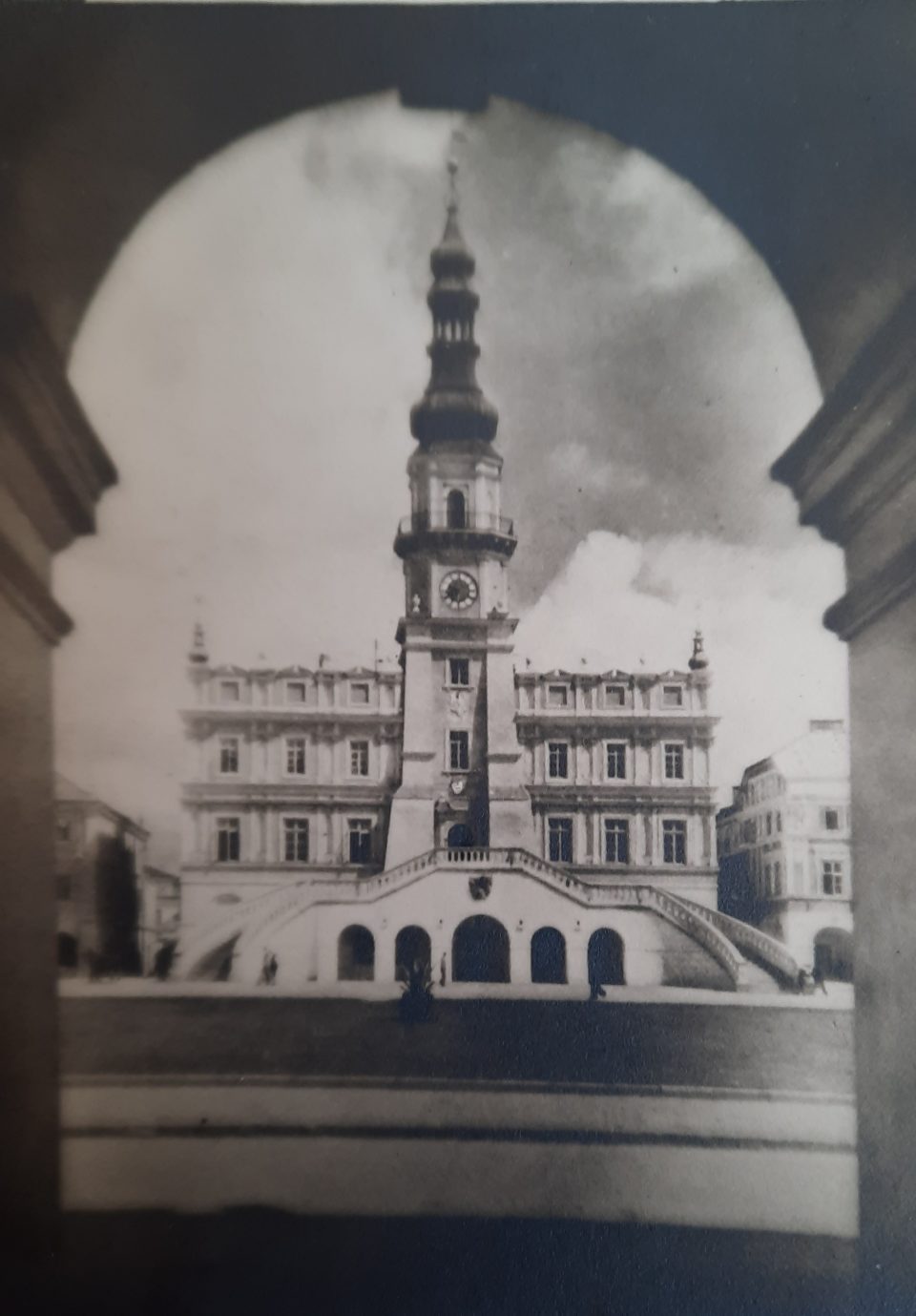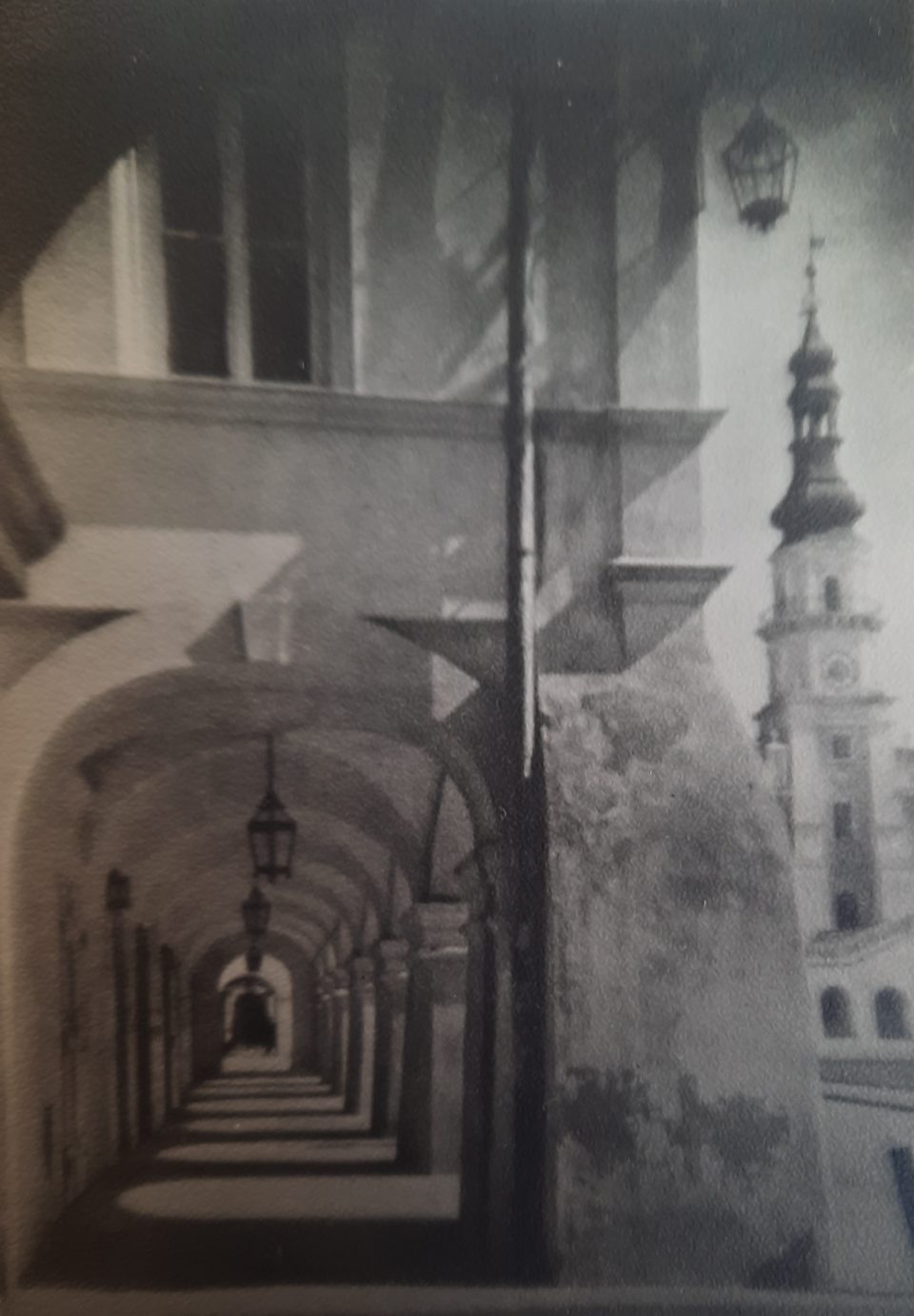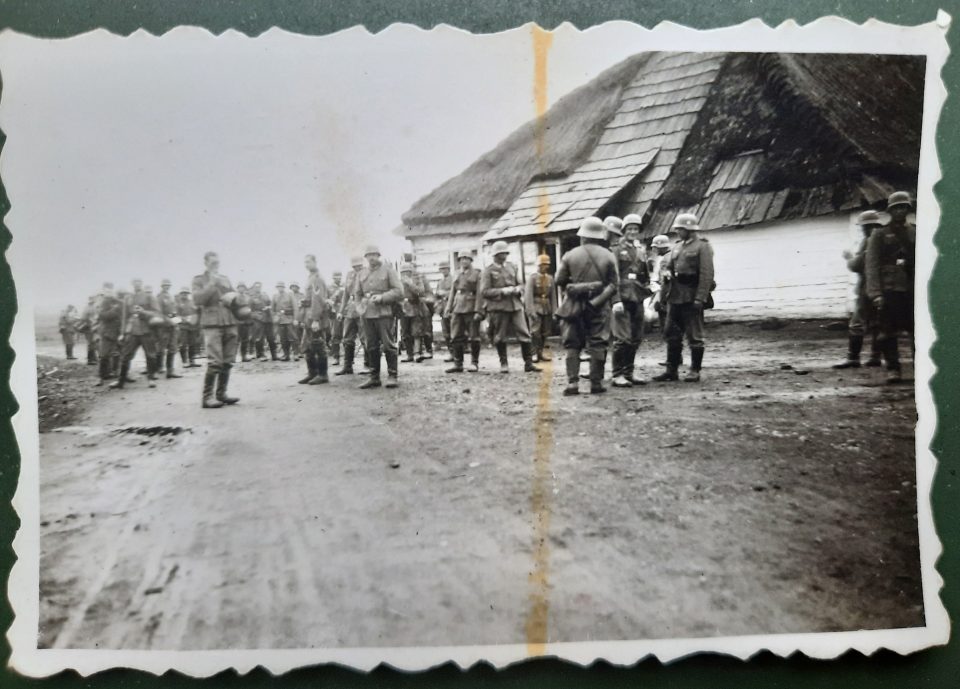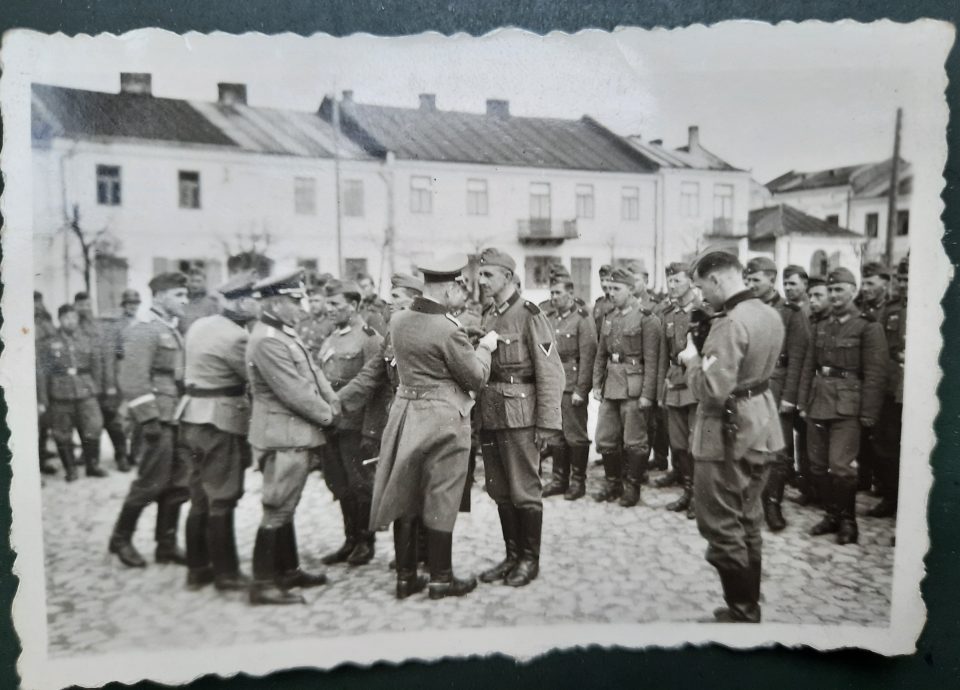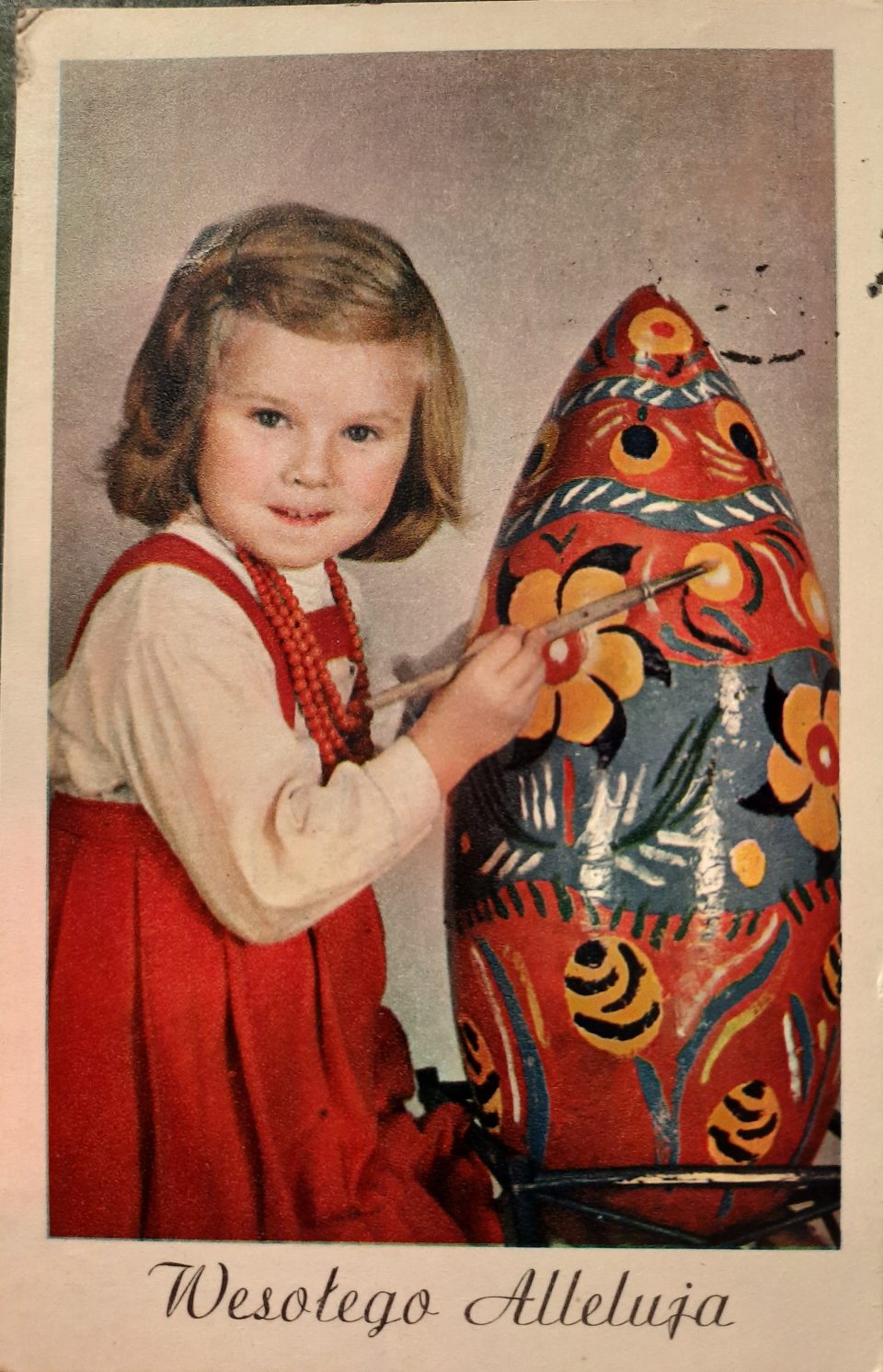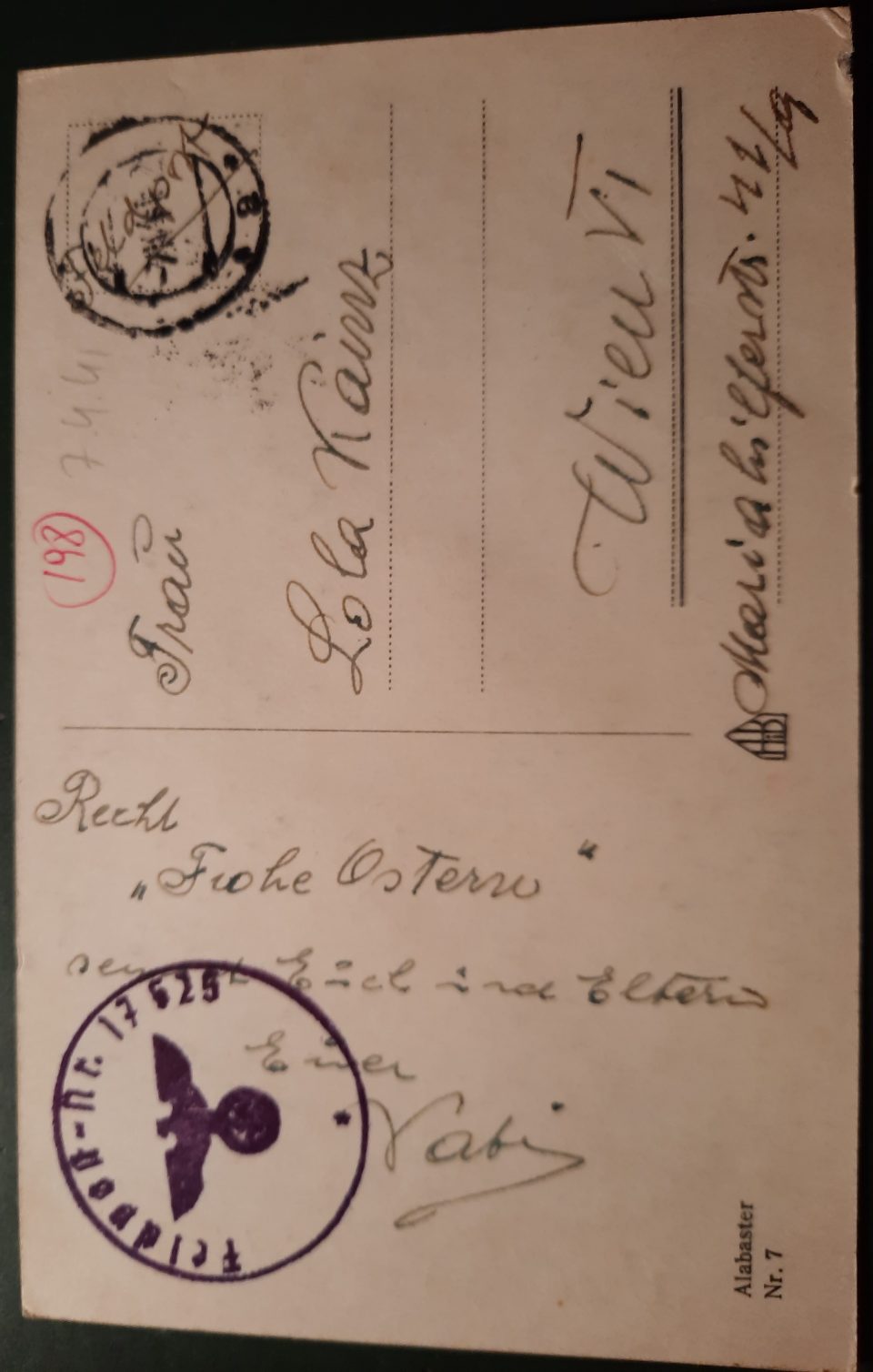Left: Sample of a Wehrmacht menu (lunch: soup, beef and potatoes, dinner: liver pâté, lard, bread, 5 cigarettes) Right: A telephone with the warning: the enemy is listening in!
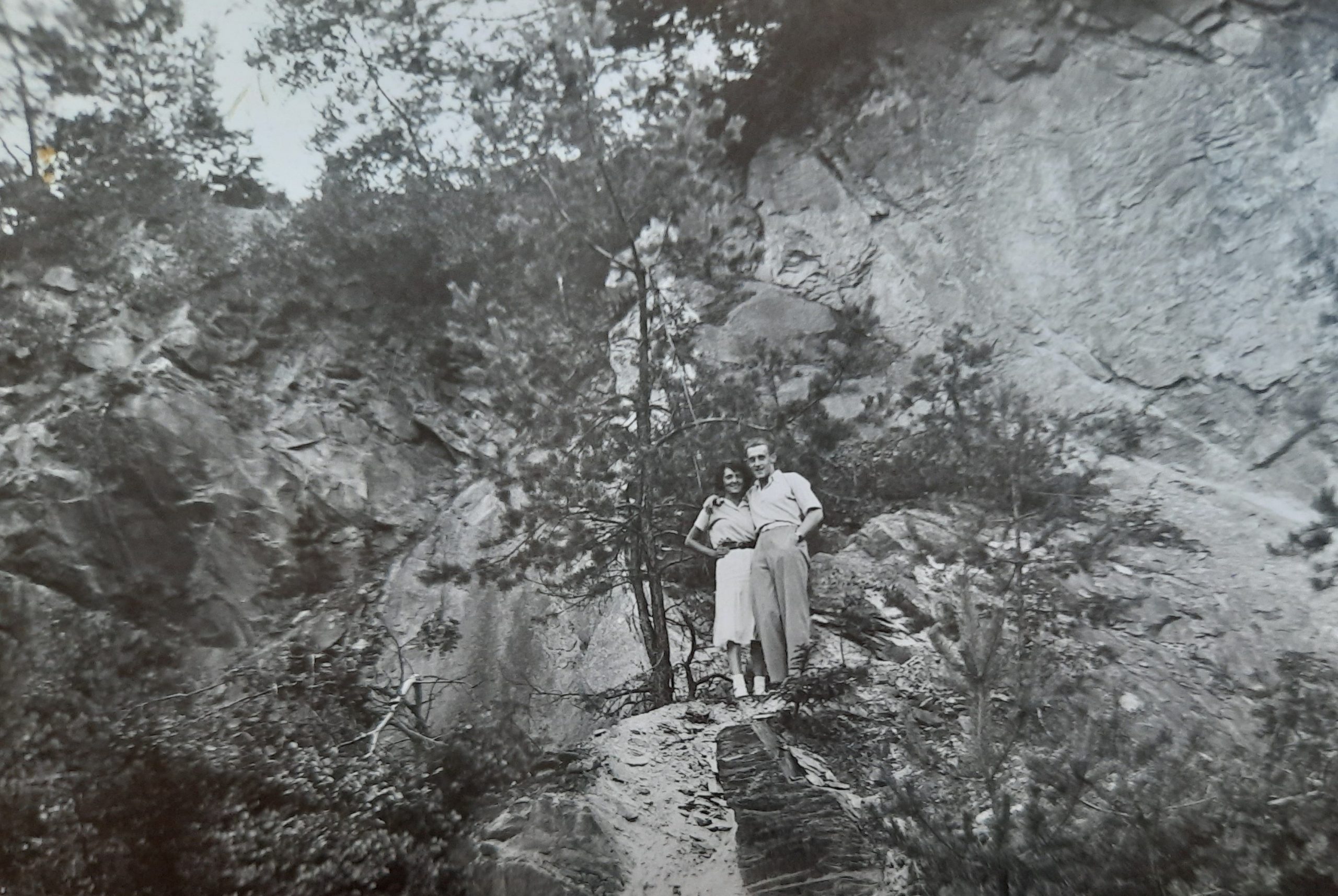
Toni and Lola as a newly-wed couple in Preßbaum near Vienna before the war
Anton Kainz (Toni), my grandfather, was drafted to the German Wehrmacht in March 1939, a year after Hitler had incorporated Austria into the German “Third Reich”. When the 2nd World War broke out in September 1939 Toni was assigned to the “3rd Sappers’ Battalion XVII 79/B” of the German Wehrmacht as a sapper (“Bausoldat”) in February 1940 and had to complete ten weeks of training in the Vienna Arsenal. He was sent to France in June 1940 and remained there until September 1940. From September 1940 until June 1941 he was with the “2nd Sappers’ Battalion 153 /288” in Poland (the then so-called “Generalgouvernement”) until he was dismissed from the German Wehrmacht and declared “n.z.v. (“nicht zu verwenden” – not to be used) because he refused to divorce his Jewish wife, Lola, my grandmother. In this one year as a soldier he wrote 246 long letters and a few postcards to his beloved wife and daughter with detailed descriptions of the life of a common soldier, his tasks and activities, his feelings and emotions and his attempts at handling the precarious situation of his wife and daughter in Vienna from a distance. A detailed analysis of his documented experiences forms the core of this article. The historical analysis of the 246 letters which Toni wrote to his wife in this period is divided into three categories: first, information about the military campaign, where he was stationed, the military tasks and operations, and the conditions of the military service; second, in which way he tried to support his family in Vienna and how he organised important tasks at home from a distance and third, his emotional conditions on the military front line.
Public announcements by the German occupiers in Krakow on 8 September 1939 about the marking of all Jewish shops with a Star of David and on 27 November 1939 about the requisitioning of all Polish and Jewish private motorised vehicles
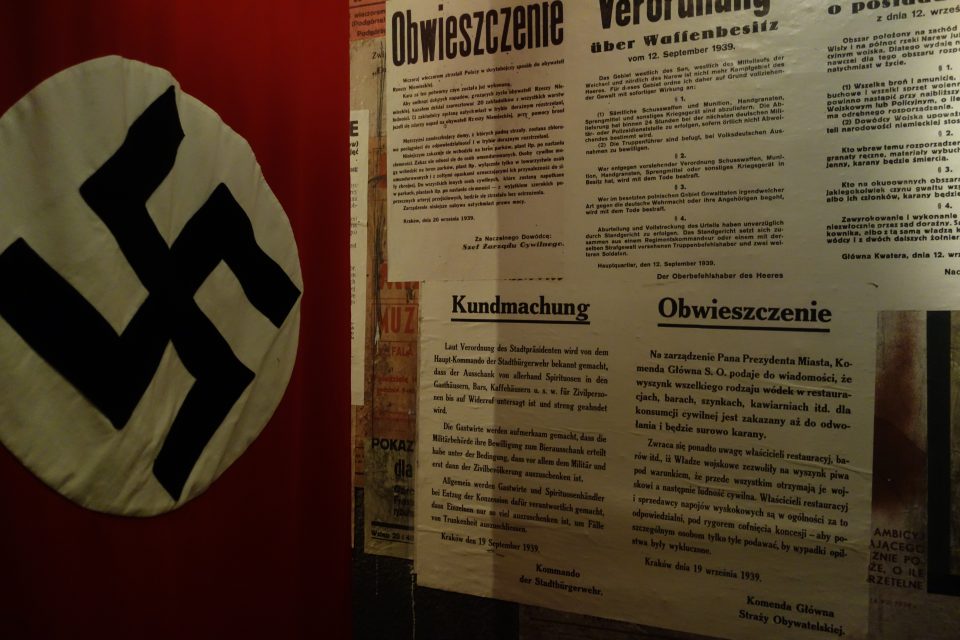
A public announcement in Krakow on 19 September 1939: Alcohol can only be offered in inns, cafés and bars to Wehrmacht soldiers and no longer to Polish civilians
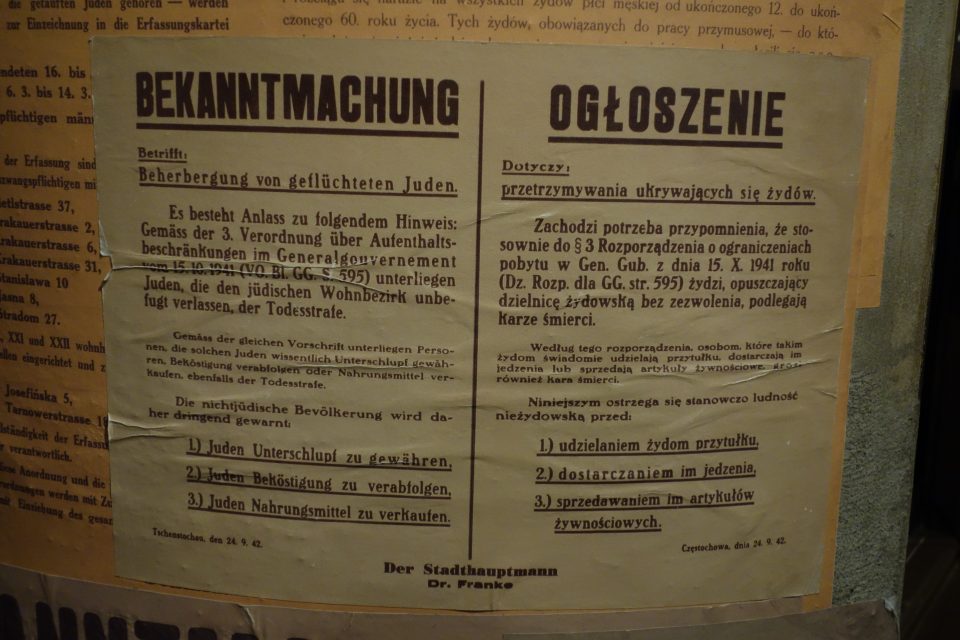
A public announcement in Krakow on 24 September 1942 informing Polish civilians about the drastic punishment they have to face if they assist Jews
On 1 September 1939 the German armed forces under Adolf Hitler attacked Poland, which was the start of World War II. Germany’s invasion of Poland was characterised by the so-called “blitzkrieg” strategy; a surprise attack of extensive bombing to destroy the enemy’s air capacity, infrastructure and communication lines, followed by a massive land invasion with large numbers of troops, tanks and artillery. As soon as the Germans had set up bases of operation in Poland, they started to annihilate any opposition to their Nazi regime. Although the Polish army counted 1 million soldiers, it was badly equipped and severe strategic miscalculations contributed to the fact that the Polish forces could not be a match for the technologically much more advanced German forces. The Poles had hoped for a Soviet intervention, but Stalin had signed with Hitler the Ribbentrop-Molotov Non-Aggression Pact already in August 1939, which secretly stated that Poland would be divided up between Hitler and Stalin. Great Britain and France declared war on Germany and Great Britain responded by bombing German territory three days later. Earlier on Britain and France had acquiesced to German rearmament and the annexation of Austria, the “Anschluss” in March 1938, because they were not prepared to fight another war against Germany so soon after the end of World War I. In September 1938 they even pressured Czechoslovakia to yield to Hitler’s demand for the incorporation of the Czech border region to Germany known as the “Sudetenland” with its large German-speaking population. Although Britain and France had guaranteed the integrity of the remaining Czechoslovakia, Hitler incorporated the Czechoslovak territory in March 1939, by that violating the Munich Agreement of September 1938.
In order to justify their attack on Poland the German military together with the SS staged a phony Polish attack on a German radio station and used this action to resort to “retaliation” against Poland. German troops reached Warsaw eight days later and started a siege of the city, which suffered severe damage and had to surrender on 28 September. The Polish forces were heavily outnumbered and despite tough resistance they were defeated within a few weeks. The Soviet Union invaded Eastern Poland on 17 September 1939 and Poland was divided along the Bug River into a German- and a Soviet-occupied territory. Some Polish soldiers managed to flee across the border to Romania and the West to join the Free Polish Forces. Several of them joined the British Royal Air Force and took part in the “Battle of Britain”. On October 1939 Hitler annexed the Polish territories along the Eastern German border, such as Western Prussia, Upper Silesia and the city of Danzig (Gdansk). The rest of the German-occupied Polish territory was subjugated under a Governor General, the Nazi Hans Frank, as the “Generalgouvernement” (General Government). Toni was stationed there as a Wehrmacht soldier from September 1940 until June 1941 after having served in France (see article part 1).
The British and French commanders were still stuck in World War I strategies and were totally unprepared for the “blitzkrieg” in Poland. War was only declared three days after the invasion on 3 September 1939 because the Western Allies had hoped that Hitler would respond to their demands and end the invasion. The hoped-for French and British offensive in the west did not take place. On the contrary, on 13 September French troops were ordered to fall back behind the defensive “Maginot Line”. Germany had gained a swift victory but that was only the start of World War II because Britain and France refused Germany’s offer for peace and so Hitler’s gamble had failed. He had been confident that the invasion of Poland would be brief and victorious because the Polish army was unprepared and that Neville Chamberlain, the British Prime minister, and Edouard Daladier, the French President, would rather opt for a peace settlement than wage another war. Hitler had won a substantial revision of the Peace Treaty of Versailles of 1919, ending World War I, which was by than widely regarded as an unfair penal peace even in the West, not just in Germany. Unfortunately many believed that communism posed the greater threat to Western democracies than fascism and welcomed a strong Germany as a bulwark against the Soviet Union. That is why Hitler had enjoyed astonishingly positive press coverage in Western democracies until 1938. Germany had even been allowed to host the Olympic Games of 1936, which were turned into a propaganda event for the Nazis. The positive climate ended after the “Munich Agreement” in March 1939, but Hitler was emboldened by his earlier successes and dismissed the concerns of his generals, but demanded total loyalty instead.
The German tanks quickly devastated the Polish defence, encircled the Polish troops and annihilated them as the German attackers far outnumbered the Polish army in manpower and equipment: 3,234 German fighter planes attacked 842 Polish ones. In this attack on Poland the German Wehrmacht lost 3,234 soldiers and 30,222 were wounded, whereas 123,000 Polish soldiers died and 133,700 were wounded and 694,000 were taken prisoner by the Germans. Now the terrible walk through hell started for Poland: the nearly complete extinction of the Polish Jews, the terrible suppression of the Polish people by the NS regime and the mass internment of Poles in slave labour camps. The Polish soldiers who had fought bravely to defend their country had had no chance in this unequal battle and many ended up in German and Soviet labour camps. Hate begot hate, which resulted in aggression against the German-speaking minority in Poland and in excessive anti-Semitic attacks against Jews by Poles. The Jews had to flee the German Nazis and their Polish compatriots. Nevertheless, those Poles who helped the Jewish population despite death threats by the Nazis should never be forgotten.
In August 1939 a secret additional protocol to the so-called “Hitler-Stalin-Pact” already stipulated the separation of north-eastern and south-eastern Europe into “spheres of interest” of Germany and the Soviet Union and by that the partition of Poland along the rivers Narew, Weichsel and San. From the 17 September on Soviet troops occupied the eastern part of Poland. But Hitler’s plan had just been to incorporate Poland without any disturbance of the Soviets and to gain an ideal starting position for his already planned attack on the Soviet Union. The rest of the world assumed that this pact would secure peace in Europe because they were unaware of the secret supplementary protocol. When Hitler invaded the Soviet Union in June 1941 he incorporated the Soviet-occupied Polish territories, too. The NS propaganda machine indoctrinated the German soldiers and the German public creating the image of “slawischer Untermensch” (Slavic subhuman being) and many of the German soldiers succumbed to this prejudice and believed they dealt with a “primitive people” when they were on Polish territory in the so-called “Generalgouvernement”. Yet most German soldiers acknowledged the bravery of the Polish soldiers, but had virtually no contact to the Polish population. What can be seen from the original documents is that Toni and his friends were different; they did build up friendly relationships with the local population.
The command of field marshal von Reichenau, commander of the 6th German Army, on 6 October 1941 constituted a defiance of the international law of war and put the Wehrmacht per definitionem at the same level as the SS, which was then responsible for genocide behind the front lines just as the SS and other NS organisations z.b.V. (“zur besonderen Verwendung”= for special use). Unfortunately, anti-Semitism was deeply rooted in the Polish population, too, and attacks against Jews were largely supported by the local population. In war diaries of German officers one can find many hints to their aggressive anti-Semitism, for example they wrote about “ugly and dirty Jews” and that “no one wants to be stationed in a city like Tarnow, which is a virtual Jew city”. But one can also find comments of ordinary privates who showed mercy and compassion towards the Polish Jews. The Viennese private Alfred Pietsch was shocked about the destitution of the inhabitants of the Warsaw ghetto and the squalor there when he had to deliver some furniture to the ghetto in 1942. The German soldiers knew about concentration camps, but the privates had no idea what was really going on there. All knew about the abuse and the mistreatment of the Jewish population, but it was virtually impossible to act against military orders. Nevertheless there was a small number of “silent heroes” who defied the holocaust and tried to rescue Jews. Helping Jews was more dangerous than allowing partisans to escape because it was always punished by immediate execution. In the memorial of Yad Vashem in Israel 83 Austrians are listed among the “Righteous among the Nations“, 45 of them were members of the German Wehrmacht.
How was the Austrian army integrated into the German Wehrmacht after the “Anschluss” in March 1938? During the First Republic the Austrian army was underfunded and little appreciated by the population. Contrary to the former k.&k. Habsburg Army, it was now a “politicised” army: from 1921 on the Austrian soldiers more or less had to be members of the Christian-Socialist “Wehrbund” and the army had to act as an obedient tool of the Christian-Socialist government, which became visible in the role the army took in the suppression of the Socialist protests in February 1934. After the ban of the Social Democratic Party, the Austro-Fascist regime relied in its defence on Mussolini’s Fascist Italy. Only when it became clear that Mussolini and Hitler were forging a pact, did the Austrian government decide to re-arm the Austrian Army. By introducing compulsory military service and re-introducing a general staff they violated the St. Germain peace treaty of 1919. Field marshal Alfred Jansa developed a defence plan in case of a German aggression, which was expected for the year 1939, but this “Jansa Plan” was so secret that even many divisional commanders were not informed. The Austrian High Command was anyway convinced that resistance was futile because the Austrian army was clearly inferior. Under the Austro-Fascist regime all soldiers and officers were supposed to be members of the Austro-Fascist “Vaterländische Front”, but the illegal National Socialist “NS-Soldatenring” was highly active inside the Austrian army and the climate therefore was characterised by mistrust and anonymous denunciation. On 11 March 1938 the partial mobilisation was announced and a marching order was issued to protect the border to Germany. Yet the officers were not informed by the government and the abdication speech of the Austrian Chancellor Schuschnigg caught them by surprise while they were having dinner. In the morning of 12 March they learned about the invasion of the German Wehrmacht and received the order to retreat into the barracks at 9.30. The enthusiasm of the Austrian population which welcomed Hitler and had already decorated official buildings, barracks and public transport with swastika flags surprised even many soldiers and overwhelmed them. Yet some officers were annoyed about the government’s decision not to show any resistance. Already on 14 March all Austrian officers and soldiers were sworn in to Adolf Hitler; only few dodged the ceremony which was not noticed in the existing turmoil, but those who officially refused to take the oath, were immediately dismissed and persecuted. Around 30 Austrian officers were imprisoned or deported into concentration camps, six of which died there. Furthermore, 123 “non-Aryans” (officers of Jewish descent) were dismissed from the army on the spot. The orders of the German High Command (von Bock and von Brauchitsch) of 14 March 1938 already marked the end of the Austrian army and the complete absorption into the German Wehrmacht, although the Austrian soldiers and officers were not aware of this fact at that point in time. The pompous military parade along the Viennese Ringstrasse on 15 March covered up the tragic side of the end of the Austrian army: 67 Austrian officers were dismissed and 50 officers who had had to leave the Austrian army before because of illegal membership in the NSDAP were reinstated. Just to mention two of the tragic destinies: the student at the military academy and son of the Austrian vice-chancellor, Herbert Fey, committed suicide after learning that his parents had taken their lives and the field marshal Johann Friedländer was dismissed as a Jew, lost his flat and was deported to the KZs Theresienstadt and Auschwitz, where he was murdered in 1945.
KZ Auschwitz Birkenau near Krakow
Most Austrian officers and soldiers were originally no National Socialists, but many were attracted by the prospect of a career in the Wehrmacht and the National Socialists in the Austrian army even dreamed of an Austrian independence within the German “Third Reich”. Yet Hitler did not accept any special status of the Austrians and was only interested in an increase in the number of soldiers for the Wehrmacht. Immediately compulsory military service was extended from one to two years and the Austrian soldiers were completely integrated in the German Wehrmacht. In a second wave of “cleansing” further 440 officers were dismissed, mostly on the basis of political attitude or because they had Jewish wives, like my grandfather Toni. The hopes for rewards and promotions of members of the formerly illegal “NS Soldatenring” were quickly dashed because the German Wehrmacht was basically apolitical and not too many close ties existed at that time between the NSDAP and the Wehrmacht.
On the other side of the front line around 10,000 Austrians fought together with the Allied Forces against Hitler. They were emigrants, persecuted Jews, Habsburg monarchists, Communists or Socialists who volunteered to fight in the alliance against Fascism; others deserted from the Wehrmacht and joined foreign armies. A family relative who was renamed John Collins in the UK, had fled from Vienna to Great Britain and joined the British Forces against Hitler. I got to know him as a child when visiting my great-aunt and great-uncle, Agi and Norbert Katz, in London and he was presented to me as a war hero – behind his back, of course. These Austrian soldiers were not always warmly welcomed, but treated with utmost mistrust. The President of the United States Roosevelt was in favour of establishing an “Austrian battalion” because that would support the idea of a future independent state of Austria. Yet many of the Austrian volunteers rejected the attempt of Otto von Habsburg, son of the last Habsburg emperor, of leading the Austrian battalion. In 1943 the “Infantry battalion 101” was dissolved without ever having reached the required manpower. Nevertheless thousands of Austrian and German volunteers were integrated in the US Army with the prospect of receiving US citizenship. Famous Austrians in the US Army who after the war played an important role in the cultural reconstruction of Austria were Ernst Haeussermann, director of the Vienna Burgtheater, Marcel Prawy, opera expert, Georg Kreisler, cabaret artist and Hans Habe, journalist. The Austrians and Germans were trained in the camps Ritchie and Sharp since the summer of 1942. Around 20,000 soldiers were trained in map reading, interrogation techniques, creating flyers and radio reports and most of all, in the set-up and working of the German Wehrmacht. Later in Europe they were called the “Ritchi and Sharp boys”. Approximately 10 per cent of the 7,000 Austrians who fought in the US army were trained there. They were used to procure secret information from the enemy, help interrogate German prisoners-of-war and destroy German morale by distributing millions of flyers over enemy territory and creating radio reports in Allied radio stations. In this way they tried to induce the civilian population and soldiers in Germany to surrender. After the war they assisted the Allies in identifying Nazis in occupied Austria, published the first newspapers and acted as cultural messengers. They were also among the first to set foot in the liberated Nazi concentration camps, they talked to the survivors and documented the holocaust.
1,500 Austrians served in the French “Légion étrangère”. After the “Fall of France” 1940 most of them fled abroad and some joined the British troops in North Africa. In this way five British sappers’ companies were formed consisting of Austrian and German emigrants. In 1944 an Austrian battalion of more than 500 men was established under French command and was sent in September 1945 to assist the French troops in the occupation of Austria. All in all approximately 4,000 Austrians served in the French army.
The only army where Austrians set up a separate fighting unit was in the Yugoslav army. In 1944 Austrians, mostly former fighters in the Spanish civil war, Communist emigrants and prisoners-of-war who wanted to escape interment in Soviet POW camps formed five Austrian battalions which were trained by the Soviets. All of them arrived in Vienna in the spring of 1945 and took over defence and security tasks in the eastern part of Austria.
Last but not least, 3,000 to 5,000 Austrians served in the British Army during World War II. At the beginning of the war they were integrated in the “Auxiliary Military Pioneer Corps” (AMPC), which was not armed. Until March 1940 five divisions were formed, which consisted exclusively of Austrian and German Jews; the Austrians constituted 26 per cent (628 soldiers). These volunteers were not automatically awarded British citizenship and were usually not armed, but used for construction works and the clearing of bomb debris. In 1940 four corps were despatched to France. All of them were evacuated from France across the British Channel. Between October 1940 and January 1941 ten more sappers’ corps were formed with 458 Austrian volunteers from British internment camps. So, all in all around 4,500 Austrian and German soldiers were active in 15 sappers’ divisions on the side of the British. In 1942 emigrants had access to officers’ training courses for the first time and in the spring of 1943 they were allowed to volunteer in all military services of the British forces. Many sappers now left these least appreciated corps and entered other British military services. This meant that additionally to the 1,400 Austrian sappers, further 1,600 Austrian soldiers actively fought in the British forces at nearly all front-lines. For their personal security in case of imprisonment by the German Wehrmacht they were given new names and a new identity. Few underwent special training and then acted as agents behind the enemy front lines. 60 of these Austrian agents in the service of the British were uncovered and executed. Several Austrians in British uniform were stationed in Austria after 1945 and helped with administering the occupied territories and acted as interpreters. A special Austrian battalion was never set up in the British forces, as its establishment had failed in the USA, although this was mentioned in the Moscow Declaration of 1943 as a condition and symbolic contribution to the liberation of Austria as an independent state. All attempts were unsuccessful due to the discord among the organisations of Austrians in exile. What was the destiny of German and Austrian Jews who ended up as prisoners-of-war of the German Wehrmacht? The German army soon found out who they were, especially if they were caught in an all emigrants sappers’ corps, but they constituted a problem for the Wehrmacht, which would not treat them as they handled all other Jews. So mostly they ended up in prisoner-of-war camps and were condemned to hard labour.
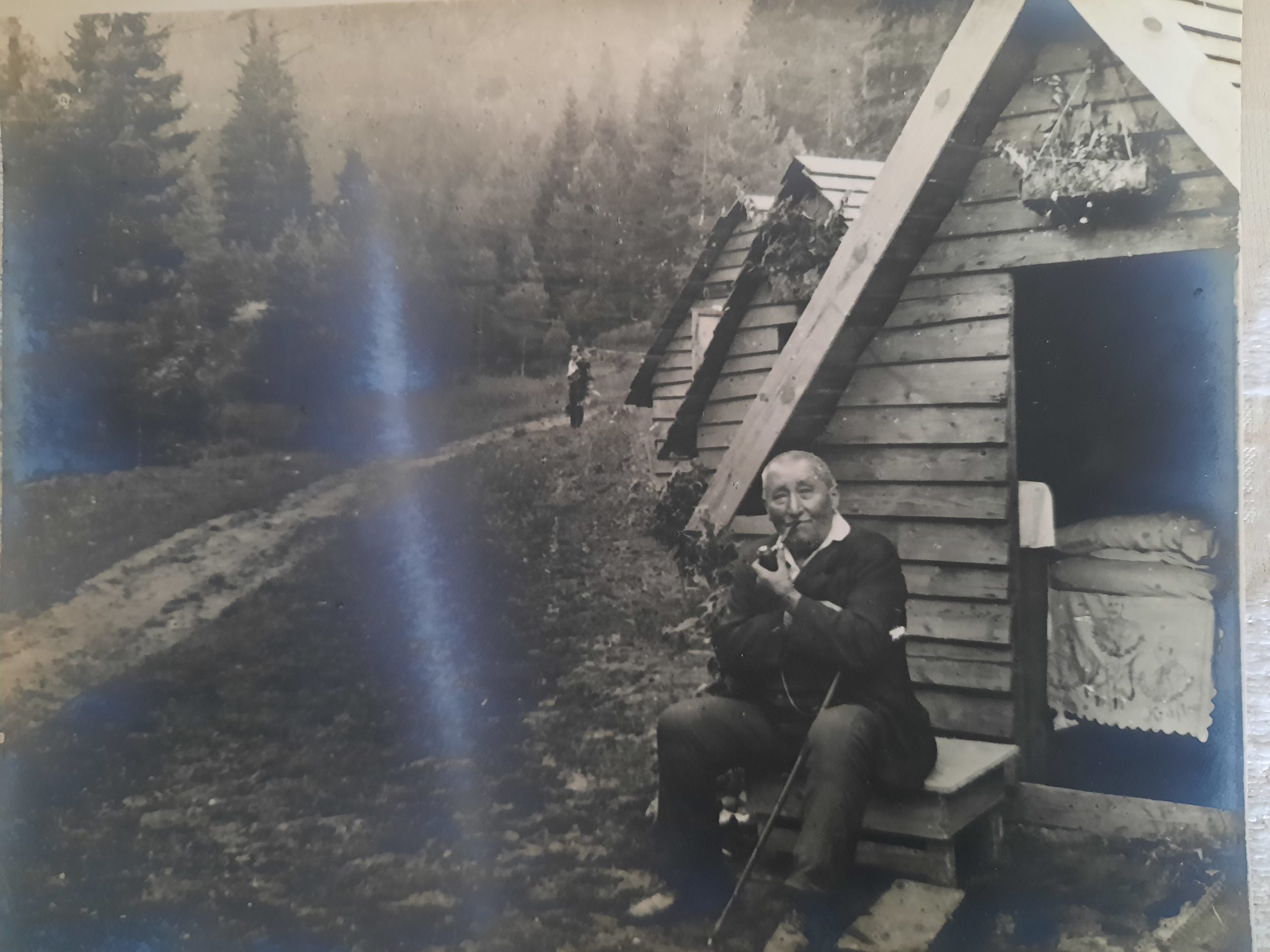
A post card from Poland which Toni kept
On 5 September the train transporting Toni and the other Wehrmacht soldiers of the “2nd Sappers’ Battalion” from France to Poland stopped in Tarnow, the weather was good and the journey wonderful, Toni wrote. On 6 September 1940 Toni arrived at Sanok, the first destination of his battalion in Poland.
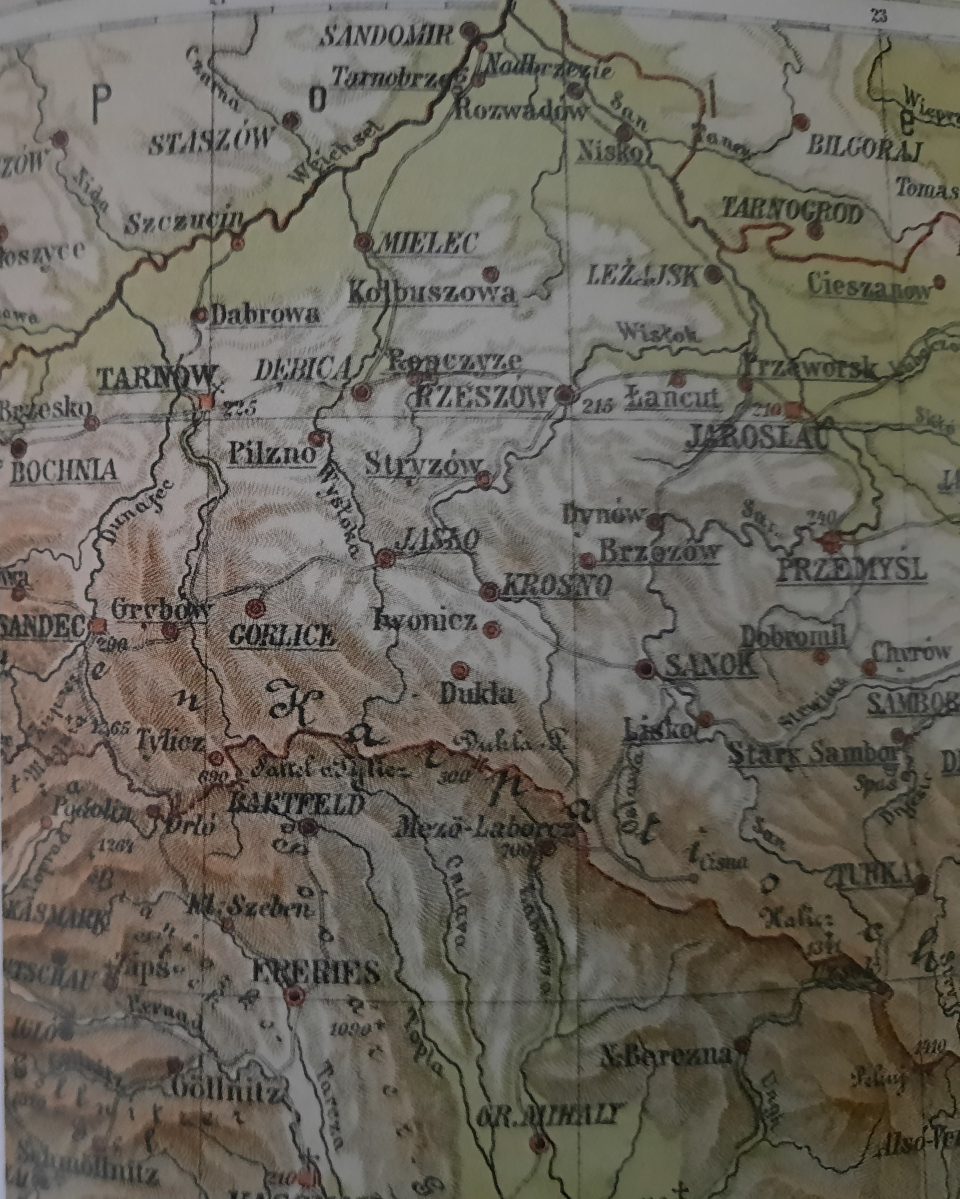
Map of the region as part of the Habsburg Empire’s crown land Galicia, showing Tarnow and Sanok
The Polish cities Sanok and Tarnow had been part of the Habsburg Empire’s province of Galicia after the first partition of Poland in 1772 until the end of World War I. In the course of the German assault on Poland Sanok was occupied by the Germans and was integrated into the so-called “Generalgouvernement”, just as Tarnow. Sanok was a frontier town between the German-occupied and the Soviet-occupied parts of Poland until the German attack on the Soviet Union and in 1940 the Polish underground movement established itself there. The population structure of the whole region was characterised be a large number of different minorities, such as Jews, Ukrainians, Lemkins, Boykins and Germans, several of which were forced to collaborate with the Nazis or did so voluntarily in the “Waffen-SS-Division Galicia”.
Tarnow had been one of the most important merchant towns in the Habsburg Empire. When the German Wehrmacht occupied Tarnow on 8 September 1939, many of the 25,000 Jewish inhabitants tried to flee eastwards, but on the other hand many Jewish refugees ended up in Tarnow who had been trying to escape the Nazis from occupied territories further west. It can be assumed that in 1942 30,000 Jews lived in Tarnow. But the German occupiers also harassed the Christian Poles. In June 1940 the first transport of Christian Polish prisoners to the KZ Auschwitz was organised by the GESTAPO; of these 728 prisoners only 200 survived. For the Jews the Nazis established a ghetto in Tarnow where they interned between 20,000 and 40,000 Polish Jews, who were exploited as slave labourers, most of which were finally deported to the extermination camps Belzec or Auschwitz –Birkenau and murdered there. The establishment of the Tarnow Ghetto was formally announced in March 1941. The final liquidation by the Nazis took place in August and September 1943 and in January 1945 the Soviets ended the Nazi occupation of Tarnow.
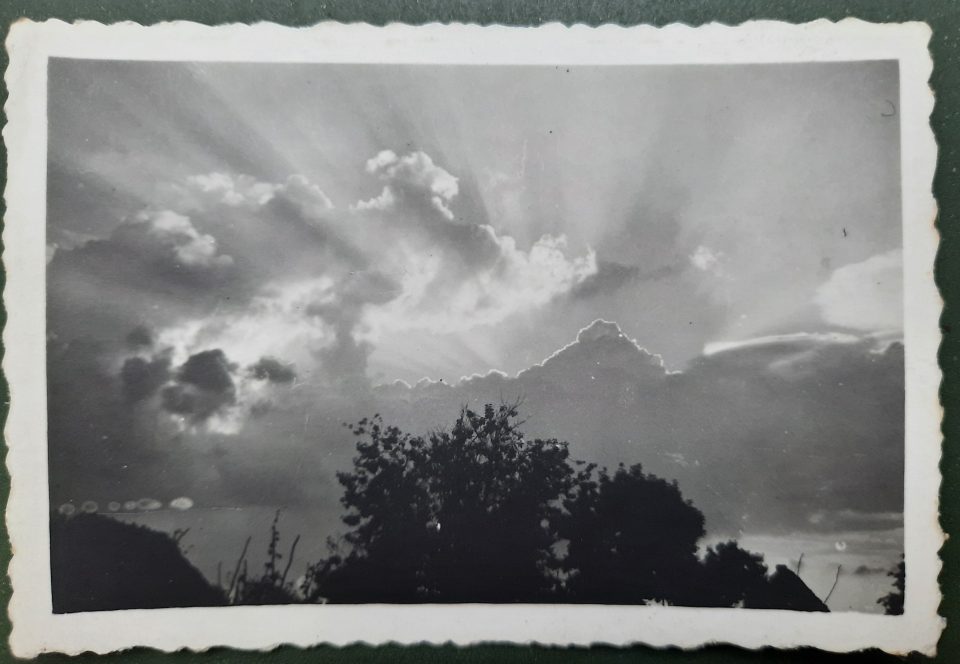
A photo Toni took of a sunset in Zamosc, Poland, in February 1941. In this town more than 10,000 Jews lived and the German occupiers set up a ghetto there as well and started deporting the Jews to Belzek in April 1942 until the final liquidation of the ghetto in October 1942
THE MILITARY CAMPAIGN
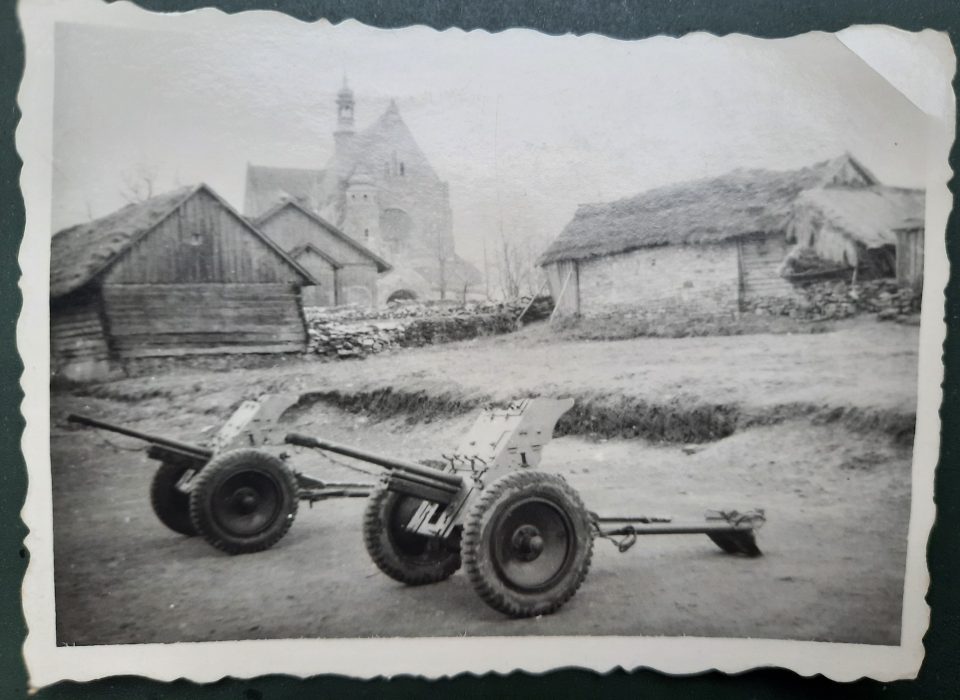
Toni took a photo of a German PAK (Panzerabwehrkanone)
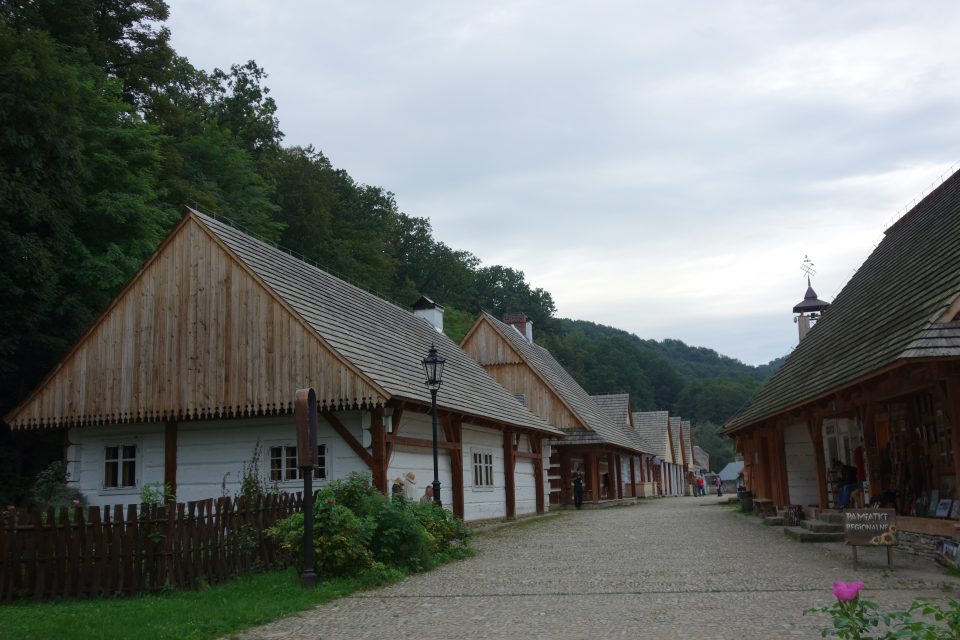
Sanok
On 6 September 1940 Toni wrote to his beloved wife Lola that they were stuck in Sanok and waiting for the next transport. They were supposed to end up somewhere 40 km from Sanok in a godforsaken village. He was really desperate because this was a totally deserted area. They had just been on the banks of the river San and had looked towards Russia, which was approximately 300 km away. He thought it would be possible to purchase some things in Sanok, but everything was five to ten times more expensive than in France: 0.5 l of beer or 100 g sausage 50 Pf (Pfenninge) and a small piece of cake 30-40 Pf. Then Toni described in his letter the journey from France to Sanok, which he had enjoyed very much as there was good weather all the time: On 2 September they left Remiremont at 10.30 am and went via Luneville to Saarburg and Saargemünd, where they stayed overnight. There was an air raid at night and they could hear and see the attacks of the enemy airplanes and the responding German defence, but he had slept well in the hay on the open train carriage nevertheless. Then they were transported to Homburg – Ludwigshafen – Worms – Frankfurt – Hanau – Fulda – Hersfeld – Ronshausen – Eisenach, where he admired the many flowers, – Gotha – Erfurt – Leipzig, where they arrived on 3 September at 9 am, then to Dahlen – Riesa – Dresden – Bautzen – Greiffenberg – Hirschberg, where they crossed the “Riesengebirge”, a wonderful mountain landscape, – Gottesberg – Dittersbach, where ten furnaces were working at full capacity which turned the sky red from the glowing coal. The train then carried them to Königszelt – Breslau – Oppeln – Ratibor – Oderberg – Chybie – Auschwitz – Skawina- Krakau – Bochnia – Tarnow – Stroze Biecz – Jaslo – Sanok, where they arrived on 5 September at midnight. “You can see it was a journey across half of Europe. I would rather do without it and go home. Our kitchen was on an open carriage. So we had a good view, but also lots of wind, dirt and sun. We are dark as Negroes and dirty as pigs. Just imagine five days in the uniform without the possibility to wash properly or change clothes and very little sleep. We look like gipsies ….Today I don’t care at all: no money, nothing to smoke, nothing to drink, in one word a complete f….. I don’t need anything, just please send me writing paper, a pencil and razor blades.” The only certainty for Toni at that moment was that he would stay in the kitchen, which for him was the best option for the time being.
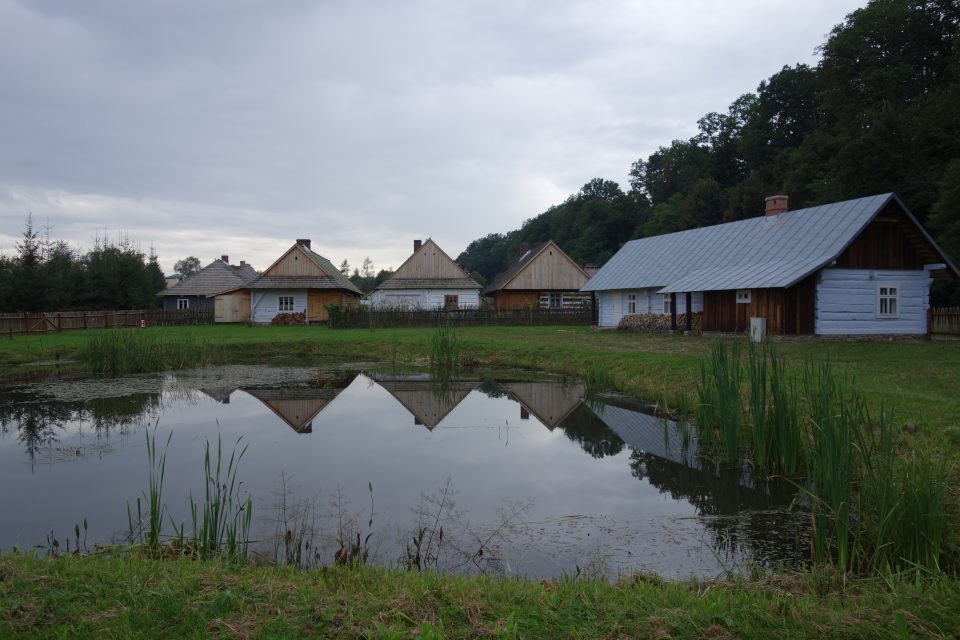
Sanok
On 8 September Toni reported that the place in which they had finally ended up was by far not as bad as he had expected. At the first village where they should have settled down, their sergeant could not find any place to stay. So they had to turn round with their kitchen after 10 km and they had to sleep in the train station. The next day they travelled 43 km north and then further 8 km before they reached Dynow on the river San. There they lodged in a small village called Notrocza, which was not to be found on any map. The kitchen staff had a nice room for six and opposite there was a nice castle which would be used as the head quarter of the corps. The castle was very derelict, so they had to put in a floor first. The baroness was from Graz (in Austria) and very nice, but the people were extremely poor because all their possessions were located across the river San and this territory was at that time occupied by the Soviet Union. “The people here are really friendly – totally different from what we were told – very hardworking and poor. Unfortunately there are just fields and fields and fields, even when the ground is steep, and nothing else. There is just one inn! One can buy beer here, but I haven’t tasted it yet. Tonight Hauser, Häusler, Kastel, Daun and me had dinner. First we bought eggs from different farmers until we had 24, then we bought 200 g butter, bread and 2 l of milk. At one of the farmer’s I made scrambled eggs for all, which was quite ok, but it cost us 3.50 RM (Reichsmark) or 7 zloty – in France we wouldn’t even have paid 1 RM. Also cigarettes are extremely expensive; the cheapest are 3 Pf and are finished after four to five puffs…. There is nothing to buy here, on the contrary, when the people hear that we were coming from France, they want to purchase our stuff at all costs: a comrade bought two suits for 26 RM in France and I saw that someone offered him 600 zloty for them.”
The forces’ postal service was not working yet in the region, but Toni hoped that he would receive a letter from Lola the next day, which would be the first after a week without mail. He had heard it through the grapevine that they might be able to go on furlough within two weeks and he told Lola that she could not image how much he was looking forward to coming home and being with her. But he could not tell her exactly when he would come because only on the evening before their departure those soldiers were named who were entitled to go on home leave. Anyway, he would try to get some food for her, such as eggs or a chicken. It was difficult to communicate with the people because they knew very little German and Toni said that now it would be an asset if he could speak at least a little Czech (His mother-in-law, Ritschi, was a German-speaker from Moravia, who knew Czech and Lola could communicate a little, but the family had moved to Kaiser Ebersdorf near Vienna when she was two). He numbered his letters and the pages, so that Lola could check whether she received all his mail because he had heard that in Poland the mail was unreliable and censured.
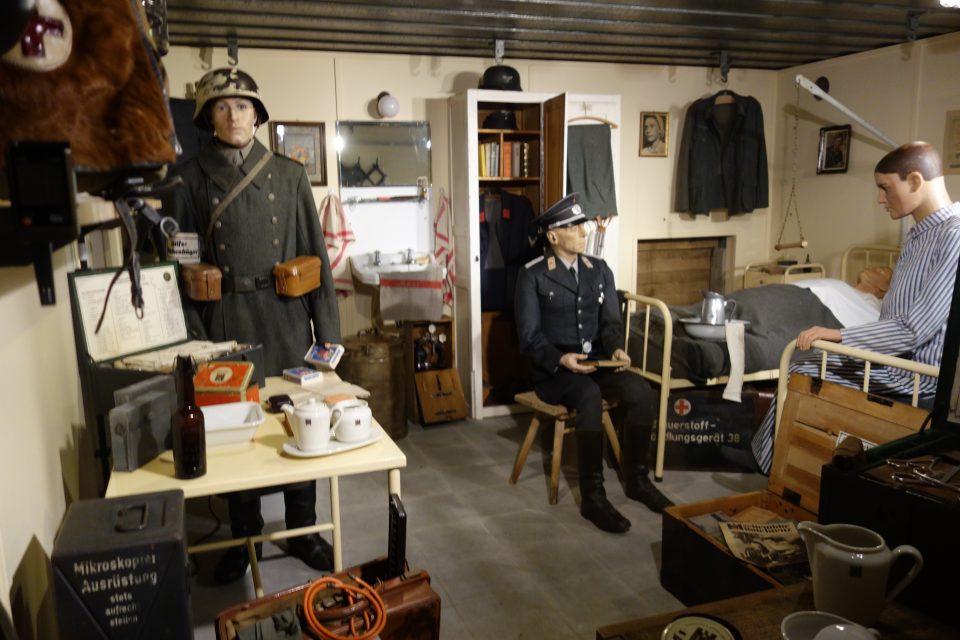
German military hospital unit
On 12 September he wrote that he had been transferred to the military hospital in Dynow against his will because of angina. Lola should not worry as he often suffered from this illness and he seemed to have caught a cold on the journey in the open carriage. When you really needed the doctors, they did not care and when you did not want to be treated, they dispatched you to the hospital, he complained. The doctor had applied some tincture against tonsillitis and the next day he would bring some sage to gargle with. He hoped he would be back in his kitchen soon, but at the moment he was just smoking and reading the papers, but no post had arrived yet. The other three soldiers in the hospital room were nice guys; one of them had received a parcel and had given each of them a packet of cigarettes. He would not stay longer than 2-3 days, he vowed. Toni was especially disappointed because there was a border check point where they were quartered and he had been given a partridge and the leg of a rabbit by one of the border patrol which he would have liked to cook for dinner. The day before, they had bought a barrel of beer and he had broached it. But as they did not have the appropriate equipment, they were all drenched. The weather was dreary and damp and it was getting cold, too. They had had to move the kitchen, otherwise they would have drowned in the mud. The day before they had received their pay, which was 20 zloty Polish currency (“Frontgeld”, army currency, was not valid in Poland).
On 10 September Toni wrote that for 10 days he had not had any letter from Lola and he desperately hoped for many letters soon. He was sitting in the kitchen, which actually was the garden in front of the horse and cattle stable, where they had set up the kitchen equipment. Until 5 pm when coffee would be served he had time to write, “There are no news, but what news could there be in this country. I always say we are visiting the devil’s mother-in-law here.” The food was ok; smoked meat the day before and tonight sardines in oil, but Toni would save them for Lola and eat some scrambled eggs instead. You could get as many eggs as you wanted from the farmers there, if you exchanged them for tobacco. Toni told Lola that he was already heavily indebted to one of his officers, sergeant Sündermann – “a really nice guy” –, and his pay had not arrived yet, just as the mail, but “debts don’t hurt!” The day before, Toni had had “a nice job”: one of the sergeants, who would take one of his letters to Vienna, had bought a goose for himself, but it was delivered alive and Toni helped him in extremis. He slaughtered and plucked it and the sergeant took a photo of him in action. At the moment the whole corps was discussing how to build a kitchen because as soon as the rains set in, they would be in deep trouble. But fortunately they still had sunshine, because as soon as it rained there would be mud everywhere. “You know, my dearest, with you I would even endure this place, but with you alone!” Working in the kitchen had the advantage that you did not have to abide with “all the nonsense” (drills and roll calls). All the others had to go through the drills every morning because there was nothing else to do. But on the other hand you had something to do the whole day when you were on the kitchen staff. He was yearning for Lola and Herta and he had heard through the grapevine that by the end of October, at the latest, they would be transferred back to Vienna, but you could never believe the rumours. “At some time this whole nonsense must be over! If only the war with England would be over, then the end might be nearer!” (Unfortunately Toni could not know that that was just the beginning.)
While Toni was being treated in the military hospital for angina, they brought in a soldier from the 4th division with a smashed in head, “one from each of the five divisions”. The food was now served from the 3rd division, which was “complete rubbish – I am not used to that in the 2nd division! I will be leaving soon from here!” They had been served “Wehrmacht soup” (“brrr!!”), rotten rice with compote and potato mash with tins and tea with nothing, but “fortunately we still have schnapps from France!” The next day he wrote that he had been sick from the food and that the doctor had promised to release him from duty for the time being. “If we don’t leave this damned Poland soon, we’ll all be sick”. On 15 September he was back with his 2nd division. He said he had fled the hospital and was glad that so much mail had been waiting for him from Lola, his sister Milly, his cousin Luisi and his friend Turl, who was such a good friend because he would repair the stove for Lola, and a parcel with cigarettes. In the afternoon at 4 pm they had had a “grand theatre performance”: rather primitive, but with respect to the circumstances quite nice: a magician, a small boy who performed as a contortionist and a hypnotising act; so the one and a half hours passed quickly. The weather was bad and he was sitting in the castle and waiting for the radio report. The castle was quite nice compared to the rest of the region: parquet floors everywhere, electric lights and three-metre high tiled stoves. Lola did not need to worry, the situation was not insecure here and the people were nice. There was no need to send him money, just cigarettes! There was nothing to buy and he did not want to go drinking, so he needed no money. On the contrary, the local population wanted to buy things from them! Lola should not send him any sweets any more, but give them to Herta, because here they could get some sweets every second day.
On 16 September Toni wrote from Nozdrzec that he hoped he would be able to go home for eight days soon. He was worried that he still had not received all letters and parcels which had been sent to him to France and he was not sure whether Lola had not sent him some money to France, too. He was hoping to bring her a goose, which he had already ordered, and some eggs to be pickled. He wanted to buy so much for them, but this was not easy because he was stationed at a customs frontier. Wednesday they had received a bar of chocolate which he had kept for Herta, and sardines for Lola. He would like to have at least some presents for them when he came home. Unfortunately he did not know when he would arrive in Vienna; he would just surprise them in the morning. In a letter Toni’s comrade from France, Peter Fiktorovits, wrote on 22 September that he was not allowed furlough and that also he had had to leave Lorraine and had been transferred to the “Reich” into a very dreary area. He was now serving in the High Command.
Krakow: historical Jewish quarter
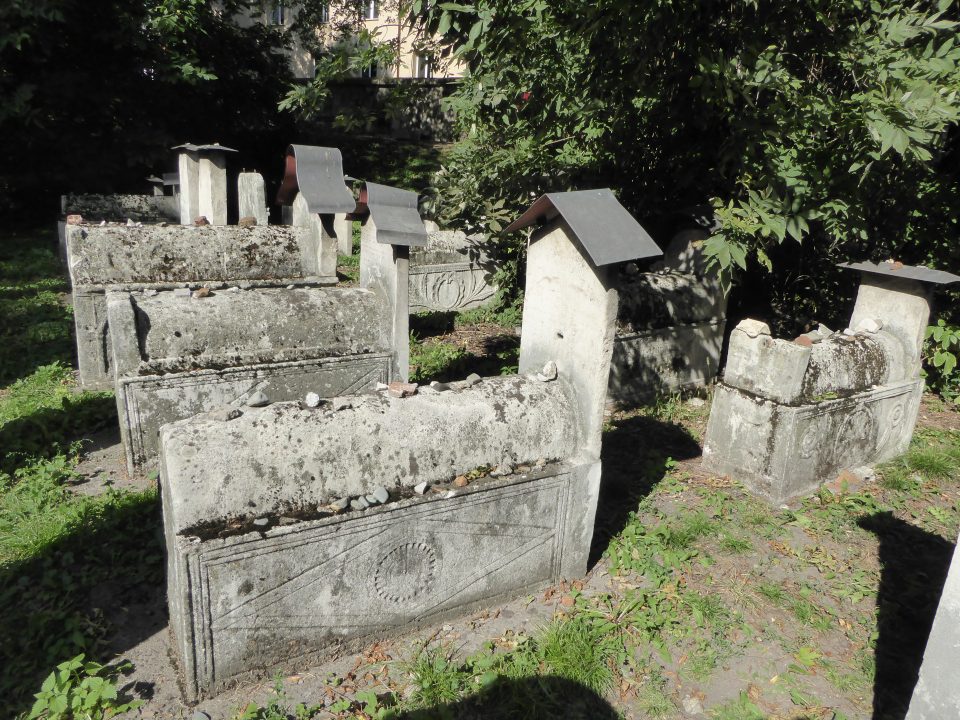
Krakow: old Jewish cemetery
On 12 October Toni wrote the first letter to Lola after his return from furlough in Vienna, “Now I’m back in the Promised Land”. The journey had been ok and they had arrived in Krakow at 8.30. He had slept quite well in the corridor, not in the compartment on two newspaper pages and from Krakow they left half an hour later and managed to get a comfortable seat. They spent the time eating and sleeping. They arrived in Przeworsk at 14.05 and had to wait until 19.00 for the next train. They went to an inn and he had half a litre of beer and some brawn with onions for 1 RM. At 20.30 they arrived in Dynow and walked 6 km on foot in one hour to their barracks. At night he froze because it was already extremely cold and his luggage only arrived the next day at lunchtime. Toni reported that now a new chef was working in the kitchen, an arrogant fanatic, “nothing for me!” So he told his sergeant that he wanted to return to his corps and he was immediately transferred. They were lucky because they had just received proper beds and he furthermore asked Lola if she could procure a very small Polish-German dictionary for him because he wanted to be able to communicate a little with the local people. He wanted to sell the shoes he had brought from home and hoped he would get around 20 RM for them. He would then send the money to Lola so that she could purchase the hair trimmer he had seen in Vienna and send it to him. He had enjoyed the “Wiener Schnitzel” (Viennese speciality) she had packed for him and now he still had her “Grammeln” (greaves). He was thinking of her a lot and even kept talking to her in his letters. Had she got used to sleeping alone again? He was numbering all pages of his letters to Lola now and she should do the same, so that they could check whether all letters arrived complete. (It seems Toni suspected that the letters were censured and pages “disappeared”)
On Sunday Toni and his friend Pauli had been bartering the clothing and shoes they had brought from Vienna in the village and he asked Lola to send some more, for example his old grey jacket because he could get lard for it. Furthermore he could do with some old shaving razors if Ignaz (his father–in-law) had some. If Lola had some woollen jumpers or vests or a winter dress she did not wear any longer – but nothing shabby, she should wrap all that up because in Poland he could barter or sell them; also his shirts. She should give the parcel to his comrade Kastel who would leave Vienna on Saturday and take the clothes to Toni. Then Toni described such a bartering scene: they had gone to a farmer with all the stuff and within quarter of an hour the whole sitting room was full of people. All neighbours were present and then the fitting and the haggling started. Pauli had a suit of his grandfather with him, totally old-fashioned with very short and wide trouser legs. “We did not understand them and they did not understand us, but all were talking at the same time. For the summer suit I got 35 zloty, for the trousers 15 zloty, not bad?! For the Knickerbocker suit they wanted to give me 32 zloty, but I insisted on 34. Maybe tomorrow I can sell it for 40 zloty. The greatest show came next: Pauli had a torn black dress, a blue skirt with holes and a very wide black skirt in the folk style of the times of our great-grandmothers. The people were so enthusiastic and he got 65 zloty for all that! What do you say? Afterwards the people served bread, butter and vodka. As soon as I have received all our stuff, you can also send me the underskirts of my mother, which are worthless, but I could sell them here.” He said he would keep the money until someone of his comrades came to Vienna and he would then bring her the money, so that she could have a winter coat made for her and he could buy new trousers in Vienna. As soon as he had sold everything she could send him his grey trousers as well. Someone even wanted to buy his blanket, but that had to wait.
Toni reported that his and Paul’s duty was to roll out barbed wire and in the afternoon Karl Häusler helped them. For dinner they had a tin of herring which he would keep for Lola and Herta. Afterwards they went to the farmers again to sell clothes and then they both went to the farmer they had befriended and Toni made some scrambled eggs for them there. The farmer again urged Toni to give him his blanket, so Toni fetched it from the barracks. He liked it very much and wanted to give Toni 40 zloty, but Toni would not sell it under 50 zloty. He left the blanket with the farmer and wrote that the farmer would now ponder the whole night, but the next day he would surely get his 50 zloty. The people urged him to bring walking boots and shirts, so Toni asked Lola to send what she could find as soon as possible, but things in good condition, Toni stressed. The next day they would have the afternoon off because in the evening they were going to the theatre in Dynow and Toni was very curious what kind of childish show they would be presented with this time. The next day he wrote that the show had been cancelled, but he and Pauli had walked the 7 km to Dynow nevertheless and went to an inn, where they spent quite a lot of money on 150 g sausage and 2 pints of beer each and 9 schnapps in the next inn. He wrote he was a bit tipsy, but not drunk, “What else can you do here; you just get stupefied!” For dinner they had cheese in tins and jam, which he would not eat, so he and Pauli ate the remaining of “Grammeln” Lola had made. Afterwards they returned to the farmer who tricked him into selling him the blanket for 45 zloty and half a litre of Polish vodka, which they called “Wutky”. But Toni was satisfied because he had got all in all 200 zloty for the clothes and shoes, which was around 100 RM. That day the army had finally banned the selling of stuff to the local population, but Toni wrote to Lola, “Just send me the clothes and shoes. In the evening it is dark, so nobody sees anything. You just shouldn’t talk about it.” They had electric light in the barracks, but it was interrupted often and not very bright, so it was difficult to write litters, above all because there was so much noise with all the comrades playing card games. That’s why he needed a torch, the batteries for which he had already acquired. The forces’ postal service in Poland was abysmal and the parcels did not arrive at all or very late. So Toni urged his wife to complain in Vienna about the service and kick up a fuss in his name. He hoped that if she not only wrote his name and forces’ postal service number 17525, but added “via Krakow II Dynow”, the mail would finally arrive. Toni did not only write to his wife daily, but also to his sister and friends. Some evenings he wrote up to six letters and he already lacked writing paper and envelops, which Lola should send him. He was extremely worried and desperate when he did not receive a letter from Lola for a week or more because of the precarious situation Lola and Herta were in at home. He always sent his regards to his parents-in-law (“the oldies”, Ignaz and Ritschi). Whenever possible, he gave his letters to those comrades who were going home to Vienna. He also filed a complaint via his superior about the unacceptable handling of the mail in their region.
In October it was already very cold and in the morning everything was white, covered in frost, but during the day it got sunny when they were rolling out the barbed wire. Toni was worried that they might have to spend the winter in this godforsaken place. But there were new rumours that they would be transferred to the riflemen division, so that they could return to Austria. He wished for a stationing in the vicinity of Vienna in order to be able to visit Lola every one or two weeks. On 17 October Toni told Lola that he was not missing the kitchen duty. He was happy “walking around in the fresh air”, except that it was already very cold and a strong north wind was blowing. He had found a way to communicate with the local farmers, as the brother of one spoke quite good French. He was already on good terms with the indigenous population, just as in France. He had bought eggs and fresh milk from one of the farmers and had cooked for himself and Pauli a nice dinner. For Sunday he was planning to do “Backhendl” (a Viennese speciality: pieces of chicken rolled in flour, egg and bread crumbs and fried) for the two of them. His friend Pauli had become father and they had been celebrating in Dynow the new baby with Polish vodka, so they were already quite drunk, Toni wrote on 20 October. Pauli would be going to Vienna the next day and he would bring Lola 30 eggs, half a kilo of lard and the tins of fish and cheese Toni had saved for her. He hoped that this would help Lola put some food on the table. He urged her to send more clothes, shirts, suspenders, everything she could find, but she should not mention it to anyone. He could sell all this stuff in Poland and by that assist her in raising some money. In the morning he had been at the farmer’s with Pauli and they were invited for lunch. They were served “Pirogy”, a special national dish, which Toni adored. He immediately sent Lola the recipe, “You cut and roast fresh cabbage and onions, mix it with curd cheese, salt and pepper and prepare a dough for strudel, form little turnovers and fill them, cook them in salty water and serve them with brown butter.” Toni decided that the excessive drinking had to end because it was too expensive and also had a bad effect on his health. He had received his pay and complained that a “voluntary” donation of 2 zloty was automatically deducted. They now had to carry wood up the mountain nearby to build a wooden shelter there. It was already very cold in the morning and all the meadows were white with frost.
On 27 October winter had set in in the region; everything was white outside and it snowed thick flakes. They day before they had opened the “Soldateneheim” (soldiers’ home) in Dynow and Toni had a personal invitation from his sergeant, but he did not go there because he preferred to read Lola’s letter which had just arrived. The others reported that the performances were funny and the food good. He was sending her some photos, which she should keep for him because he planned to make an album when he came home. For the next day they had ordered “Backhendl” at a farmer’s and they were looking forward to this festive meal. He had had already some beers, when he was writing the letter, but he stressed that some alcohol was necessary to be able to stand this “charade”.
Toni had to be operated on his foot and before his operation Toni reported that Fritz Lang had again accompanied him to Rzeszow to a collection point for the sick because the military hospitals were too crowded. They had had a nice dinner at a farmer’s: Chicken simmered in butter with potatoes and a sort of horse radish sauce. It was excellent and he had eaten half the chicken! Fritz and he had rambled through the streets of Rzeszow, which ”… is very dirty. The shops are mostly grubby. It is interesting that the population consists of two thirds Jews, which can be seen on the armbands and at the shop fronts. Here you can see the true Kaftan Jews, extremely dirty. They have to clean the streets and that’s what they look like. I prefer the little village we are in because the people are much nicer there.”(Approximately a year later in December 1941 the Nazis established a ghetto in Rzeszow, from which around 22,000 Jews were deported to the KZ Belzec and mass executions of Jews took place in a forest near Rzeszow.) They had diagnosed his problem on the ankle a “ganglion”. After his operation in the military hospital Toni wrote on 28 October that there had been many operations on that day and he had to wait a long time on the operating table and watch another soldier being plastered “from the belly to the tips of his hair – like an iron virgin”. Then the surgeon cut a piece of his foot and closed the wound with 10 stitches and applied a loose plaster. He would have to remain in the collection point for ten days. He asked Lola to send his greetings to everyone because it was rather difficult for him to write more letters in bed.
On 30 October Toni was already much better. He described that he was lying in the gymnasium of a former Jewish school in Rzeszow, where the army had put up 23 beds and people were coming and going like in a beehive. The building was very grand, like a theatre with fabulous lighting, although only a third of the lamps were on. The only nasty thing was that he could not walk, only hop on one leg like a stork. He would have liked to have crutches, but they could not be procured; later on his friends presented him with a walking stick. So a comrade had to bring him the meals otherwise he would have to starve. Some parts of the building were well heated except the dormitory which was important because outside it was already winter. “Luckily in the bed next to mine there is a Viennese who is very nice. I have always said that you should not be sick in the army!… Some say that after a hospital stay you can be transferred back to the “Ersatztruppe” (reserve troops). It would be ok if the corps was ok, but if they were all veterans, I would not like that… Here time does not pass by – I still have to wait five more days until I receive post from you.” On 31 October he wrote that Lola was such a good nurse because his sister Milly had written to him how wonderfully Lola had cared for her during her sickness, “Why can’t you be with me. I would be running around within a few days! I tell you, you should taste the food here. Yesterday we were again offered an undefinable stew of lentils, carrots, potatoes and tinned meat without fat or spices and today very little cooked bacon and spinach?? – boiled leaves, chewy as straw and potatoes -everything without fat or spices. It is supposed to be a favourite dish of Hamburgers. I think at home not even the pigs would eat that… If I could just walk again because then I could buy something in an inn! There is still snow everywhere and it is extremely cold.” Toni was hoping to be allowed special leave after his stay in hospital, “If only the f…. war was over, then I could be with you again all the time!” 1 November was a holiday which meant there was no early wake-up call and the food was acceptable; a kind of undefinable onion-meat stew with little meat, but edible. On 2 November he was already much better and could walk around. He had helped in the kitchen with peeling potatoes, but he was looking forward to his first “outing” to the nearby inn to buy himself some beer and some tasty dinner. There was a cinema in Rzeszow; so maybe he would go there if he could still get tickets. Finally they had put a stove in the dormitory, “These are my news; you really become humble in this club!” In the cinema he saw “Erin Robinson”, which was not much, a typical political propaganda film “pour la mérite of the marines”. The only beautiful aspect was the nature scenes. In town he was able to purchase some cheap novels for 25 Pf., because he had nothing to read any more. The weather was very bad, cold and rainy and there was nothing to do, it was so dreary in this place. So he read from 8 am to 9 pm., which was getting boring, too. Otherwise they were just waiting for ”the feeding like zoo animals”. He had already saved four tins of fish for Lola and he was worried whether they had enough to eat in Vienna and whether they were not freezing in the flat. In his daily letters to Lola he would like to write more and he would also like to write to his friends and relatives “but in this deserted place there is nothing to write about”. On 3 November they had for once a nice lunch of roast veal with potatoes and vanilla pudding with chocolate sauce and in the evening he went for a beer to the “Restaurant Lemberg”, where they had music. Otherwise there was nothing enjoyable because for more than a week he had not received his mail. In fact he went out rarely, first of all because it cost too much money and secondly because there was so much mud everywhere.
Toni assumed that he would not be entitled to get some rehab furlough soon, maybe within two or three weeks, because his stay in the military hospital had been rather short. So he asked Lola to contact his boss Hofbauer and urge him to ask for Toni to be transferred to Vienna to work in the fish shop because for the fish monger this was the high season. He was sure that Hofbauer could get the permission so that he could finally go home or stay in Vienna for some time at least. There were others in Vienna, like Leitinger, who was drafted later than Toni and was already back home. The food was getting better, but it was mostly potatoes, “seems to be the staple food of the Piefkes (Germans)”. Toni was sure that some of her letters were missing and when he was back at the division he would look into this matter and complain.
On 10 November Toni described his “first nice evening in Poland” to Lola: He was still in Rzeszow in the sickness ward, yet was already assisting in the canteen preparing spinach. The whole effort resulted in one of the terrible German stews called “Hamburger Allerlei” consisting of small pieces of pork, lentils, beans, carrots, potatoes, cauliflower and several unidentifiable ingredients, “You can imagine the taste!” But in the afternoon he went to town with the Viennese comrade, Kosmak, from the district Währing, like Toni himself, and they saw an advertisement in an inn “Concert tonight”, which would have been a nice distraction after all that “Hamburger Allerlei”. So after dinner (lard and a tin of sardines, which he kept for Lola) they went to town, full of distrust. Yet the first nice surprise was that the tickets were rather cheap and the venue really luxurious with boxes on the sides which were reserved for soldiers of the Wehrmacht. They rather self-consciously took seats in one of the boxes, when an expert waiter asked them in German what he could bring them. They ordered beer and goulash, which was excellent. Then the concert started: a piano, a cello, an accordion and a violin. “The musicians seemed a bit shy, like us. May be it was their first performance. But it was really nice; they played Viennese songs, waltzes of Strauss and modern music in between. Sometimes it was not harmonious, but after about ten bars you could hear what they wanted to play. Sometimes we had to laugh because especially the female accordionist and the pianist got into conflict. But meanwhile we are very humble with respect to our tastes and so it was a really nice evening. We had to leave at a quarter past eight because we had to be at the ward at nine. It wasn’t too expensive as well (beer 1 zloty, goulash 2 zloty), so we’ll return tomorrow and the Viennese comrade is really nice company. Unfortunately for half an hour we had to endure a disgusting spectacle. Three Piefkes, obviously Berliners, felt they had to perform, too. They played the piano, approximately like Herta, and their singing was abysmal. But the three guys enjoyed their performance so much that they did not want to stop, especially the song “Wannsee” was continuously repeated. I could not contain myself and said loudly that it would be best if they stopped now. I cannot hang back; I’m so ashamed of such idiots, especially in uniform.” Toni did not enjoy the concert the next evening because there was such a lot of turmoil, which he could not support. When Kaltenberger and Ebner visited him, they went for some beers and to the cinema in Rzeszow, which “was only 25 Pf, but it wasn’t worth more, “Scandal about a Cock”. A totally stupid comedy, but sometimes you could at least laugh.” Then they went to the new “Soldatenheim” (soldiers’ home), where beer and food (sausage with potato salad) was a little cheaper. Toni sent Lola the menu of this soldiers’ home so that she could see what the “Piefkes” ate.
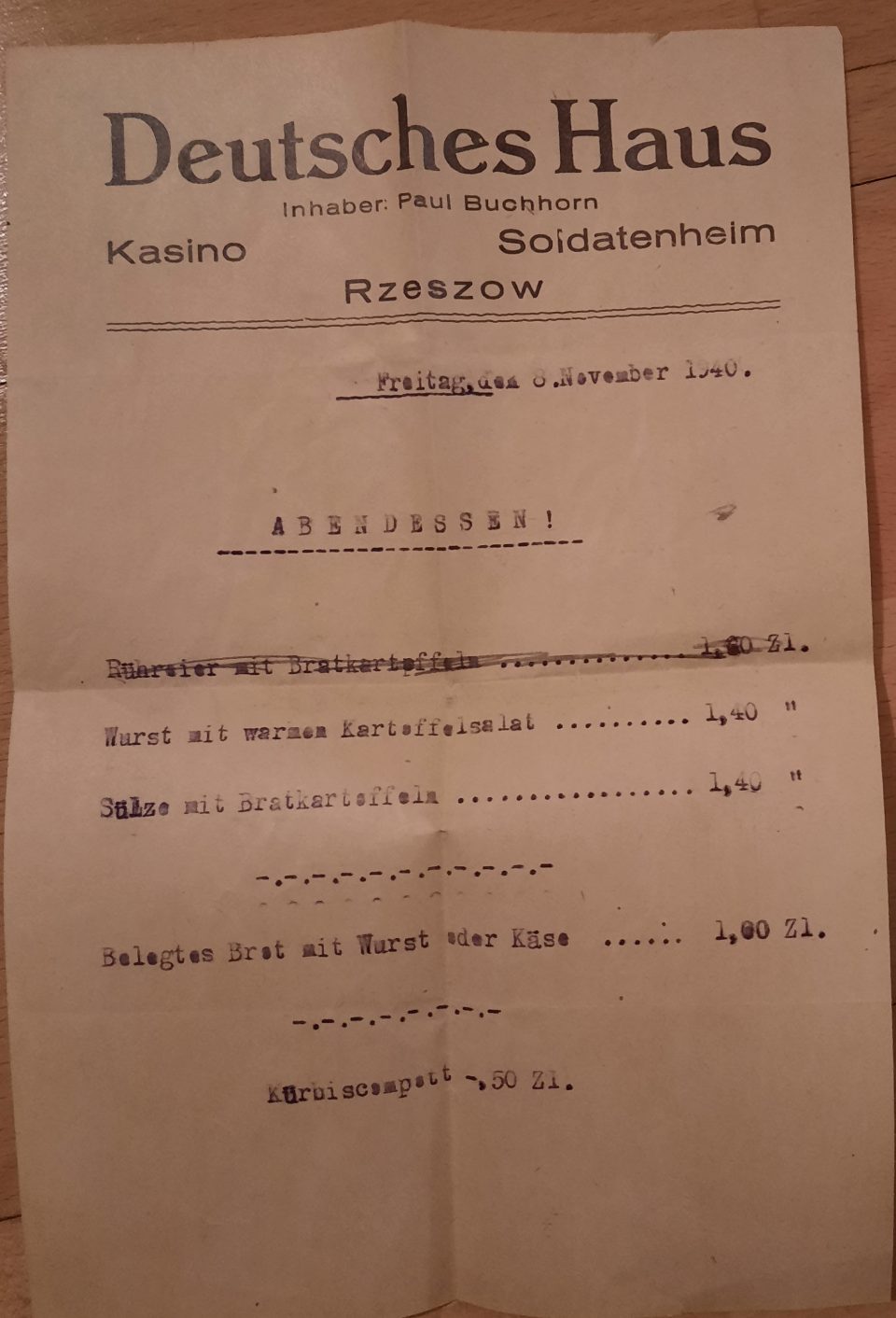
The menu of the soldiers’ home in Rzeszow: scrambled eggs with roast potatoes, sausage with potato salad, brawn with roast potatoes, sandwich with sausage and cheese and pumpkin compote
While strolling through Rzeszow Toni did some window shopping and was shocked about the prices: a tin of sardines 8 sloty (= 4 RM), a tin of herrings 6 zloty, slippers for Lola 30 zloty, leather boots for Lola 300 zloty. “I cannot imagine how the people here can afford anything! A cleaner works here for 10 hours and then earns 5 zloty a day, from which the health insurance is deducted, so approximately 2 RM remain.”
Toni was passing the time in Rzeszow with reading – he bought books at the train station -, riddles and walking around in town, but that was boring because you could only always stroll along the same streets as there was too much mud. The weather was better now, but there was always frost at night. Furthermore he now had the chance to have his health checked, especially his heart and lungs, in the military hospital. “If they find something, it’s good to know.” They had him X-rayed at the hospital and found some calcification at the heart, but everything else was ok, so Toni was dismissed on 13 November and returned to his division on indoor duty. Toni was happy to be back with his comrades and most of all, he now received the letters from Lola, Herta and his friends and relatives as soon as they arrived and especially the parcels with his favourite cigarettes “Drama”. For Toni it was a tragedy that it was so very difficult to get cigarettes in Poland and the ones he was being sent from Vienna always arrived late.
His tasks in the division were now easy jobs such as stapling firewood because he still could not wear his boots. Sometimes he went round in the village with his friend, the paramedic Fritz, who attended to the famers and there Toni saw under which deprived conditions those people had to live. They were all very friendly and paid Fritz with vodka. The soldiers were once in a while transported by car from Nozdrec to the bath in Dynow, which was the only chance to get a proper wash. Another distraction was football. On 17 November their division beat the 5th division of “Marmeladinger” (Germans) 5:2. The fanatic Baumgartner was there as a spectator, but was ignored by everybody, Toni wrote. On 18 November Toni received a parcel: Lola had sent him “Buchteln”, a Viennese sweet dish which was her speciality (see the article on “Viennese Sub-urban Coffee Houses”), which he loved, but most importantly cigarettes, which were so scarce! Lola soon afterwards sent him a cake, which he wrote was excellent. He sent his best birthday greetings to Herta (see below) and told her to think about a present she would like to have and which he would buy her as soon as he was home. It was such a pity, that he could not celebrate Herta’s 7th birthday with them, but he would be with them in his thoughts.
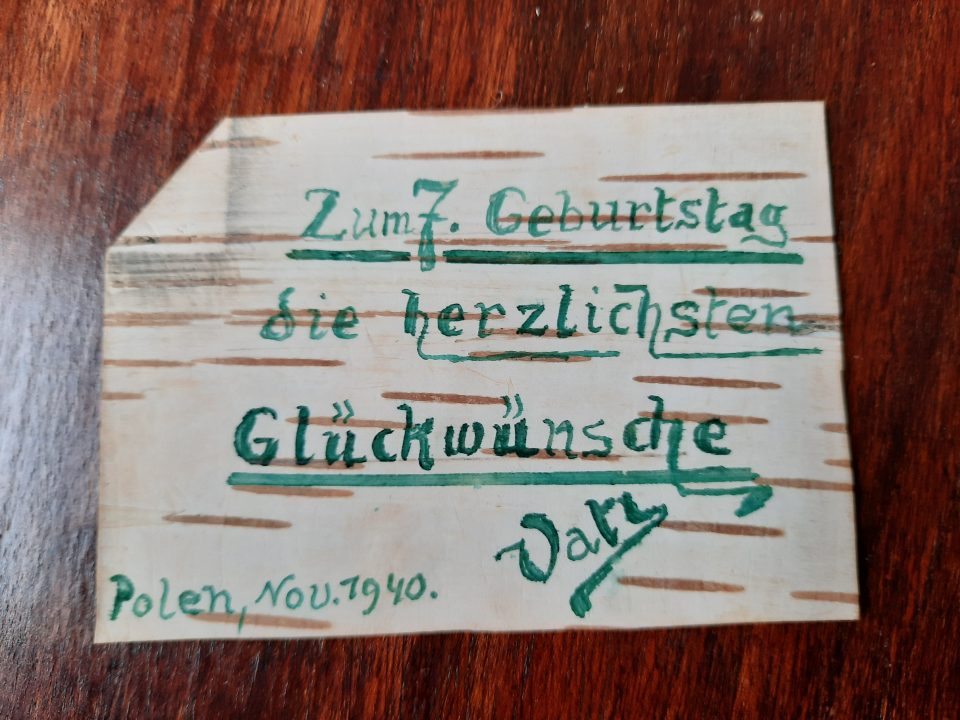
The birthday card for Herta’s 7th birthday on 24 November 1940, which Toni created for her.
As Toni’s ankle got inflamed and the scar festered, he was transferred back to the sickness ward and he hoped that the doctor, who was “a really nice guy who you can talk to” would recommend home leave for him. In Rzeszow they had found out that they could get food delivered from an inn and Toni wrote enthusiastically that they had had “Fleischlaberl” (meat balls) “the size of a hand” with potato salad and cabbage salad the day before at a reasonable price and for the next day they had ordered seven “Wiener Schnitzel”, which would be a feast! In fact, the “Wiener Schnitzel” with salad and potatoes were excellent and cost only 1.10 RM each!
On 24 November Toni was finally back at the barracks and at night in complete darkness he and his friend Pauli trudged through the deep mud to the farmers to sell clothes and purchase food for their families at home. Toni bought 1.5 kg poppy seeds, 1 kg fresh butter and 1 kg curd cheese and several kilos of lard. Toni said he would need a “furniture hauling truck” when he went home. For dinner they were invited by their friend Toczek, who served them two large helpings of Pirogy and milk, and afterwards, to his surprise, Toni was informed that two days later he would be on furlough in Vienna.
Back in Nozdrec he immediately sent Lola and Herta a parcel of food for the Christmas holidays on 20 December with a comrade who went to Vienna. He recounted his journey from Vienna to Poland, which had been full of obstacles. One hour after departure the windows and the walls of the train compartment were already covered in ice, so they could not sleep at night. In Debica they arrived two hours late and then ate a roast of veal with potatoes and salad and drank a couple of beers. The next train finally left at 6 pm, again two hours late, and they continued their journey for three hours in a freezing cold compartment in darkness, without light or heating. With a small, but heated and illuminated train they later left Przeworsk, but 15 km before they arrived at their destination, the train stopped due to an engine defect and they had to wait for another engine for hours. They finally arrived in Dynow at 3 am. There they were provided with a sledge at 5.30 am and returned with it to their barracks.
The officers were now pushing the soldiers to reach higher productivity and at the same time reducing the food rations, although they had to work under very harsh conditions: 30 cm of snow, minus 20-26 degrees Celsius, but fortunately no mud. “I think our officers want to earn themselves a few stars (decorations)!” Toni was really angry when he learned that only privileged soldiers (probably NSDAP party members) were allowed to celebrate Christmas and New Year at home. The only advantage was that they were rid of these officers over the holidays. Toni was back in the kitchen and wrote that they had visited with Pepi his befriended farmer, who welcomed them warmly and was enthusiastic about the harmonica they had brought with them. While Toni was on furlough he had slaughtered a pig and had kept two excellent smoked pieces for Toni and they had to taste the fresh black pudding with butter. Unfortunately they could not drink any vodka because they had had too much the day before, but the next day they would visit the farmer again and then they would be able to have some vodka again. Lola should see whether she could get more old clothes or shoes, especially children’s shoes this time. He could sell all that to the farmers. She should ask Milly, Hans, Turl or the “oldies”. She could give some of the stuff to Häusler or Ruthner, who were both in Vienna, and would take the stuff with them back to Poland. They could really make do with the money he got for the clothes and shoes. He would send her the money as soon as a comrade he could trust went to Vienna.
Alcohol seemed to play an enormous role among the soldiers in Poland, even more than in France, and especially around Christmas and New Year. Toni was back in the kitchen, which was advantageous for his wounded foot, but he had much more work to do from morning till evening. On 22 December he described to Lola how they had spent the evening before saying fare-well to Hauser, who could go home over Christmas: they were ten and had 1 barrel of beer, 3-4 l of schnapps, so they were all very drunk, “but without consequences. Only my memory is quite dim and Pepi was so drunk and sang continuously, so that I had to drag him home.” Toni was indignant when their sergeant bid fare-well to them in the morning and told the soldiers how sad he was that he could not celebrate Christmas with them. Toni despised this hypocrisy of the élites who had the privilege to go home for the holidays. Toni and some comrades would be going to his Polish friend Kaczi in the evening and bring him the harmonica again.
On 23 December Toni burnt his arm at the hot water cauldron, but the paramedic treated the burn with an ointment and it would be ok. There was uproar in his troop because for Christmas the army had allocated only 2 l schnapps, 2 bottles of sparkling wine and 4 l of wine for 20 men – and they had to pay for it! “…there will be a thimble full for everyone!” Toni begged Lola to send him some sugar for the farmer’s wife because the local population did not get any sugar at all. When selling their and Turl’s clothes and shoes, for which he received 108 zloty, he was invited by the farmer for dinner: 250 g sausage, mustard and two cups of fresh milk!
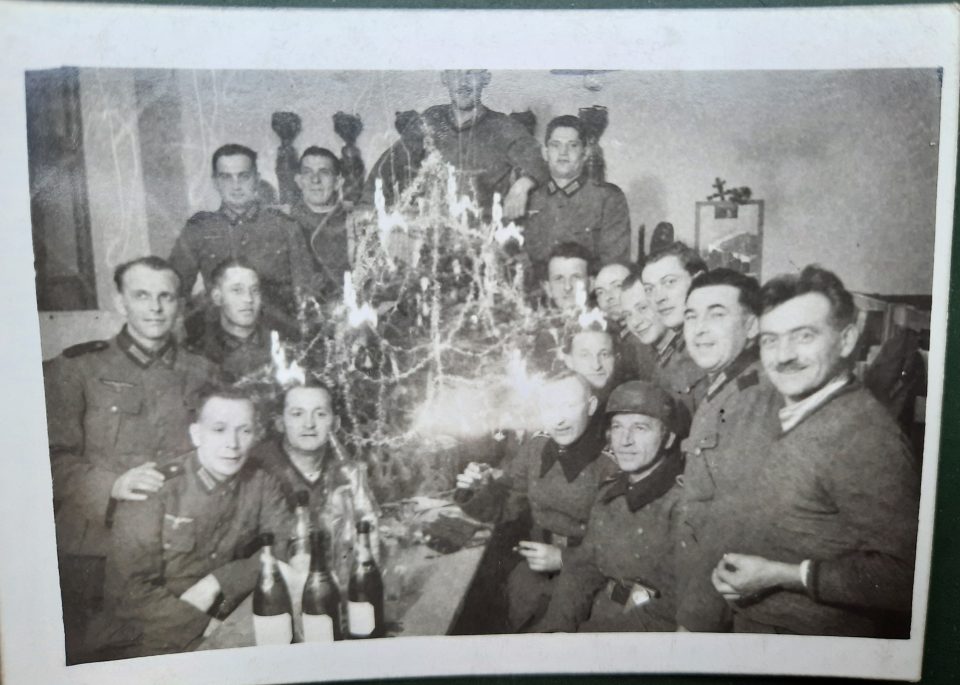
Christmas 1940 in Poland (Toni standing in the middle with the cut off face in the background), 24th December 1940
On 25 December Toni described to Lola how he had spent Christmas Eve in Nozdrec. On the 24th he had stayed in the kitchen until 7 pm making different types of sausages (“Bratwürste and Presswürste”). Sunday was always the day when they made sausages in the barracks kitchen; black pudding, brawn, roast sausages etc. When he was finished he was dead tired, but the extra ration for Christmas was ok: 250 g chocolate, half a bottle of sparkling wine, 1 packet of cookies, 1 bag of sweets, 250 g apples and half a litre of wine for each of them. Toni had kept one bottle of sparkling wine and two bars of chocolate for Lola and Herta. He did not enjoy the celebration on Christmas Eve; first because he was so tired and second, because he had to think of his family all the time. They had a nice little Christmas tree and sang a few Christmas songs, but then the binge drinking started. This time he only drank a few glasses of sparkling and some wine, but he was not in the mood for drinking, so he played cards with Pepi and Kaltenberger. Then Maxl, who was completely drunk, started together with others a huge brawl. They were lucky that the next day there were just a few black eyes and no one was seriously hurt. Toni went to bed at 10 pm because on the 25th he had to start in the kitchen at 5 am, but the others rioted until 3 am. Toni already worried what New Year’s Eve would be like. He made for himself scrambled eggs with greaves for Christmas morning. Then they prepared an excellent pork roast with a bean salad for lunch. In the evening Toni and Pepi had planned to visit their farmer – friend Toczek, who had invited them for Christmas, but their sergeant had forbidden everyone to leave the barracks. Yet the Polish family was so nice and the farmer came to the barracks and asked why Toni and Pepi did not come to them to celebrate and they had to promise him to visit the next day.
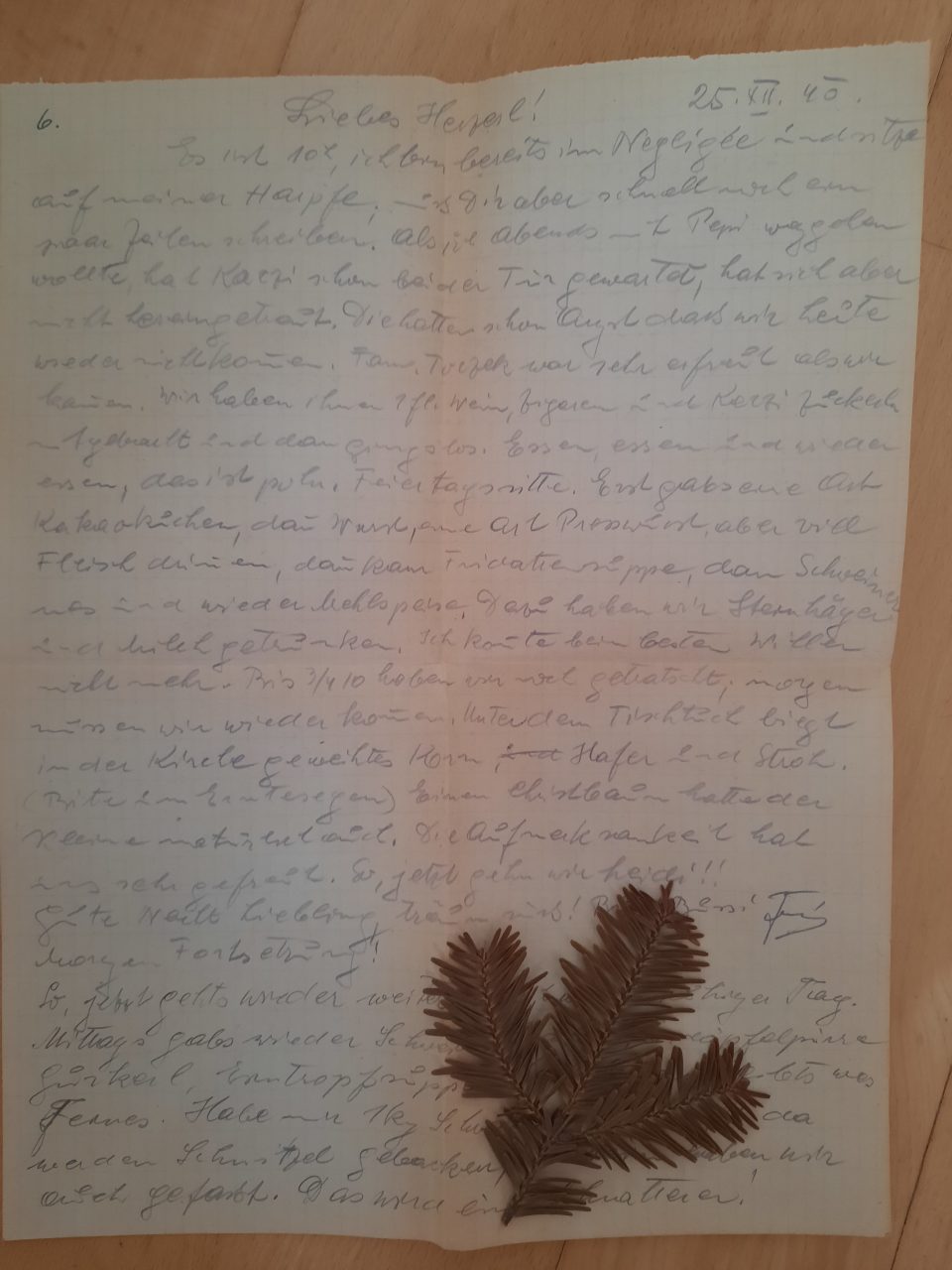
One of the two letters Toni wrote to Lola on 25 December with a dried pine twig from their Christmas tree
Toni then reported on the lovely evening they had spent with their farmer friends on 25 December: Kaczi had already been waiting for them at the gate of the barracks, afraid that they would again be prevented from going out. The family Turczek was so glad to see them. They had brought wine and cigarettes for them and sweets for Kaczi. Then the festivity started, “eating, eating, eating – this is a Polish Christmas custom. First they served a kind of cocoa cake, then different types of sausages, then beef broth with finely sliced pancakes, then pork roast, and finally again cakes. We drank milk and herb liquor. I couldn’t eat anything more! Then we chatted until quarter to 10 and they told us that we would have to come again the next day. Under the table cloth they had oat and straw consecrated in church (begging for a good harvest). Naturally they also had a Christmas tree. We were so touched by their hospitality.”
For the 26 December they cooked soup and pork roast with pickles and mashed potatoes for lunch and Toni had bought some pork, which would be turned into “Wiener Schnitzel” for dinner and served together with half a litre of wine for everyone. What a feast! His chef would purchase 8 kg ham for him, which he would like to bring home to Lola together with a bottle of sparkling wine for New Year’s Eve, but unfortunately no Viennese soldier was going home in the near future. Lola had sent Toni a parcel with a small Christmas tree and Christmas cookies and he was glad that she had received the money he had sent her with Pauli, so she would not have money worries over the Christmas holidays. When the next day another parcel arrived with sweets from Lola, Toni was so touched and asked whether she wanted to fatten him. He further told her she did not have to fear that he would become an alcoholic in Poland. He now did not feel like drinking any more, only very rarely. For New Year’s Eve they had received an invitation again from the Polish family Toczek, where it was certainly going to be much nicer than at the barracks. It was now extremely cold in Nozdrec, minus 20 degrees Celsius during the day, and in the morning they were freezing in the kitchen; they had to endure an icy wind and drifting snow. They had 50-60 cm of snow already. He reported that his comrades had loved his “Wiener Schnitzel”, which they did not know and for this evening they had cooked a sweet dish: milky rice with compote. He asked Lola again to look for more clothes to sell. If she rolled them up tightly she could pack more into one parcel and Pauli would drag the bundle to Poland when he went back to the barracks.
On 2 January Toni wrote that it seemed they would have to leave Nozdrec soon. They had not received their pay yet and no information at all where they would go to. What they all wanted was to go home, but one sergeant said they might be going to Norway, lieutenant-colonel Treitler believed they would be stationed in Romania or Greece, but Toni did not believe any of that. On 3 January Toni reported that the first group of the 2nd Division had already left and they would probably move the next day to Zamosc into the citadel. He was glad that Lola had received his first smoked ham, which was a bit grey in the middle. Toni assumed that it had not been salted properly, but the second one, which she was about to receive, should be better, because he himself had salted it. Now he had already packed his luggage and was waiting for transport the next day. He had said fare well to his Polish friends and it was difficult to get away because as soon as you arrived the vodka bottle was on the table and you had to drink, but he would have to be up at 2.30 am the next day preparing coffee and breakfast before departure. He had only had 6 small glasses of vodka, but he drank milk in between and also ate something, so he was not drunk. The farmers were really sad that they were leaving and Toni was sorry, too, because the local population was so nice and hospitable. They would probably not find such amiable friends in Zanosc, “ …but it might be a good turn of fate, otherwise we would have turned into alcoholics there.”
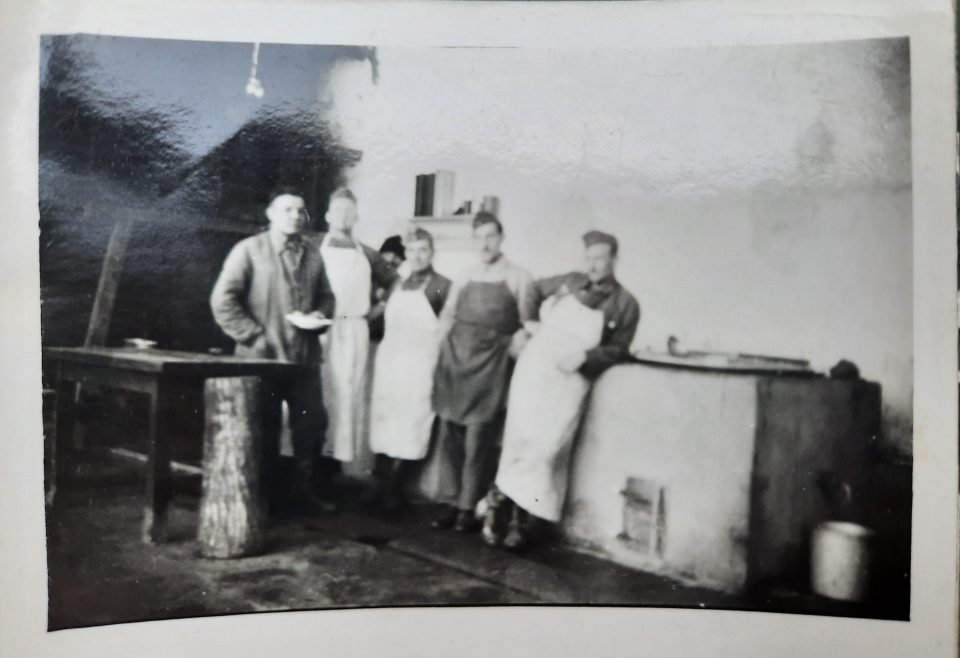
January 1941, NOZDREC, in the kitchen: Toni second on the right
Left: Toni in the kitchen in the middle, third from the right. The door on the right is the one to the smoking room. Right: Toni took a photo of lieutenant-colonel Treitler (in the middle) in the kitchen
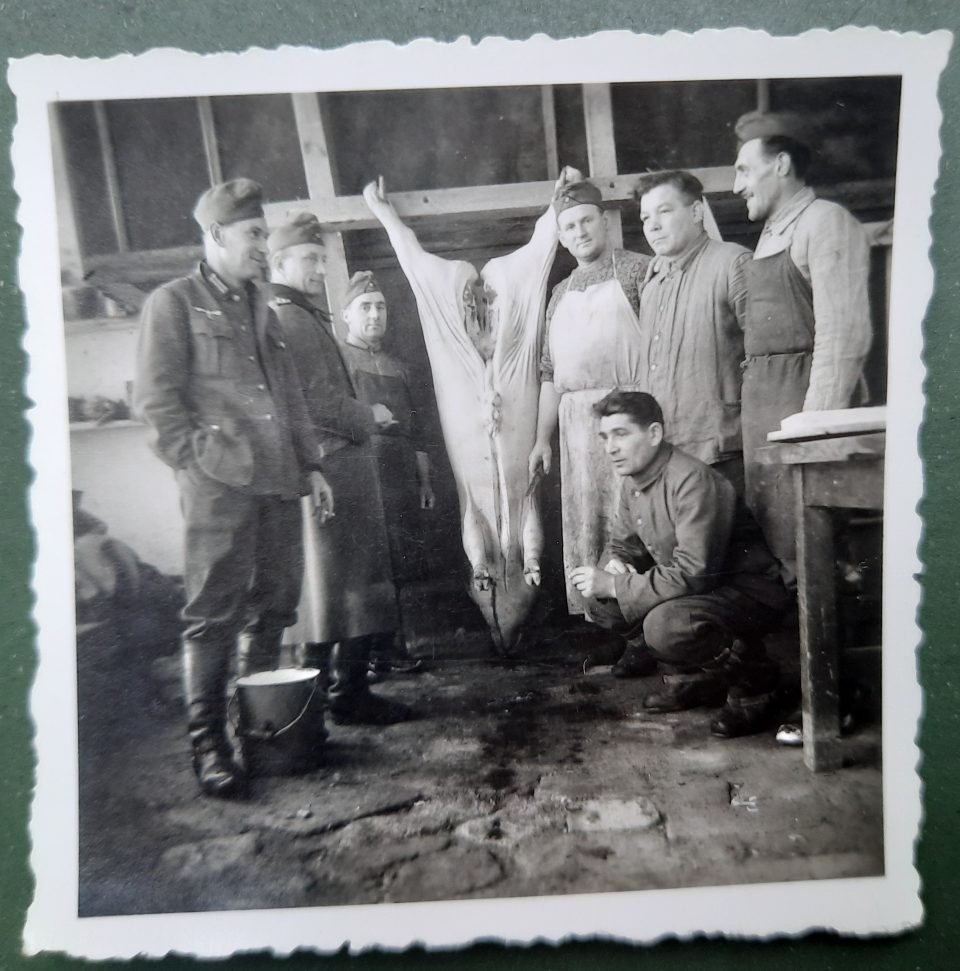
Slaughtering of a pig: Toni standing on the right
Suddenly Toni’s corps was cut off from the outside world by a snow storm in Nozdrec. Richard, who had a parcel for Lola, was stuck in Dynow for three days. He wanted to hire a sledge for 100 zloty to get to Przeworsk, but there was no getting through, so they all returned to Nozdrec. The snow they had in Vienna was incomparable to what they experienced in Poland. They had to clear the paths twice a day from snow so that they could at least pass on foot. One morning when Toni had to go to the kitchen for his early morning duty, he sank into the snow up to his belly, “… now the snow is falling so densely, like a white curtain!” He had put up a trap and hoped he would catch a marten because he could sell the fur for 12 zloty. The road to Dynow and the rail tracks were impassable. The only working means of transport were sledges. The postal service was interrupted, too, but once in a while some mail arrived. In the evenings they visited the Toczek family, “We had to drink some very light coffee (with lots of milk), brr, brr!!! Tomorrow morning I’ll make some good coffee in the kitchen!”, or wrote letters or read, but the electricity was unreliable and the light very bad. Most of the comrades were playing cards in the evening and Toni sometimes joined in, but not too long because he hated the commotion and the noise of the players. He was trying to serve good meals to his comrades, but it was really difficult because they lacked ingredients, especially fat and meat. Today they had goulash and tomorrow they would cook beef in sauce with noodles. As he had not received any letters from Lola recently, he hoped that Pauli would bring some post from her, when he came back the following week.
On 7 January Toni informed Lola about the change in the army’s plans; his corps would not leave the barracks for the moment. He hoped that they would stay in Nozdrec for some time now and it might be his turn for another furlough within the next 4-5 weeks. They had now installed a permanent kitchen there with two cauldrons of 280 l each, two cauldrons of 100 l each, two large cooking plates and an oven in which you could roast half a pig. Furthermore they had a smoking room where they could smoke two pigs at the same time. Everything was now ready for cooking on a large scale and there was a lot to do. His friend Pepi was employed in the kitchen, too, and he quite liked it. He had to help with peeling potatoes and cutting cabbage, but it was much warmer in the kitchen and there was always some extra food. On the 9th January Toni was very satisfied with the working of the new kitchen equipment; they were even able to serve hot dinner, not just hot lunch. In the evening he would sell the clothes Lola had sent at the Toczek family’s because they were supposed to leave the barracks within the next few days, yet nobody knew where to. He would send her the money as soon as possible. He asked Lola to write to him daily because he only received every second or third letter from her and he tried to calm her, “Look, Pipilein, it’s no use being afraid, we can’t change anything and I certainly won’t act the hero!”
Toni had bought 27 kg of bacon and had cooked it and made lard and greaves in the kitchen the whole afternoon, when the sergeant and the lieutenant had come by and asked what he was doing. He explained to them that he was taking the lard home, so they were satisfied because “they were happy if you dragged as much home as possible.” (This was to compensate for the food shortages at the home front) In order to win them over Toni sent them fresh greaves for dinner. On 13 January Toni reported that they had been snowed in again with all roads and trains blocked for days. Within one hour the whole place was sunk in snow drifts. But that day there was marvellous weather with sunshine in a deep blue sky and all the mountains and meadows covered in snow. One could believe that they were staying in a wonderful country. Yet the temperature was extremely low, minus 27 degrees Celsius in the morning! When he entered the kitchen in the morning his coat collar, his eyebrows and eyelashes were covered in frost and the door of the kitchen was white with snow on the inside; “…but, anyway, better than the storm of the days before! What is really nasty is fetching water from the pump outside because my hand immediately gets frozen on to the handle of the pump.” They had already received their marching orders, but the snow storm had again delayed their departure. Their next destination was supposed to be Zamosc, 200 km to the north, “It won’t get better because that is genuine Poland, whereas here we are still in former Galicia. The people are certainly not as nice there as here.” Toni had discovered another farmer, where he had bought 5.5 kg of ham, “Very nice people! They immediately served us tea, sausage and butter. You don’t know how you can compensate them. Tomorrow I will fetch 1 kg poppy seeds.” The weather was still very bad and so they could not leave. Anyway, the kitchen was the last part of the division that left the barracks. Toni had already put on weight: 83 kg; he would soon be near the weight of the chef who weighed 136 kg! The photos of them in the kitchen were taken by Pepi (see above). He was sitting in the kitchen and writing letters there because it was the warmest place. Toni raved about the nights with full moon, when this place looked like a dream landscape: in the early morning you could see in the east the rising sun and in the west the descending moon and half an hour later the mountains were drenched in glowing red, “That is the most beautiful aspect of Poland!” There were lots of foxes, but they were difficult to shoot because they sensed the humans. Toni would rather stay there than move on because nobody knew what it would be like elsewhere. They would not have such a kitchen as this one. He was now smoking some sausages for Pauli; they would not get to a place as ideal as this one.
On 20 January 1941 Toni sent the left postcard to Lola with the comment, “Beware, don’t fall in love with this guy!” They had slaughtered a pig of 180kg and had celebrated this event with a “Sautanz”. They made sausages, salted the meat and smoked it and sold the smoked pieces to those going on home leave.
The advance party of the 1st and 3rd division had returned, so their transfer to Zamosc would be further delayed due to bad weather. Toni was told that Zamosc was supposed to be a bigger town with approximately 20,000 inhabitants and very beautiful, but expensive. The forces’ postal service was continually interrupted due to snow drifts. The uncertainty remained when they would be transferred because there was no space for them. They would probably be accommodated in a school 8 km from Zanosc. The soldiers were regularly checked for lice, which was an embarrassing procedure. But what was worse, Toni suffered from diarrhoea in regular intervals, which he assumed was due to the rotten fat they had to use for cooking; he never drank any tap water anyway. The dishes they served tasted nice and he loved the typical Viennese specialities such as “Erdäpfelgulasch”, “Reisfleisch” and “Leberreissuppe”. Nevertheless his health condition worsened and he had to stay in bed. He was treated with doses of opium, which must have been a universal treatment in the Wehrmacht. It did not really improve his condition, but made him feel dazed. On 22 January it started to thaw and a foehn storm had melted all of the 2-3 m of snow so that now the whole area was a “sea of mud”. Toni thought that he was sick because of wading in the mud all day, which meant he had permanently wet feet. Nearly all of the men suffered from diarrhoea now and then and they were all treated with doses of opium.
Toni bought ham not just for Lola, but for the sergeant, too, and smoked it himself because then he was sure it would be perfect for taking home. Lieutenant-colonel Treitler and their sergeant had inspected the troops on 25 January which could mean that they would be leaving soon and Toni hoped he would be fit for the transfer because he had to carry so much food which he had saved for taking home. Toni had taken several photos of the region with Ruthner’s camera which he was going to send to Lola for safekeeping and he described the sceneries: local traditional huts, a draw well, doing the laundry in ice, spinning (“a very complicated task”), the village of Nozdrec and the village inn with the innkeeper and the officers. Unfortunately these photos have disappeared.
Again the advance party had returned from Zanosc because the billeting of their division was extremely difficult due to a lack of suitable space for accommodation. Meanwhile a new group of soldiers had arrived at their barracks and they had to cede them their common room, so they were now very crowded; 35 men in a small room. It was too noisy for Toni to write and also the light was very bad because the petroleum for the single lamp was of inferior quality. So Toni fabricated a carbide lamp himself, “…either it burns brightly or it will explode!” He usually fled to the local farmers where the atmosphere was much more amenable and calmer. He described to Lola the living room at the farmer’s family: They were 12 people there, yet not all children were present because they had 12 children and one of them, Marika or Mariechen, could speak a little German, “…. and Pepi has fallen in love with her – a little!” Toni had made friends with the brother-in-law who spoke French, “Nevertheless there are lots of misunderstandings which cause much laughter. You need not worry, I certainly won’t fall in love! There is no room in my heart for another woman but you. I’m writing to you as if I were chatting with you, my beloved.”
On 27 January Toni wrote that they had just slaughtered two small calves of 25-30 kg that day and another one the next day. They were really sweet and Herta would have loved to play with them. They had to cook for 193 soldiers now and the roast veal was something special, which they had bought from the farmers. Every soldier had to pay 15 Pf., but it was a real bargain because they had to pay the farmer 13 zloty for each calf and they received 3 zloty back for each fur, so one calf cost them only 5 RM. They would be able to cook a second dish for dinner with the meat: a Viennese speciality, veal goulash. That day their officers had visited the kitchen and they learned a lot from them about Zanosc, especially that there was nothing to buy in this town. So Toni would like to buy more meat and smoke it, but he lacked the money. Consequently he asked Lola to send him more stuff to sell to the farmers, if possible. The forces’ postal service was still the greatest annoyance for Toni. He received Lola’s letters very irregularly and there were several missing, whereas the letters of his sister Milly arrived punctually and also Karl Häusler got his letters daily. Therefore Toni advised Lola to post her letters in future in another district of Vienna, may be that was the problem. Toni was quite angry when he found out that Richard had managed to be transferred back to Vienna as “u.k.” (“unabkömmlich” – indispensable = deferred from military service) and he wrote to Lola that she could see what it meant to be a “P.g.” (“Parteigenosse” – NSDAP party member).
It was still extremely cold and when Toni had early morning duty the cauldrons were all frozen, but minus 20 degrees Celsius was better than the mud. “Today it was freezing cold and when I went to the kitchen early in the morning, it was – brrr – really mad. The sound is so strange when everything is quiet and the trees start to crackle with the frost as if they were about to break. Naturally, in the kitchen everything was frozen. During the morning it was still minus 20 degrees Celsius.” The veal had been so tender that they bought another four calves that day, which were only 35 RM and Toni was looking forward to the excellent dishes they would cook from the meat. Toni was a professional cook and enjoyed excellent food above all. He even pondered whether to buy one calf for home, but he did not know how he should transport all that once he was granted home leave. He later told Lola that she did not have to be upset, taking a calf home had just been a joke. Now he was rather lonely because Pauli was not there and he was like him, not interested in other women, but Pepi now disappeared immediately after every duty to visit his new love. “Pauli and me we are only interested in a nice chat and good food, women don’t interest us at all!” Unfortunately, the picture he had from Lola and Herta was so blurred that he could not see much of Lola and he told Lola that they had a stupid saying in the army: “Beim Militär gibt’s nur einen Sinn – den Blödsinn- und eine Sehnsucht – die Mütter.” (In the army there is only one sense – nonsense – and one yearning – mothers)
Now every day there was one hour obligatory teaching for the soldiers, Toni reported, but the kitchen personnel was exempt, “I would like to listen in what nonsense they are telling the comrades. But we in the kitchen are already so clever, we don’t need that! If you look out of the kitchen window you want to go for a walk, but as soon as you stick your nose out, you rush back because of the cold. Our kitchen looks like a delicatessen: you can see approximately 1 m of sausages, large tins with lard, a tower of smoked ham, 2 large pieces of roast pork and in the corner a bottle of sparkling wine.” On 30 January Toni reported a record of minus 30-32 degrees Celsius. When he was working in the kitchen at the stove he was roasted in front and frozen at the back. On 31 January Toni confessed that he had again been drunk the night before. He had gone to the local inn with Karl – very respectable -, but then they encountered another Viennese, a sergeant, and they started to chat about wives and children, they fell into a depression which they had to cure with vodka. When finally also lieutenant-colonel Treitler arrived, who was a merry fellow, too, they started to sing Viennese songs and “drenched them in more alcohol”. At 10 pm they were all quite drunk and went to bed. Toni slept very well and woke up the next morning very hungry, “You should follow my example, Pipilein, by God, not the drinking, which I think you are quite good at already, but the eating!” He said he was eating the whole day and in the evening he had made himself extra scrambled eggs of five eggs. On 1 February it was one year that he was “ … in this club. You get older and they are stealing you the best years of your life.”
On 4 February their division was finally in the process of moving. Toni was still in Nozdrec with about 70 men and was expected to be transferred the next day. Everything had to be packed and prepared for transport; it was complete chaos. He promised that he would write to Lola as soon as he had arrived in Zanosc. It was difficult to prepare meals now, because most of the kitchen equipment had already been shipped to Zanosc, especially as he had to prepare breakfast for the departing men already at 2.30 am. He wanted to grab the last chance for procuring cheap ham and had ordered a 5 kg piece. Pauli had lent him the money; he was his “banker”. It did not matter that he had to carry now even more to the next destination because there everything was extremely expensive and rare. There a small piece of soap cost 2-3 zloty, what a difference to France! But there was again a delay because everything was stuck in Przeworsk.
In his letter of 8 February 1941 Toni described the transport from Nozdrec to Zanosc which took them two days. On the 6th they marched to Dynow and then took the train to Przeworsk. There they had to stay overnight. They ate in the soldier’s home for 1.50 zloty each and drank some beer. Later they tried to get some sleep in a barracks. The horses, carts and their luggage had already been dispatched to their next destination in the evening. In the morning they took a freight train to Rozvadov, but from there to Lublin they stopped in every station for hours. In Lublin they were stuck for four hours in the evening without heating or lighting, without tea or food and no money and on top of it, it was freezing cold. The whole area was covered in enormous amounts of snow. They finally arrived in Zavada on the 8th in the morning. From there it was 9 km to Zamosc, where they had to wait again five hours for their transport. He and Pepi were sitting in the train with their suitcases on their knees writing to their beloved ones to pass the time. Toni had the food he had bought for Lola and the bottle of sparkling wine in the suitcase, which he had to haul from place to place because he was afraid that otherwise in the cold the sparkling wine would freeze and the bottle would break and he wanted to drink it with Lola on his next home leave. There were rumours that a furlough ban was to be imposed which would be disastrous for Toni. They finally arrived in Zamosc at lunchtime, where Pauli welcomed them; now the trio (“the cloverleaf” of Toni, Pepi and Pauli) was complete again and Pauli immediately took them to the city of Zamosc and invited them to an inn and a bar, where everything was very expensive, but tasted excellent. There were quite a lot of inns in Zamosc; small rooms with four to five tables and the bars did not look any different, but offered live music. They started with tea with rum (1.50 zloty) and excellent “Faschingskrapfen” (a traditional Austro-Hungarian sweet dish eaten during the carnival season), 0.35 zloty each, followed by a tasty “Wiener Schnitzel” with fried egg and potatoes for 3.50 zloty and a bottle of beer (1.20 zloty). In the bar they had some vodka and peppermint schnapps and listened to piano and accordion music. Toni did not know how they would spend their free time in this place because they could not afford such outings really. He was seriously thinking of running away. (But he would of course never do so because he feared the consequences for Lola and Herta in Vienna) He told Lola about “a new official order here. All Jews, and there are many, have to greet the soldiers. It is so strange, when you cross the Jewish quarter and everyone doffs his hat devotedly”. (Also in Zamosc a ghetto was erected by the Nazis from which Jews were deported to extermination camps in Poland.)
Programme of a cultural event organised for Wehrmacht soldiers by the NS organisation “Kraft durch Freude”
On 9 February Toni wrote that in the morning some of them had gone to the theatre to watch “Lieder und Arien” (Songs and Arias), but “so early in the morning this squeaking is nothing for me”. He would go to the cinema to watch “Der ungetreue Eckehard” (The unfaithful Eckehard) one day that week. Unfortunately the cinema changed its programme on Friday solely, so you could go to the cinema only once a week. Toni feared that it would be dead boring in Zamosc and they would spend most of the time in their common room playing card games. He urged Lola to write a lot to him, so that he had topics to answer her because his daily letters were the only connection to her. He still had no notice when he would be allowed to go on furlough, which was really “cruel”. He told Lola what he had heard about the history of Zamosc. Some years ago a “crazy earl” had the idea to build a city. The plan was really good and the town hall was very nice. It was located on an elevated spot with a tower and a steep staircase with a beautiful square in front which was surrounded by nice houses, every one of them in a different colour and all with arcades, “just as in Innsbruck Maria Theresienstrasse”. But since then nothing had happened. What had been built so far was kept in shape, but nothing new was being constructed. The shops in the arcades were really paltry, not one with new and interesting wares. 50 paces from the main square the dreary plain started. “Yes, there is also a zoo. I have to go and visit it. The whole place looks as if it has slept for God knows how long.” Pauli had made some photos and Toni would send them to Lola, but they have not been preserved except the one which shows the barracks Toni was helping to build in Zamosc. He liked this kind of work which constituted some diversion from his usual jobs in the kitchen. He reported that the food supply was now by far not as good as in France. They nearly never had sausages or pork, mostly chewy beef stew with beans and cabbage and most of the time tinned food, black pudding or liver pâté.
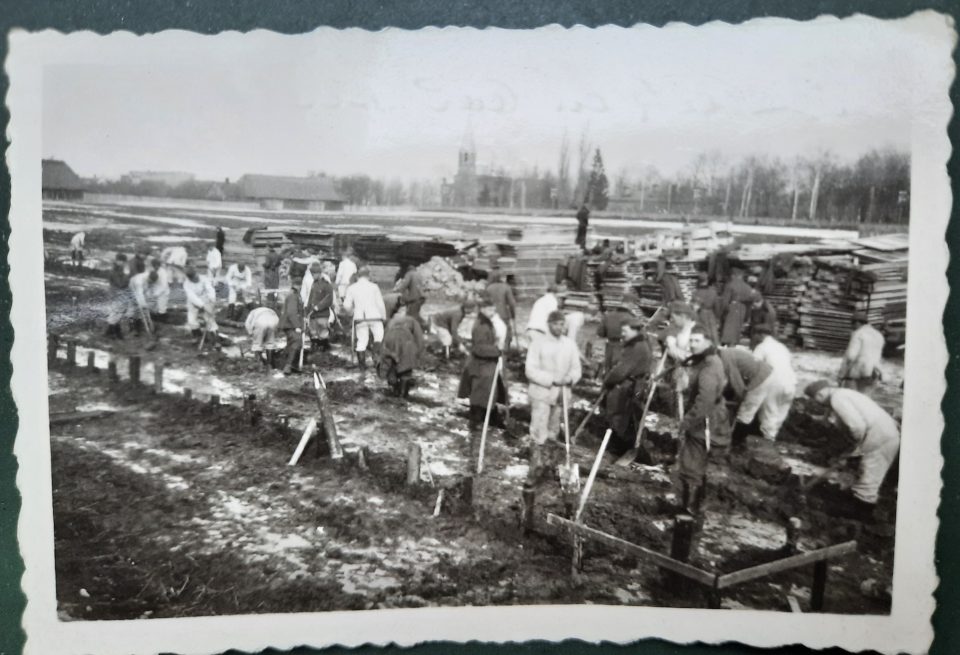
Constructing a barracks camp in Zamosc in February 1941
“I’ve only been here in Zamosc for 30 hours, but I’ve already had enough of this place. You would need a Dukatenscheisser (someone who is made of money) here” (As everything was so expensive, the soldiers could not afford much). Then Toni described a little excursion to the town with Pauli: First a short tour around Zamosc, then some nice milky coffee with cakes for 1.10 zloty in a café. Afterwards they went to the casino, also called soldiers’ home, which was fabulously furnished. All the rooms formed part of a former theatre, which had been turned into a cinema. The casino offered a dining hall and a gaming room. There they took black coffee and “Faschingskrapfen” and played a game of billiard. He humorously noted that he would now always use the “English water toilets” in the casino because the toilets in their barracks were indescribable and unusable, so it would be best to visit the casino daily. But the food they offered in the casino was a disaster, even if it was cheap; the roast liver with potatoes tasted like leather. On 10February Toni had some news for Lola: He was no longer in the kitchen, which he did not regret as it was freezing cold and badly equipped. Now everyone “who could still crawl” had to work at the construction site for the barracks. This was 1.5 km from where they were quartered in an old fortress, which was dreary and cold, “like our Arsenal, but ten times worse”. The three of them, Toni, Pepi and Pauli, slept in one room there. At the moment it was thawing and everything was covered in melting snow and mud. All the streets and squares had turned into muddy lakes. His feet were always wet, that’s why he was lucky to get some rubber boots, which were also warmer. Toni was used to hard work, but the overseers continually complained that they did not work hard enough. No one was allowed sick leave. All the soldiers were angry because of the furlough ban, so no one really put a lot of effort into the construction work. For dinner they had the usual tins, this time of corned beef, which was not enough if you wanted to get some work out of the soldiers. Toni kept the tin for Lola and went to the casino with Pauli. That evening the food was better and cost only 2.40 zloty: beef with potatoes and salad, vanilla pudding with cranberries.
The situation in Zamosc was dismal for the soldiers; no money, terrible food, dirt everywhere, no home leave and continually more work. But he told Lola that she did not have to fear, they would get through this terrible time because “A echta Weana geht net unter” (a real Viennese always survives). At half past five they had to get up and work until 12 and “there are more overseers than workers”; at half past twelve they got home dead tired and received those terrible tinned soups and stews for lunch; at half past one back to work until 5 pm. “If you have to dig up half a metre of half-frozen earth, your hands start hurting.” That night when they came home at half past five, there was a big surprise waiting for them for dinner: tinned fish! The ration was too small and they all detested this kind of food meanwhile. Most of all, they did not receive their pay that evening, so they could not go to the casino, too. “But now enough of this Sauverein (crappy club)! I’m so angry about these unbelievable injustices, I could burst! Well, you would not become a National Socialist under these conditions except one is an idiot!” Toni reassured Lola that she could write everything to him, as the letters were not censured. She could see that also he did not mince his words. He asked her what the matter was with Ignaz and Ritschi and excused himself for the last letter, when he had been really desperate. If possible, could she send him some cake, as she knew he loved sweets and could not get enough here, but he did not want to deprive her of anything!
Toni finally found out why there was such pressure on the sappers in finishing the new barracks. On 13 February the high command of the regiment visited the barracks, admired the new construction and praised the local officers. Toni’s humorous comment, “I can’t purchase myself anything for that praise. I actually went to town in the evening to buy myself something for the colonel’s speech, but they chased me away, as they did not accept such payment.” In fact, he went to town with Pauli and they ate some sausage and cake and drank some mulled wine. Everything was very expensive in Zanosc, but he bought some soap and hand lotion for Lola and three postcards of the city, which can be seen below.
The town hall and arcades of Zanosc
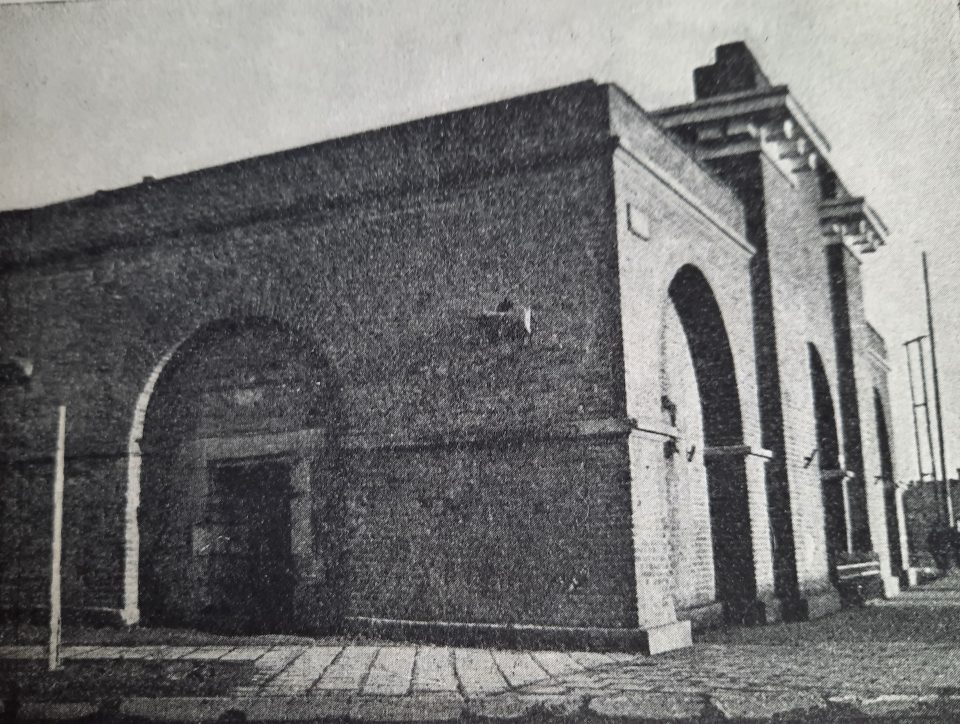
The prison of the Polish hero Lukasinski. Toni wrote that this prison looked like the building they were quartered in
Toni described the progress on the construction site. 5 buildings were already standing and more were being constructed. The work was now easier for them because they had four compressors and did not have to dig up the frozen earth by hand any more. Continuously new material was being delivered and the site was filled with heaps of material for roofs, floors, walls, windows and so on. The barracks were prefabricated shacks which had to be assembled. The walls already contained the windows and doors complete with glass panes. These shacks were supposed to house 100 soldiers. “Well, now and then, one of the glass panes gets broke, but this is no problem. We’ll have to set up more than 100 of them, including a kitchen, an officers’ casino, stables and mostly dormitories with a parade ground in the middle! Nearby a similar job is waiting for as. This wouldn’t be so bad as the weather is improving. If only the furlough ban would be lifted!” As it was thawing during the day, they were stuck in mud up to their ankles and the mud sucked the boots from their feet. Toni described to Lola that they were dressed like “Eskimos” when working on the construction site protecting themselves against the cold: two pairs of underpants and two pairs of trousers, a shirt, a jumper, two army jackets, a coat, a pair of shoes together with a pair of rubber boots, a snow cap and mittens, “and then you are supposed to work!”
When he was able to go to town after work, the shops were already closed, so it was difficult for him to buy something for Lola. He had seen a “Bata shoe shop” and hoped to buy her some boots. He later learned that they were 140 zloty and not even made of leather, which was highly overpriced, even if they were stylish. Unfortunately everything was so expensive and much of his pay was used up for cigarettes which cost around 2 zloty a day. Now and then he bought himself some sweets, but no longer any schnapps which cost 1.20 each small glass. So even a little drunkenness was much too costly and he felt that it was better anyway because the “schnapps made from potatoes” would have killed them in the end. Finally he had found a way to safely store the bacon and the other food stuff he had bought for Lola in Nozdrec until he could go on home leave because in Zanosc there was nothing he could buy for her. Eventually he found a way to send the sausages to Lola with a comrade who was going to Vienna on special leave because his wife had suffered a stillbirth. He warned Lola that the sausages did not look nice anymore because they had been in his backpack for such a long time, but they were still edible. He urged her not give away anything because he had no longer the chance to procure meat products for her.
On Sundays they could rest, although sometimes the officers talked about work on Sundays, too. They could sleep longer, had to clean their clothes and weapons and then had to report for duty at quarter to 12. They were praised for their good work on 16 February and their sergeant invited them to the cinema. Toni wrote that the permission for home leave would have pleased him much more, but there was no talk of any furlough. The next day they stopped work at 4 pm and went to the cinema to see the film “Wiener G’schichten” (Viennese Tales), which was a lot of fun! In the morning the sergeant had asked them during the roll call how they liked it in Poland and Toni had shouted loudly, “not at all”, but the others were too cowardly to tell the truth, he said. When they were digging a new latrine at the construction site, 7m long and 1.30 wide and 2m deep, suddenly a sharp pain went through his back and he could no longer stand upright. He had to stop work at lunchtime and would have to see a doctor the next day because of his sciatic troubles. He hated having to lie in bed and he would much prefer to work, but it was impossible. The sergeant was angry with Toni because there were already many sick comrades and not enough workers on the construction site. Yet Toni wrote that this was no wonder, as the working conditions were so bad and not all of them were so lucky as to get rubber boots and they were wet all day in the cold. His friend Pepi had come too late when the rubber boots were issued and he would surely fall ill soon, too. He was in a very dark mood anyway because he had not received any mail from his wife for more than two weeks and Toni really pitied him. As his condition did not improve, Toni was afraid that they would transport him to a military hospital and he feared that the food he had stored for Lola would “disappear” and that he would not be allowed to go on home leave in the near future because at that moment the furlough ban was only imposed on sappers and might be lifted any time. He was writing his letters in ever smaller script because he could not get hold of any writing paper and was short on envelopes, too. At half past 8 the others were going to the theatre for an evening of songs, which Toni would have liked to attend, but he could not sit for so long and after the show “two would have to carry me home!”
In February Toni uncovered instances of corruption in the division. From Nozdrec they had taken 100 kg of smoked meat with them as property of the troop and everyone who would go on home leave was allowed to buy 3 kg of it, but because of the furlough ban no one went on home leave and consequently no one bought any smoked meat. On 22 February they could buy 100g each for dinner, which made 20 kg, but afterwards there was no meat left. So where had the 80 kg of smoked meat gone to? He told Lola that this was just one example; he could give her many more examples of theft and fraud among the comrades and officers. Meanwhile their furlough was reduced to two weeks and only 10% of the troop could go on home leave at the same time, which would mean 23 out of 230. Winter and snow had returned to the area at the end of February and he was still unable to move. He got some medication, hot water bottles and ointments containing camphor, but nothing seemed to work. He had to stay in bed and his only distraction was writing letters and reading novels which were available, such as from the Bavarian writer of rustic romantic novels, Ludwig Ganghofer. Toni enjoyed the cakes and cookies in Lola’s parcels as usual during this time. He especially mentioned her cocoa cake which she still made for us in the 1980s and the recipe is a family treasure.
Some of their comrades spent a lot of money on alcohol and got drunk every Saturday and Sunday, he wrote. He could not understand how they could waste all that money. On the 26th February he celebrated his birthday with Pauli and Pepi and had a small party with “Wiener Schnitzel” and two to three bottles of beer only. He had saved quite some money since the transfer to Zanosc. At his birthday he was feeling better and within two days he thought he could return to work. He went to town with Pepi and had some excellent brawn for hors d’oeuvre and then a wonderful beef steak with two bottles of beer. This treat had cost him 9 zloty, but he would continue to save money from now on again. He had not received Lola’s birthday parcel yet, but the delivery of parcels took even longer in the army. Unfortunately there were no news about the next furlough and he was losing hope, especially as he was still in pain. He worried that if he had to wait any longer, the bacon and the sausages he kept for her would be spoilt. He was spending the time trying to wash his clothes and repair his socks, but the results were not satisfactory because he had to heat the water in his small lunch pail and the holes in his socks were already so big that he had a big lump of wool now where the hole had been and after his “laundry day” his back hurt again a lot. The old military doctor diagnosed that his pain was not sciatic, but did not say what else it could be, so he prescribed some “movement” and stated that he was ready for duty. For a change Toni went to the cinema in the evening. There was a film with the actor Hans Albers, but the best for Toni were two documentaries, one on Japan and one on Greenland, which he enjoyed.
Toni informed Lola that she did not need to send him any money; he could make ends meet with his pay: once a week dinner in an inn and one film at the cinema, that was all, the rest of the week he stayed at home. He rather worried that Lola did not have enough money for food and heating. Lola need not get worked up about his health because he was smoking less now that his back hurt. Until 2 pm he had only smoked 10 cigarettes, but he was so happy when he received cigarettes from Hans in his birthday parcel. On his first day back at the construction site, he was glad that he could stand and did not achieve much, but he had no ambition anyway. On 1 March he wrote that he was now given a gun because there would be an inspection by the officers. “All my life I haven’t touched such a cudgel!” Toni was lucky because the staff officer did not have anything to criticise during the roll call although every second soldier got a warning. For dessert they then had “Germknödel” (sweet yeast dumplings), which was one of Toni’s favourite sweets, but it was a great disappointment. So he and his friends treated themselves to a nice tea in town with seven cakes, coffee and beer for 4.75 zloty each and a nice concert of a five-man band. In the evening they went to the theatre which was free of charge, but after the first part he left, as his back ached and the play was rather trivial, if sometimes funny.
On 3 March Toni sent Lola the lyrics of a traditional song they were singing including these new lines: “…soldiers are soldiers and no acrobats, they don’t know a leave pass, but the officers are going on leave alone…. (“Soldaten sind Soldaten und keine Akrobaten / Sie kennen keinen Urlaubschein / Die Offiziere fahren nur allein….“) Toni, together with Pauli, was trying to find a possibility to telephone to Vienna and if it was not too expensive he would tell Lola when to go to Frau Havlu, Pauli’s wife, where he would call her. It seemed that Lola was too afraid to sleep alone with Herta in their flat and they were staying overnight with friends sometimes because Toni wrote on 4 March how often she had slept at home in the last time and that he needed to come to Vienna soon. What’s more, some of the parcels which had been sent to him, especially the birthday parcels, had not arrived yet and had probably been stolen.
Spring was on its way in Poland and there was more sunshine now which improved Toni’s mood. He did not work a lot on the construction site, “I often lean on my shovel” because he wanted to give a rest to his hurting back. As he was a sweet tooth, he was delighted when a boy with a basket brought “Faschingskrapfen” to the building site. So he immediately bought seven and ate them on the spot. When he and Pauli wanted to go to the bath, it was closed, so they went for a sweet dessert to the soldier’s casino. He was quite upset when the army distributed two quinine tablets in the morning because he felt very weak afterwards and had a headache and it seemed they would now have to take them regularly. Above all, he was worried that he would have serious difficulties when he was finally back in Vienna with his beloved darling. Anyway, he said the officers were always angry that they did not work enough, now their performance was even worse as the quinine made them all very tired. As some of his comrades were allowed to go on home leave now, Toni finally had the chance to send Lola a part of all the food he had stored for her, such as lard, bacon, sausages and tins of sardines and liver pate, with them to Vienna; she would just have to pick the parcels up at an inn in Floridsdorf. Their work was now better because they were furnishing the finished barracks and the food supply was better, too. In future they would be transported by truck to the next construction sites; one hour each way during their time off! In the cinema they watched the film “Es war eine rauschende Ballnacht” (It was a fabulous ball night), which was quite nice, but the sound quality was extremely bad.
On 8 March Toni was ordered back to the kitchen, which he did not appreciate, because it was much more work and the kitchen was small and badly equipped and they had to cook for three different groups, first 250 men, then 100 men and the final shift was 20 men who all fetched their meals in the kitchen, which always created a noisy chaos. When he went to town for dinner with Pauli, they encountered a staff sergeant of the SS who urged them to drink schnapps with him. They tried to get away as soon as possible otherwise that would have ended in binge drinking. On 9 March Toni wrote that he had had a big wart removed from his hand by the military paramedic, which was really funny because the paramedic was so nervous that his hands shook and his scalpel was less sharp than Toni’s pocket knife. Toni was not bothered and everything went well.
In the middle of March Ton was already furious with the whole system of the Wehrmacht. The officers had returned from their Christmas leave at the beginning of January, some on the 15th of January and in March they were going on their next home leave, although 48 soldiers of their troop had not been on furlough for 12-13 weeks, like himself. He wrote that he was not sure whether this type of comradeship was in the interest of the National Socialist party. He would like to inform himself about this practice at the High Command, but Lola should not be afraid, because these were facts and not military secrets. The work in the kitchen was totally unchallenging; it was tins at lunch time, tins at dinner mostly. The whole work was boring and he hated this unimaginative diet of meat or fish conserves and mountains of potatoes. Sometimes he ate in the kitchen of another platoon when they had a sweet dish, which was a welcome change. On 16 March Toni warned Lola that from now on soldiers were not allowed to write anything home about the conditions of their lives; not whether they were healthy or sick, not what the food was like and if it was enough. Toni understood that they were no longer allowed to write about where they were stationed and what they were doing, but the conditions of their ordinary lives? What should they write about? There was absolutely nothing beautiful or funny to report, but that’s what he really wanted to tell Lola to lift her spirits. After 13 weeks there was still no chance for him to go on furlough, although it had already been the first or second turn for some comrades. He was reading a lot, cheap romantic novels and old newspapers. They received Viennese newspapers a few days later, such as “Wiener neueste Ausgabe” or “Das kleine Blatt”, but he preferred them to the more current German papers, such as “Berliner Nachtausgabe” or “Deutsche allgemeine Zeitung”. He did not go out any longer or for a drink; if he wanted to purchase for instance 2 kg poppy seeds for Lola, he sent his friend Pauli. Pepi had given up “female adventures” and was again the faithful husband like the other two of the “cloverleaf of friends”. Toni said, Lola should see who they could sell the food stuff to that he would bring along if he was allowed to go on home leave because when he was at home he did not want to go out, maybe just to the cinema as he wanted to profit from the presence of his two girls during these two short weeks.
There was another snow storm in the night of the 19th March. The winter of 1940/41 was one of three harsh winters in Central Europe during the war, namely 1939/40, 1940/41 and 1941/42. As the Nazis even forbid the publication of meteorological data, the data collected at Berlin Dahlem can offer an insight into the winter conditions in Central Europe, when harsh night frosts persisted way into April. The temperature ranged from – 10.7 to -22 degrees Celsius in January, whereas the 50-year median was -0.7. In February the temperature ranged from -8.2 to -22 degrees Celsius while the 50-year median was +0.3.
It seemed that their division would remain in Poland longer because they were now part of the road works troop. Some of their platoon had already been transferred to the next location approximately 35 km from Zanosc, but Toni was still waiting for his transport together with the kitchen equipment. He listed for Lola what he had to carry during the transfer: in his suitcase there was still the bottle of sparkling wine, 2 kg poppy seeds and her letters among other private things. He further had his army equipment to drag along: rubber boots, boots, 2 blankets, a tent, a French straw sack, a cane which his friends had given him and the most useless object he had to lug around was his “Buschka” (gun), “what I need that for is a mystery to me!”
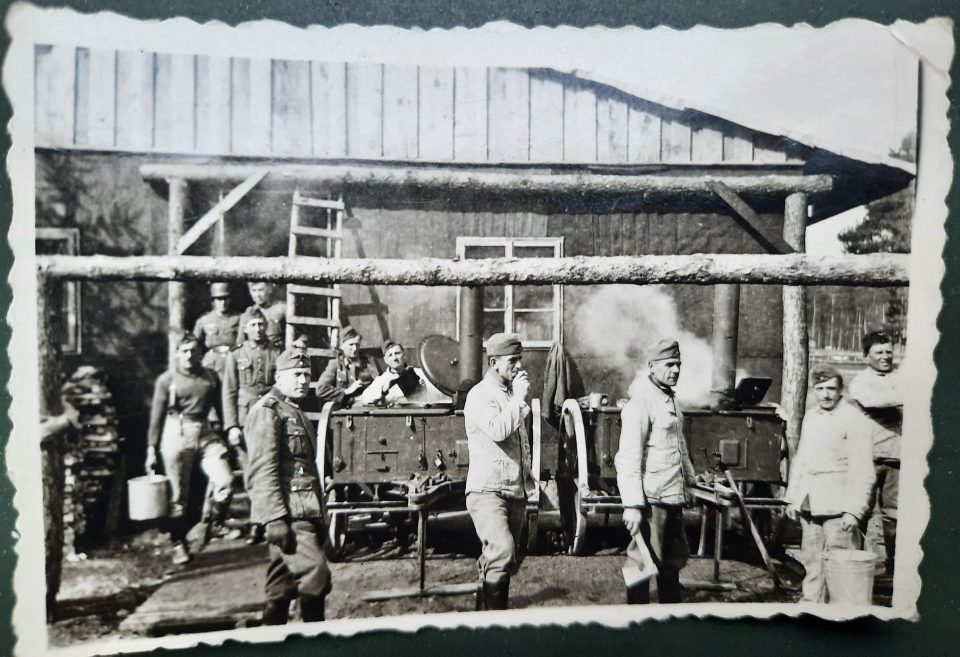
Kitchen in Tomaszow (Toni with the bucket on the left)
After a nice journey into mountainous areas on 22 March they had arrived at their new destination, probably Tomaszow (Toni was not allowed to write the new location). There was still a lot of snow and Toni wrote that in good weather it might be a nice town, bigger than Zanosc. They were quartered outside the city in a run-down barracks and the kitchen was in the open, as one can see in the photo above, which was really uncomfortable in cold weather. As they were the last ones to arrive 60 men had to squeeze into a very small dormitory, “You need a shoehorn to get into your bed”. The first night Toni and his friends went to town for some dinner and he saw a beautiful large orthodox church he would visit soon. Toni was full of Schadenfreude because their colonel had inspected their new barracks and had asked for their sergeant, who was on home leave again while the ordinary soldiers had not had furlough for many weeks. The colonel raged and roared and declared that the sergeant was not permitted home leave from now on. So all the comrades were now looking forward to the return of the sergeant.
Sunshine alternated with snow storm now and when on Sunday the weather was nice, Toni went with Pauli and Pepi to town to take some photos. There had been severe fights and they saw many ruins on the main square, for instance a big and probably beautiful temple had collapsed. (Tomaszow had a large Jewish community, too, which was completely wiped out. The extermination camp Belzec was established nearby in the years 1941/42.) When a snow storm was approaching, they fled into a small café where they had some cakes and coffee. But Toni would not go to town again soon because they got so little pay that they could not afford anything anyway. Meanwhile another furlough ban had been pronounced. As he had no chance to do the washing at home, he told Lola that now he had pink underpants because his red shirt had coloured them during his laundry experiments. He also had to mend his socks, which was a pain in the neck because the holes were already so large.
On 27 March Toni informed Lola that he had finally got away from the kitchen, where he could not make any friends as the whole personnel was Czech speakers from the “Sudetenland” and they could not understand each other. He was glad to be back with the troop cutting wood in the forest. The army’s plan was to cut down 40,000 trees. The trees were cut into 3-m long logs, which had to be carried to the road as Toni’s sapper group was building a road of logwood. They had to carry the logs 20 minutes across snow and mud to the road. Unfortunately they were kept short of bread: one loaf per day for three men, which was not enough if you had to do such hard labour. Toni was given an extra mission together with Karl; procuring 250m³ lumber “from somewhere”. He liked such special missions because, “You have no work, get prestige and the days pass by more quickly”. As they could not find anyone who sold wood in the vicinity, they went by bike to a saw mill in Tarnastowa, where Toni negotiated an exchange of tree trunks for logs and they had to supervise the felling of timber and the transport. “You can imagine what the local people think of us. We are felling their most beautiful trees and then let two thirds of the timber rot in the wood. If we had this left over wood, we could heat our stove for years!” They transported the timber on horse-drawn carts, which was tiresome because they and the horses got stuck in the mud most of the time in the rainy season. Their 2nd division was praised by the head of the division for their construction work, but Toni commented that that was cheap for the officers; he would have preferred an extra ration of cigarettes instead. According to Toni, the scandal was that they had found out that the officers were all staying in seven villas whereas the soldiers were squeezed into rabbit holes.
He begged Lola to send him razor blades and socks, which were all used up and not to be had in Poland. Toni had already made contact to the cart drivers and the farmers in the area. He had provided them with tobacco, so they brought him raw and boiled eggs in return. In their breaks from work in the forest a farmer offered Toni and Karl some bacon and bread filled with cherries, which tasted wonderful. They had eaten in the canteen of the saw mill and the farmer had taken them back to the barracks in his cart. The next day they would visit him after work in his home which was 6 km from their barracks. The farmstead was difficult to find, but in the end they managed and had a nice evening at the farmer’s with eggs and bread filled with cabbage. The farmer’s cousin then took them to his house, where he played some music on his harmonica. He finally guided them back to the barracks in the dark, which was quite tiresome because they had to manage 6 km in 40 minutes in the pitch dark and arrived ten minutes to ten at the barracks, just in time! To Toni’s surprise the official praise had earned them a ration of 3,976 cigarettes, which would mean 18 for every soldier, but he did not believe it until he held the cigarettes in his hands. He had seen some nice pots and pans in town; a 2-litre pot for only 6-8 zloty and he asked Lola, whether he should buy some to take home if he finally got furlough in the middle of April. Toni was now with the road works group, which was not tough work; there was a lot of resting and leaning on their shovels, but as they were too far from their barracks, they had a cold lunch and finished earlier, at 3.30 pm. At the beginning of April they had already constructed 2 km of that road. They also worked Sunday mornings now, but they had the afternoon off. Then Toni went to town with his friends for dinner and as they were always so hungry, they had to go to one restaurant after the other to get their fill of “Wiener Schnitzel” and other delicacies and of course beer because a single restaurant could not provide so many meals.
On 8 April 1941 they had another return of winter. While working on the road a storm came up which was quickly followed by sleet. Within a short time all the soldiers were covered in ice and their clothing was white and cracked when they moved. It was Toni’s task to feed two big fires and construct a windshield. By the time they had stopped working there was again a layer of 5 cm of snow. In the barracks it was freezing cold and they lay in bed with all the clothing they had. The following morning they were waiting at the road works until the officers decided that it was impossible to work under these weather conditions, so they returned to the barracks and received their extra ration of cigarettes, distributed according to merit 5-19 cigarettes per soldier; Toni was amused that he received 19 and sent Lola the wrapping in the national colours of Bulgaria (a Nazi German ally), which read “The thankful Bulgaria” and was a present from Bulgaria:
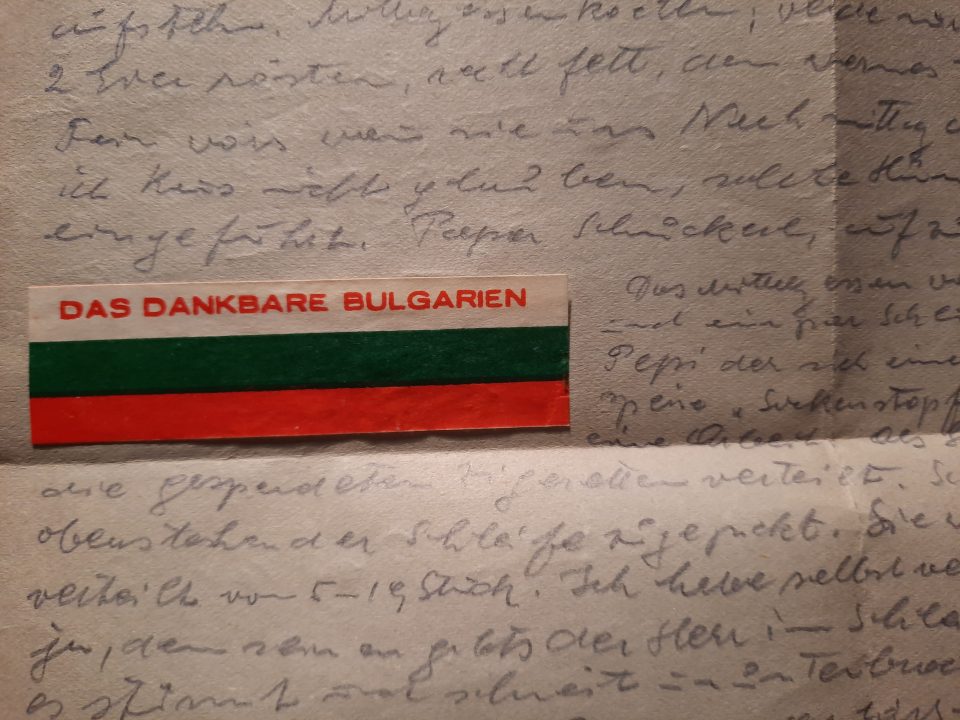
The next day there was again a large amount of snow which prevented them from working on the road, but they were to be transferred anyway in the near future, so they were ordered to pack their suitcases and send them home because they could not take the suitcases with them to their next destination. Toni was overjoyed that now he could send Lola everything that he had so far saved for her and which would help her in Vienna to improve their diet and to sell what she did not use herself to make some money. To Toni’s great regret sending parcels home privately was no longer allowed. Furthermore he had not received any mail from Lola for several days and was therefore panicky, “Wenn nur der Dreckskrieg endlich aus wäre” (If only that dirty war were finally ended!) They had two days off at Easter, but their parcels from home with the Easter cakes had not arrived yet and all the restaurants were closed, so no holiday mood could come up. What’s more they were continually packing and unpacking because their transfer was again and again postponed.
When the post finally arrived, Toni was glad to hear that Lola had received six of the eight tins of lard he had sent her, but there were still six parcels from Lola missing. Karl had received a letter from his firm that they had asked the army for his transfer because they needed him in the enterprise. Toni wrote that his firm could have done that by now, too, but they unfortunately had not made the effort to get him “u.k.” status yet (deferred from military service due to indispensability). Nevertheless no one among Karl’s friends was envious. They were all glad for Karl, if it worked out well for him. Easter Monday was a day off and Toni and Karl stayed in bed longer, a nice comrade brought them some coffee, which they improved with condensed milk, and they ate the “Mohnstrudel” (a traditional sweet dish made with a poppy seed filling), which Karl had received from home. When Pauli came, they all sat in bed and they wallowed in memories of the hiking tours they had done. To their great pleasure they found out that they had done nearly the same hiking tours to the “Gesäuse” and to the “Totes Gebirge” (in the Austrian Alps), which Toni had enjoyed so much with Lola. But their lunch was not a festive one: “Wehrmachtsuppe” (army soup), rice and tins; and for dinner tins again. He told Lola to give one tin of lard to the “old ones” and send them his best wishes for Easter. He was writing separately to Herta. He wanted to send all relatives Easter greeting cards, but unfortunately they were all sold out. He had only managed to get the one he sent to Lola and Herta. The evening he spent with Pepi in the canteen, where they were warmly welcomed by comrades from Pommern and Braunschweig in Germany, who asked them to sing Viennese songs to the harmonica. They all drank a little too much rum, as there was no beer! This rarely happened nowadays, Toni said, but he had not seen Lola for 17 weeks, so he was in for some consolation.
As they had not been transferred yet and had no work really, they were sent to the woods every day and once Toni saw Karl walking on the road they had constructed towards him with a live cock under his arm. He had just bought it from a farmer’s wife for 5 zloty. Toni slaughtered and plucked it in the forest and then he roasted it in the kitchen. They enjoyed an excellent meal, even if it was procured under rustic conditions. He informed Lola that not just his teeth, but also those of his friends were rotting due to the unhealthy diet, but there was no possibility to get their teeth fixed in the army, “there are only butchers”. The next day they were lucky again because Toni was to procure Polish carts for the transport of wood from the woods onto the road they had just built, which was a nice job because as soon as he had manged to get five carts the workers loaded the trunks on the carts and he just had to supervise the loading. Karl had managed to purchase 30 eggs from a farmer, so Toni made some nice omelettes for lunch. They had also bought a small barrel of beer and Toni was appointed cashier. They were celebrating because a new group of sappers had moved in, mostly “Ostmärker” (Austrians) and their dormitory was separated by wooden planks half way up the outer walls. As all the tables were full of card players, the others were sitting on top of the separation wall and chatting with the newcomers, “like roosting chicken”. On 19 April the road was finally completed and they were only too glad after seven hours in heavy rain and “for food only tins, tins and once more tins.” Toni said, “I think I will come home as a tin”. They, the sappers, were always doing the work the others did not want to do, which explains the nick name of their division, “company ants”. They also had a nick name for the Germans from Czechoslovakian “Sudetenland”, called “Protektoratsdeutsche” by the Nazis, namely “Nordbahnsteirer” (Styrians from the Northern railway line), which made them seriously angry. It was clear that the cold and wet weather in Poland was really getting on the nerves of the whole division.
On 20 April the army was celebrating Adolf Hitler’s birthday with a parade and music. Toni and his friends left as soon as it was possible and went to town, but as there was not anything going on, they marched across the countryside, enjoyed the sunshine and watched the majestic storks which were coming to this area to breed, when suddenly another rain storm approached. After wading through marshland they found refuge in the house of a Ukrainian family who was celebrating the orthodox Easter feast and offered them cakes. There they had to pour the rainwater out of their boots. When the sun came out again they continued their excursion and reached a small village, where in groups of two they managed to purchase some dinner in different restaurants; none had enough for all six of them.
Finally, on 23 April Toni was writing from the train which was taking their platoon to the next destination. They had already been 24 hours on the train and had only managed to make 100 km to Rejowiec. Then they stopped at Lublin and Toni hoped that they would be able to buy some cigarettes. They needed two days for approximately 350 km. They finally arrived in Skarzysko-Kamienna on 24 April and found temporary accommodation 18 km outside the town in an old watch tower. Toni described the area as “much nicer than before”. They had a room for 16 men and had already furnished it adequately. Toni was overjoyed that their mail was already waiting for them because before the post had often been delayed and the parcels were sometimes in an abysmal condition when they arrived. He wrote that 85% of the population were Polish Jews in this town, but most of them understood German. Also here everything was very expensive. They had gone sightseeing in town and taken some photos. Later they moved into the town hall of Skarzysko, which was really nice and cosy. Skarzysko boasted a beautiful old church and a castle ruin of Prince Radziwill. The soldiers were ordered to empty the town hall’s archive and dump all the documents through a hole in the floor. Unfortunately “…all the files ended up in a messy heap!” (This report shows that senseless devastation was ordered by Wehrmacht officers as early as 1941.) The soldiers were no longer allowed to go to the inns and restaurants in town, which Toni regretted because the food they received, mostly tins, was not nourishing. Anyway, Toni explained to Lola that it was best not to be noticed in the army, neither in a negative nor in a positive way. This was his tactic for survival, as he was not interested at all in receiving any decorations. (Skarzysko was a strong hold of Polish partisans and the Nazis erected forced labour camps there, where Jews had to work until they were exhausted. In the forests around Skarzysko mass executions of partisans and Jews took place.)
In the end Toni had found a way to circumvent the army’s ban on visiting inns and restaurants. He arranged with one innkeeper that they would sell their food to them through a window in a side alley and put it into their army lunch pail. Then he “elegantly” dined with his friends in the barracks for 3.50 zloty each. For dessert they enjoyed Lola’s cookies. On 27 April their officers announced during the roll call, which usually included information on the success of the war, that only 5% of the division could go on holiday at the same time, which would mean 13 soldiers and that the ban on inns was lifted for three restaurants. Two hours later several men were already completely pissed, Toni wrote. Toni was hoping to come home for 14 days in May and he stressed to Lola that the first evening he wanted to be alone with Lola and Herta; he would chase away any visitors and then he would like to go with them to the “Prater” if the weather was nice. He was so sorry that this time he could not take a lot of food for them with him because there was nothing affordable to purchase in this area of Poland (1kg butter was 20 zloty, 1 chicken 15 zloty, 1 egg 0.50 zloty, 1kg apples 12 zloty). He congratulated Lola on their 9th wedding anniversary and hoped that Lola was celebrating their wedding anniversary alone thinking of him and that they would be able to celebrate the 10th together again. He mentioned that if anyone read their letters they would think they were newly married and not such an “old couple” (“alte Ehekrüppel”).
As there was nothing to do for the sappers at the moment, they were doing sport and fitness training in the morning, which Toni enjoyed, and had lessons afterwards, which included calculating (a big problem for some of the men, Toni wrote) for example, or chemistry, which Toni had always loved, with a focus on explosives, and even singing lessons. Toni was also quite good at history and geography. He complained that their days were so boring, one day like the next; he had already read about 200 of the cheap novels for 20 Pf. and they were all similar. When he was back in Vienna he would like to buy some cheap second hand books for a change. On 30 April they marched with all their heavy equipment to Alexandrow through the mud, which was about 10 km. It had been raining more or less heavily the last days and it was still quite cold. He reported that the people were very poor in this area. Meadows, fields and streets were under water. The houses often looked like islands in a lake and the earth was sandy and not fertile at all, which you could see as soon as the water receded. The whole afternoon after the march they spent cleaning their clothes, boots and their weapons. But in front of the barracks a long queue of boys was always waiting and they would clean the boots for 1 cigarette or one piece of bread. On market day Toni had a look at what was on offer, but it was very little and too expensive anyway.
On the 1st of May there was a festive roll call, but Toni wrote it was “complete rubbish”. The soldiers were all spick and span, but the officers did not know the commands themselves, so the drills did not work out properly. When the officers were finally satisfied – “and to be honest, it was still all wrong” – the sergeant held a one-hour speech about France and Norway etc., topics which they had already heard 20 times – “I think not one man in the division was interested in it”. That was the end of the festivity. Then they had to queue for 45 minutes in front of the kitchen for the festive meal, which was “Wehrmachtsuppe”, roast pork and sauerkraut. Then Toni and his friends went sightseeing in town and took photos of the town hall, the church and the castle with a beautiful stone crest of Prince Radziwill of 629. Toni was shocked under which conditions the people in the old town had to live. Then they visited a huge stone mason on the outskirts where mostly women produced whetstones and window sills. They earned very little and all had sore hands from working the sharp stones.
On 4 May Toni wrote that his request to be transferred to the reserve army had been granted that day to his great joy. At the moment the reserve army was no longer in Vienna, where he had been at the Vienna Arsenal from February until June 1940, but near Preßburg (Bratislava) on the Danube, so he would be near Vienna. He hoped he had not made a serious mistake and he warned Lola that nothing was ever sure in the army and they would have to wait for the confirmation as this transfer had been communicated by phone only. He told her that three medals had been awarded that day, two of them to Czechs “in a German division”, he joked, “and everyone knows they haven’t achieved much!” (They must have been excellent NSDAP party members) The ceremony can be seen on the photos below:
Szydlowiec: A training march to Aleksandrow and the awarding of medals on 4 May 1941
Now the sappers had a new project: they were building a large garage for cars and a road to the building; work which Toni much preferred to the daily drills. But lunch, where they were constructing the building and the road, was terrible: every day “Eintopf” (German stew) and cabbage and tins, “Piefke”(German) food, “Very simple and tasteless!” The weather in May was still bad: cold, windy, rain and snow! They were not working very hard, on the contrary! Toni observed a stork’s nest and was fascinated by the fact that the young stork was nearly as big as the mother, but was still fed by its mother who was rushing to and fro with food. The young stork devoured everything quickly and immediately started clacking again.
As Toni had not heard anything about his request to be transferred to the reserve army, he asked his sergeant when he met him alone in the street. He replied that there was no information so far, but a personal contact with the High Command was necessary, not just a telephone conversation. He then asked him whether he had children and whether his wife was a “Volljüdin” (a Jewess) and why he did not get a divorce. Toni told him that he saw no reason for a divorce as he had been married happily for ten years to Lola. Finally the sergeant wanted to know whether Toni wanted to leave the army for good and Toni replied that he felt he had done enough and the sergeant smiled.
Now Toni was part of the team that did the roofing of the garage which was 70 m long and 10 m wide. The job had to be completed within four days by 30 men. Toni liked that kind of work and the officers wanted him to take some photos of the men at work. He had shaved off his moustache, but did not like the aspect, so he started to grow one again and he reassured Lola that he would look as usual again when he finally got home. He still had no news, but he thought that now he had not been home for 21 weeks, so one or two more did not make a huge difference, if only his request were granted. At least he was hoping to go on home leave for 14 days soon and wished Lola a very happy Mother’s Day on 9 May in case he was not home by then or the post was delayed. Unfortunately there was always the threat of a furlough ban. On top of that, in the last roll call on 9 May the officers complained that some men were not properly washed and were astonished when they found out that the last time the men had had a chance to take a bath was in January in Nozdrec. The officer Ruthner told Toni that he thought before autumn there was no chance that his transfer would be granted, but later the sergeant called him into his office and he had to explain the whole matter again. So it seemed the army was at least working on his request. To add to Toni’s desperation, he was still not allowed to go on furlough, while Pepi would leave within the next days. Toni had been denied furlough now for 22 weeks! Yet he would rush to purchase some curd cheese for Pepi to take home to Lola.
On 14 May they surprisingly received the marching orders for the same day. They first took them to Sandomierz and from there to Lublin and then eastward to Rejowiec and Chelm, from where they were moving north through the Wlodawa marshes. But as there was no space for the troops there they were sent back to Chelm. He described the landscape, which was quite beautiful with a lot of water and many storks which lived there like domestic animals. From the train they could see stork’s nests on every third or fourth house and also a beautiful big church in Russian style. They were told by the army that the English government had been toppled and that would mean that they could go home soon. (Here one can see how the soldiers were fed falsehoods about the progress of the war.) During their stop at Chelm they had a chance to have a look at the town, which had seemed nice from a distance, but looked completely dilapidated when you visited it; no proper shops and a large part of the population were Jews. (What Toni saw was the ghetto which the Nazis had established in Chelm in January 1940 and from which the whole Jewish population of Chelm was deported to the nearby extermination camp Sobibor and murdered there.) From there they had to march on foot 30 km until they arrived at their destination at 23.00 at night. They slept in a barn with lots of straw, where he nevertheless rested well. The access to food was much better here. Toni had already procured several eggs and a goose for 15 zloty, which he was roasting outside the barn for his four comrades. He made the most beautiful dumplings from eggs and small pieces of bread and a little brown flour. They enjoyed this festive meal. Toni had heard that they were slaughtering a pig in the vicinity, so he would buy some meat for “Wiener Schnitzel” (3 kg for 4.50 zloty per kg) – one could see that good food was Toni’s highest concern! They smashed the bread crumbs with a wooden club and they ate the “Wiener Schnitzel” with potato salad. Finally also the “cloverleaf of friends” was getting together again as Pepi had returned from Vienna and Pauli from his dental treatment. Toni enjoyed the spring time in nature and being in charge of cooking for his friends. They had even discovered a hedgehog in their barn. On 18 May they felt like something sweet and as there was no sugar to be had and very little flour, Toni decided to make pancakes. Now they had to get their hands on some jam and charming Pauli was successful. The pancakes turned out excellent. They visited a windmill, but there was nothing else to do because they still had not reached their final destination and also did not know where and when that would be. On 19 May they had finally arrived at their destination after a march of 13 km. They were not unhappy in this region because it was an agricultural area, where they could buy milk, eggs and butter easily and of excellent quality and finally it was getting warmer and Toni enjoyed the singing of the birds, especially the nightingales. Unfortunately the region was very wet and as soon as it rained they were stuck in mud again. Furthermore the post took even longer because they were far away from the railway line.
The letter to Lola of 21 May he was writing in the living room of a farmer, where he bought milk and tried to warm up because it was so cold in the barn. He told Lola that if she could come here she might like it and he described the view from the window, “There are green fields everywhere, birch trees with light green new leaves and dark pine trees in between and in the background a forest in all shades of green. The cherry trees are starting to blossom and now and then the sun is coming out. Nice farmhouses are dispersed across the landscape….. I could get to like this place! A family of geese is passing by with four young ones, yellow like yolk. I bought a nice piece of pork of 3 kg for 4 zloty per kg and roasted it for me and my comrades with a nice crunchy crust. We definitely won’t starve here. A comrade managed to make “Mohnnudeln” (a sweet dish of home-made pasta with poppy seeds).” The next town was 3 km from where they were stationed, called Dubienka, and Toni went there with his friends to see what it had to offer. He especially wanted to buy yeast because of his craving for “Germknödel” (yeast dumplings with poppy seeds). They were rather disappointed because it was more a village than a town, but they drank some beer there and on the way back they visited two farm houses where they drank milk and had some nice conversations. Lola had sent him 10 RM with Pepi because his sister Milly still had not sent him any money and Toni was so grateful, but he worried that she might not really be able to spare the money. He very much enjoyed the “Buchtel” and cigarettes she had given to Pepi for him. The evening they spent again at the farmer’s house where they bought butter and milk. 15 men were sitting around the farmer’s table and while Toni was writing the letter a woman was singing Russian folk songs, which was very moving and atmospheric.
The sappers’ tasks were repairing roads in the region, but it was easy work. Toni was lucky because his sergeant liked him and he often received special orders which were completed within two or three hours and the remains of the day he was off duty. Toni, Karl, Pauli and Pepi were in a good mood, enjoying spring time outsid;, Toni wrote, they were already suntanned and had decided to cut their hair. They were getting inoculated and took photos of all of them sitting on the latrine like roosting chicken. Toni had wandered around the region until he had all the ingredients for his favourite “Germknödel”. He finally found a farmer who sold him yeast, flour was only to be had at a flour mill, but there he got it as a gift. Then they all marched two hours across a wonderful forest full of singing birds to purchase a calf for the Sunday roast. The 30 “Germknödel” turned out marvellous, but they ate them with cocoa instead of poppy seeds, which Toni managed to procure for 4 zloty. Even their senior lieutenant praised them. There was no parcel service in this place and the post centre was far away, so one of their comrades had to fetch the mail, usually as a punishment. Toni wrote that if the officers were in a bad mood they often imposed punishments, but he himself had never received one, yet he would not care. He was now cooking for his comrades nearly every day and they enjoyed the luxuries of fresh and tasty food. Toni bought wonderful pork’s liver and cream and cooked “Tiroler Leber” or turned the pig’s heart and liver into an excellent snack. The only drawback in the region was the clouds of mosquitos that attacked them from the swamps as soon as night fell. But spring was wonderful there, especially when it “snowed” white petals from the cherry and sour cherry trees. The apple trees and lilac bushes were already in full bloom, too.
Toni recounted a funny episode: One of the men who boasted about being an excellent marksman went with his gun into the forest without asking the sergeant for permission because actually hunting was forbidden. In fact he sighted a deer and shot at it three times without hitting the deer and when he gave the third shot there was a fourth shot coming from the opposite direction. The two soldiers might have shot each other without ever hitting the deer. The sergeant was furious and Toni composed a satirical song about an excellent marksman together with some others, which they copied and distributed to the great delight of the troop.
On 1 June they moved on to the next barn half a day’s march from the last one. They had to continue with their roadworks even during the Whitsun festive days because they had to profit from the dry weather. Toni had to measure the roads and record the needs for repair, mark the distances on the road and document everything, which was a nice task for him. He went to the next small town in the evening to get the films developed and to purchase something, but in vain; the officers were headquartered there, but Dorchisk was much too small to offer such services. The living conditions there were even worse because there were many people who had been driven out of the Russian zone and resettled there and they were extremely poor. Toni enjoyed the nature and the animals in the marshland. He wrote that Herta would have loved to play with the young foal he had encountered in the fields and there were so many storks, magpies and young crows. They had even considered catching some with the sergeant because young crows were supposed to be a delicacy, but it was too difficult to climb the high pine trees where their nests were. He was on excellent terms with his sergeant and enjoyed chatting with him privately when they measured the roads. Now Toni’s task was to plan and dig a water trench next to the road with several men. He had to hand in his family data for the third time and was at least glad to know that his request for a transfer was still being dealt with.
On 12 June Toni worried because his request had still not been granted after weeks of waiting. Yet surprisingly he was threatened with imprisonment for handing a parcel over to a sergeant to take it home to Lola. He was in no way perturbed because he said he had never in his life been imprisoned, so a few days in an army prison were a new experience. Two days later Toni was transferred to the Danube, where the soldiers were lodging in an inn in Engerau (Petrzalka) on the Danube, which “looked like the Lobau in Vienna”. Toni wrote the last letter that has been preserved on 14 June 1941 from Engerau, in which he reported that he had seen a really good film in town “Was wird hier gespielt” (What do they play here) and at lunchtime they had marched through a nice park with lots of jasmine to the “Adolf Hitler” barracks for duty, but there was nothing much to do. In the afternoon he went to the “American Bar”, which in fact was just a shabby small pub. Afterwards he enjoyed sitting in the garden of an inn with a view towards Preßburg (Bratislava), observing the ship traffic on the Danube. He then watched a football match and went to the cinema again in the evening. They showed “Kampfgeschwader Lützow” (Bomber Wing Lützow), “Well,… it passes the time!”. If he had known they would be near Vienna for such a long time, Lola could have come to visit, as several other wives had already arrived. Monday or Tuesday he was expecting the verdict for “his crime”; maybe he would receive just a reprimand. He hoped that until then his papers for the transfer to the reserve army would have arrived.
On 17 June 1941 Toni’s active service on the front line was ended and he was finally transferred to the reserve army in Vienna “Wien 1 Nord”.
THE HOME FRONT
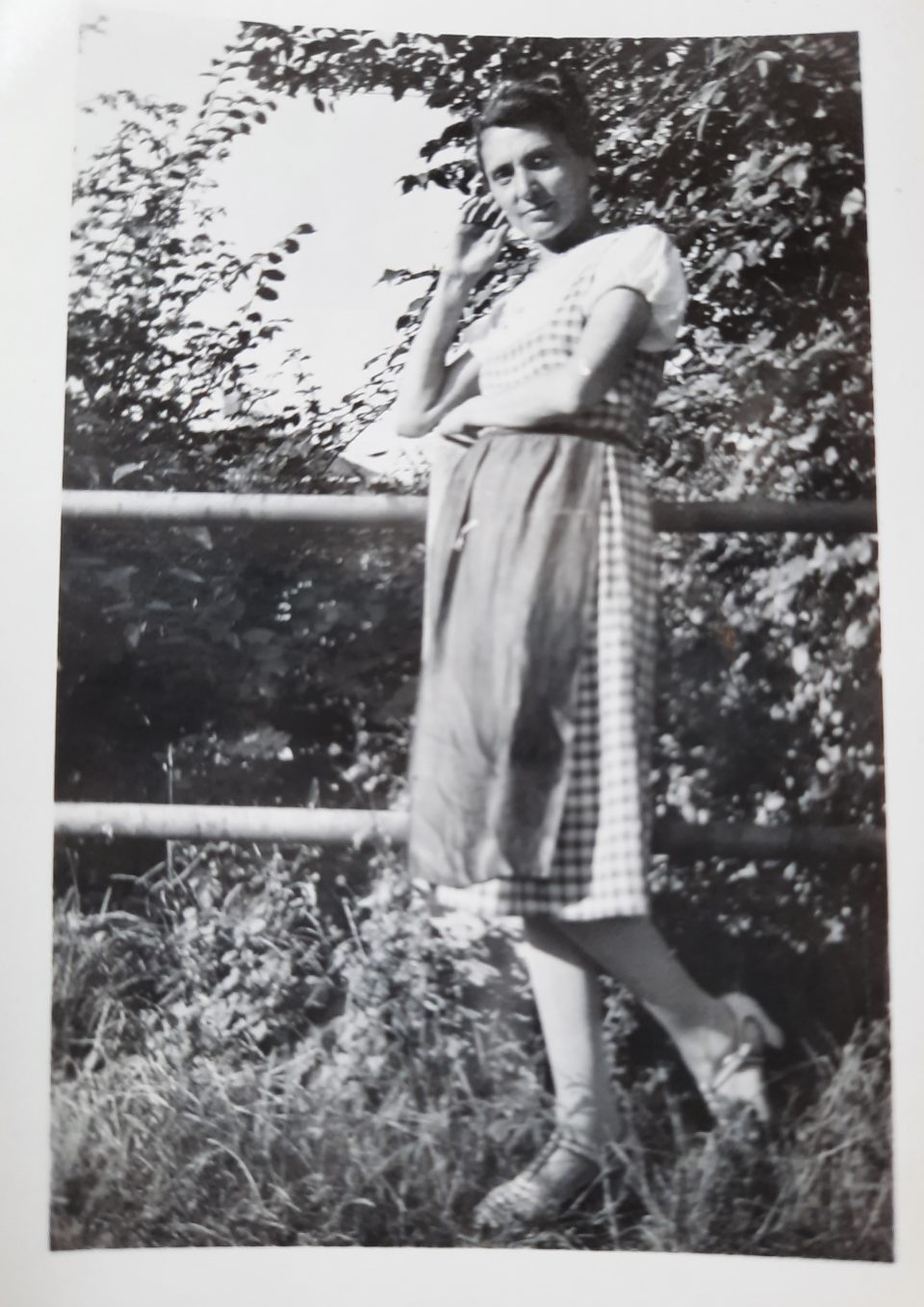
Lola at the start of the war
On 13 September 1940 Toni was overjoyed to receive sweets and cigarettes from Lola and her first letters to Poland. There was nothing that he could buy for her there as he had done in France. He had been looking for a fur coat, but it was much too expensive: 150-200 RM (Reichsmark). He hoped that he would be home soon and Lola should not worry about the official darkening in Vienna at night, which was the same in all of the “Reich”. He assured her that Vienna would not be attacked by bombers because Berlin was much nearer (Toni referred to British bombers). He was very happy about Lola’s postcard from “Schönbrunn” because it told him that she and Herta were going out. Lola should wait with having her hair permed just before he came home, so that he could admire his beautiful wife!
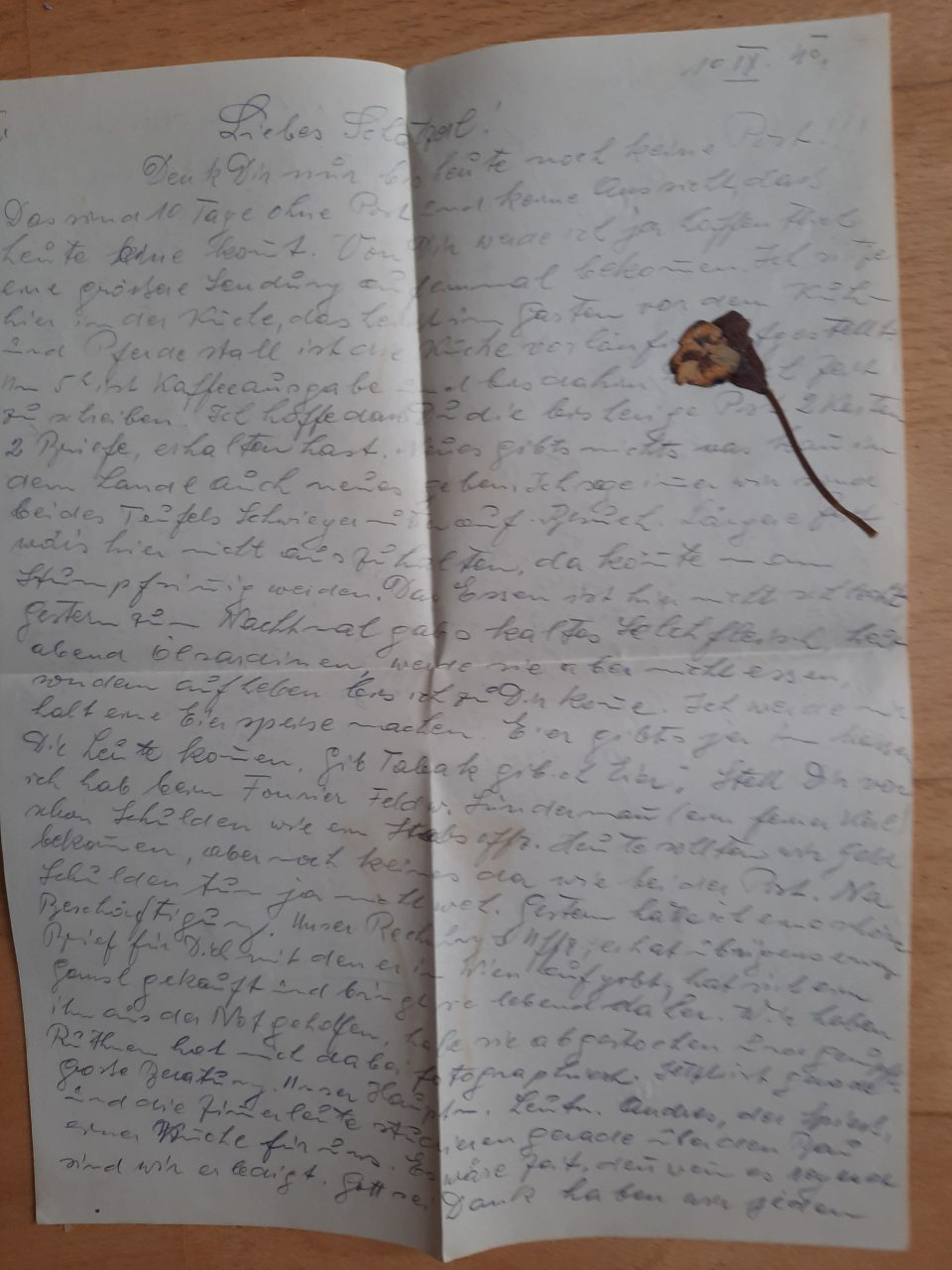
Toni’s letter to Lola of 10 September 1940 with a dried autumn flower
Lola’s letter to Toni in Poland of 15 September has been preserved, where she wrote how shocked she was to hear that her “Beloved Tonerl” was in hospital and she hoped that he had meanwhile recovered from angina and how she thanked him so much for the little flower (see photo above) he had sent her, “Paper is patient, but it is these small things that show me that you love me”. She was writing to him nearly daily and sending him a parcel every three to four days. In the letters she always wrote what was in the parcels, so Toni could check whether everything had arrived. It was such a pity, that he rarely received mail in the place he was in now. She wanted to know whether she could send him some money because she had heard it was now prohibited. She was looking forward to his visit so much and she could not wait for the day when there would be “Vatialarm” again (“Daddy alarm”, when Herta was welcoming her father). They were both leading a very “respectable” life: going to bed early, eating much, so that they would finally put on some weight and Herta was very hard working at school and learning a lot. Then Lola filled Toni in on the family gossip: Milly, Toni’s sister, had given her the winter fur coat of Toni’s deceased mother, which Lola would have made over for her, but Milly had kept the fur collar for herself and had bought a new coat, although she said she had no money. Lola was very angry that she had been slighted by one of the employees of the fish monger where Toni worked. She had telephoned her that she had a fresh carp for Lola and when Lola arrived there to pick it up, she had forgotten to keep it for her (probably to spite her because Lola was a Jewess).
Toni told Lola that his sister Milly had sent him the statements of account of the rent and 8 RM and she would understand everything when he was back home. Toni was always the conciliatory type who tried to avoid conflict (see article part 1 about the inheritance of Toni’s deceased mother, who had disinherited Toni for having married Lola). He advised Lola to get rid of “that woman Rindauer”, who was no good for her because she was the new lover of Milly’s partner Hans. Hans was ok, “We know him; he is after every woman until he gets burnt again”. He was satisfied that Lola was now called to the civil air defence, “At least I’m not in this charade (the Wehrmacht) in vain. I’ve already had more than enough, but I think I will have to endure a little longer for my two little women, so that no one can blame us.” (Toni believed that his being a Wehrmacht soldier would protect his Jewish wife and his daughter.) “You will surely get the winter benefit (“NS Winterhilfe”) again. I can imagine that father (Ignaz) is working hard, especially as he has to work overtime, but it’s good for him because then at least he is left alone.” (Ignaz as a Jew was doing forced labour for “Teerag”, a road construction company, and Toni hoped that by “having a job” his Jewish parents-in-law would no longer be harassed by the Nazis). “Here in P. (Poland) they all (the Jews) have to wear armbands.” Toni complained that so much was stolen from him by this war; he would have loved to see how Herta was happy when they were buying new school things for her at the start of the new school year, “Who is going to give that back to me?” Only two men of the division could go on holiday per day and their corps was always the last one to be granted furlough. He and his friends, Ernstl and Richard, were already deeply depressed. He reminded Lola to go to the fish monger and get the wooden crates from there because winter was approaching (Lola needed the wood for heating). Furthermore Toni was desperate because he had found nothing nice for Herta, but as soon as he was at home she could choose something really lovely which he would buy for her. She should meanwhile think about what she would like to have. He expected he would arrive at the north station in Vienna between 5 and 6 am soon. Then he would hail a taxi home to arrive there more quickly and surprise them in bed.
Toni mused on 18 October that now “Pupperl’s” (Herta’s) “potato holidays were over and she had to get up in the morning and go to school again. He was missing them both already tremendously, although he had been there in Poland for one week only after his home leave. He wanted to know whether Lola had already tried the new stove, which Turl had repaired, and hoped that it was working well. Lola should go to a very good dressmaker to have her winter coat sewn. It would be a pity if it was ruined because he did not trust her old seamstress. She could spend 50-60 RM and he would send her the money. She should just check whether she could exchange Polish zloty at the bank. Later he told Lola to have the tailor attach a fox collar to her winter coat, which would look very nice and suit her. He wanted to have a beautiful wife when he returned in winter! Toni was worried that Lola would not get her new winter coat in time and freeze during the cold season. He told her to pickle 20 of the 30 eggs he had sent her with Pauli, so that they could eat them in winter when rations were scarce. Additionally he was asking about Ignaz, if he was still foreman at the road construction company Teerag. (Ignaz was already 68 years of age at that time and had been the manager of the brewery in Kaiser Ebersdorf near Vienna before.) Toni further told Lola to find out what it would cost if they had gas installed in their flat in Mariahilf. It would make life easier for her and he would try and raise the money for it, “it can’t cost a fortune!” They should grab the chance, it would be really important. Later he thanked his in-laws for the cigarettes and wanted to know why Ignaz had now been transferred to Neunkirchen (south of Vienna) and what he was doing there. He hoped that he was lucky again with the new job.
On 24 October Toni instructed Lola how to heat the stove: she should start with coal and then add charcoal. Then she should wait a little, add more charcoal and close the oven. If it still did not work out, she should tell Turl to have a look at the stove again. He was worried that she did not get enough coal for the five ration points she was entitled to (Jews received much lower rations of everything). He then asked Lola whether Turl and Hans had already been paid the costs for the reparation. He advised her to go to the cinema often, enjoy it and think of him because they did not have any cinemas in Poland. He urged Lola not to send him chocolate, but to eat it with Herta, as they did not have anything themselves. He was so happy to receive her 60 “Drama” and “Sport” cigarettes, but in future she should pack smaller quantities because they might be lost and that would be a shame. On 8 November Toni urged Lola again to have the gas installed because he could help her with that when he came on home leave. It would make her life easier and he would somehow procure the money for it. He worried that she would freeze in winter because her stove still did not work properly and she still had not had her winter coat adapted.
Toni was hoping to be permitted a rehab furlough after his operation and was already trying to procure some food to bring to Vienna, such as lard, 3 kg smoked bacon or poppy seeds. Toni also bought 11 kg of ham for 55 RM, which he planned to bring to Vienna, where they could sell part of it because it was too much for them. Furthermore he planned to take 30-50 eggs with him. He was sure Ignaz would know people who wanted to buy food from them. They needed the money because they had to have the chimney repaired and the flat painted, which he was sure Meier would do gladly for Lola, especially as Toni had been in the army for such a long time already. Lola had already talked to his boss Hofbauer and they hoped he could get the permission to get Toni back to Vienna. For now he hoped at least for an extra furlough of seven days at Christmas – in vain. He told Lola that she was his “problem child” because she was not looking after her health and he was urging her to get her lungs X-rayed soon because he was so worried about her physical condition.
When Toni heard that there was snow in Vienna after New Year, he hoped that the stove was now finally working properly and they were not freezing. He advised Lola to go sleighing with Herta regularly because it was important for their health to be out in the open air and to eat as much as possible. He hoped Lola would receive all the provisions he had sent her from Poland because he was not sure whether the food rationing worked smoothly in Vienna. He thought that Herta was not looking forward to returning to school soon, but it was important for her to learn as much as possible for her later career. (This was good advice from Toni, who had been a not too keen pupil himself!)
Toni was continuously trying to provide his family with food from Poland. Whenever possible he sent sausages, ham, lard or meat to Lola with comrades who were going on furlough to Vienna. On 7 January 1941 he wrote, “I’m so glad you received the parcel with the meat. It is really excellent and it will keep some time. So please eat it with Herta and don’t give it away. This will make life a bit easier for you. Kastel should already be in Vienna, too, with a parcel for you. Tonight I will buy approximately 10 kg of bacon. But I think, lard is most important, so I will fill a tin for you. What do you think?” In his letter of 9 January Toni instructed Lola, “If anyone harasses you, go immediately to the High Command in Vienna and most of all, let me know instantly, so that I can do something from my division in Poland. I don’t think that they will trouble you, but if they do, then don’t put up with everything and most of all inform me immediately via telegram. And do have your hair permed. As soon as you have the money, do it!!” He was glad to hear that she loved him so dearly and thought of him so often, which was a bit of consolation for him. Furthermore he was glad to hear that his company (the fish monger) was providing her with some food and helping her; he would not have thought them capable of so much support.
Toni thanked the “oldies” (Ignaz and Ritschi) for their nice letter and he was really sad that Ignaz had been dismissed and he consoled Lola, “You mustn’t give up hope; everything will certainly get better!” (How tragically mistaken Toni was!) He promised that they would celebrate the missed New Year’s Eve festivity together all alone on his next home leave with a bottle of sparkling, whatever it may cost. He had detested the binge drinking at the barracks on New Year’s Eve. On 20 January Toni was so relieved to have news from Lola and most of all that she was not having any problems any more with their flat (Jewish tenants were evicted from their flats in Vienna at that time), “which I had not expected anyway.” (Toni was sure that the fact that Lola was married to an “Aryan” and that he was in active service in the Wehrmacht would protect her) He further told Lola to look for a gas stove; they were advertising used ones in the newspapers, because when he was home he would sort out the installation of gas in the flat and also raise the money for it. He would be able to sell the ham and the lard and what’s more their holiday pay was raised to 1.80 zloty per day. He asked Lola for a new photo because he wanted to know how beautiful she was with the permed hair and the new winter coat. He was so sorry, but for the moment he could not send her any money as he had spent all on ham to smoke and unfortunately he needed 2 zloty a day for cigarettes. He was already wondering how he would carry all the provisions he had stored for her to Zamosc, their next destination.
In his letters Toni worried constantly about the health condition of Lola and Herta and that they did not eat enough. He wanted Lola to take Herta to a specialist for a check-up. What’s more he was anxious that they were freezing, too, and urged Lola to apply for the shoe ration. (It seemed that the Nazi authorities wanted to deny Lola the shoe coupon.) Toni told her to apply again and if they refused to issue her the shoe coupon once again, she should inform him immediately and he would complain at the Wehrmacht High Command and tell them that this was unacceptable. On his next home leave he wanted to take them both to a photographer because he wanted to have a really nice photo of Lola and Herta to always carry with him. He was hoping to be allowed furlough in the middle of February and he was looking forward to seeing her in her new dress and they could go to the theatre together. He urged her not to borrow any money from Mrs. Havlu because they had to pay it back some time. Most of all, she did not need to send him any more money. Above all, she should go to the doctor’s as she was in so much pain. That’s why he paid for the health insurance, just for such emergencies.
On 9 February Toni was still worried about the health of Lola and Herta because he had not heard from them for some time and he asked Lola if they definitely had enough to eat and if they could buy some pork meat and if she could get some fish from his fish monger. He further enquired about his parents-in-law, whether they were in trouble with their flat. (This reference points to the final evictions of the last Jews from their flats by the Viennese Nazis). On 15 February Toni wrote to Lola, “Tell me, Pipilein (beloved one), why don’t you write more in detail about the parents? I now receive all letters and you can write in measured words. One can always report facts, and I’m so interested in their fate.” (Lola apparently did not dare to write Toni about the imminent deportation of Ignaz and Ritschi – see article on “Nazi Collective Camps in Vienna”). Lola had told him about the amounts of snow in Vienna that February, which had created a traffic chaos, but had filled little Herta with joy. Toni was astonished that Pepi had already received the second parcel with sweets since Christmas from their local Wehrmacht group in Vienna, whereas Toni had received nothing so far, although he would be entitled to the same benefits. (It seems that these were further signs that they disadvantaged Toni because he did not divorce his Jewish wife). On 15 February Toni asked Lola whether she had already found out who had written “bad woman” on the door of their flat! (Lola never talked about this slights of neighbours after the war. Was she ashamed? She only recounted the funny and grotesque incidents. Just once she said to me, “They have no idea!”, when her sisters, Käthe and Mitzi, who had had to emigrate, told her that she had been lucky because she could remain in Vienna.)
On 17 February Toni wrote that he hoped Lola would tell him soon, what was happening with her parents and that he was so sorry for them and did not know what could be done. “Unfortunately we cannot help them, only try to comfort them.” He told Lola to go out a little and have some fun to distract her. She should not sit at home all the time and he was glad she liked ice-skating with Herta. She should just be a good girl! He also went out and was always true to her. He told her to send his best wishes to Karl and Mitzi, when she was writing to them in Bolivia because he was often thinking of them. (Lola’s sister Mitzi had to flee together with her husband Karl from Vienna to Bolivia – see article “Austrians in Exile in Bolivia”.) Toni told Lola she should console their parents and should not get too excited, “To tell you the truth, I have been expecting something like that for some time and it’s not the worst. In spring everything improves and it is not as bad here (in Poland) as people think. I have been here for half a year and know the region a little. You have to work here or in any other place. At the construction site lots of them (Jews) work and if they do their work properly, nothing happens to them.” (Probably Ignaz and Ritschi thought they would be deported to Poland and it seems that even Toni as a soldier of the Wehrmacht did not understand the true dimension of the persecution of the Jews by the Nazis in Poland.)
Obviously, Lola had chatted with Pepi’s wife and told her that Pauli was having a love affair in Poland. This information was somehow passed on to Pauli’s wife and she wrote to her husband what they were doing there in the evening. Toni urged Lola not to be such a chatterbox. All the news he wrote to her were confidential and now he was in an embarrassing situation with his friends because they could guess who had spilled the news about Pauli and his love affair. Toni warned her that it was forbidden to write home anything about comrades and furthermore severe punishments were imposed if such information was leaked. So she should never do that again, otherwise he would be in trouble! On 25 February he stressed again that Lola should not stay at home all the time and have a little fun. He trusted her and she need not be afraid that he would be unfaithful. It seemed like a probation period for their marriage. Yet their marriage had weathered many storms and it was strong and resilient; no one and nothing could tear them apart. Unfortunately many marriages broke up under the conditions of war. He was glad that now he received a letter of her nearly daily, but they were so short and just a list of events. He asked her to write more about her thoughts and feelings, so that he could be with her in his mind. Toni advised Lola not to be in distress and not to be afraid; as long as he was in the army “they can’t make difficulties for you and when I come home, I’ll check everything.” He told her not to worry too much about the destiny of her parents, “… one has to have a little hope and everything might still turn out fine. So far they had been lucky, so don’t give up hope!”
Toni was very proud of his daughter Herta, who wrote letters to him and was doing fine at school. It was such a pity that the children had no fun in these times, not even during the carnival season. There were no parties or celebrations for the adults, but to deprive the children, too, was unfair. Toni worried that Lola could not make ends meet. When he sent her two tins of lard he told her to put the money she got for them aside immediately and use it to get her coat from the pawnbroker and maybe later her golden bracelet. For the rest of the money she should pay the dressmaker to make her a summer dress from the silk he had sent her from France and turn her light coat into one for Herta and buy shoes for herself. She should take care that the money was not used for everyday necessities but for special purchases. He was sorry that he had to tell her that, but he hoped she would understand. If they both, Lola and Herta, had a coat each and Lola new shoes, they would not have to worry about these issues any more. At the moment he himself did not need anything!
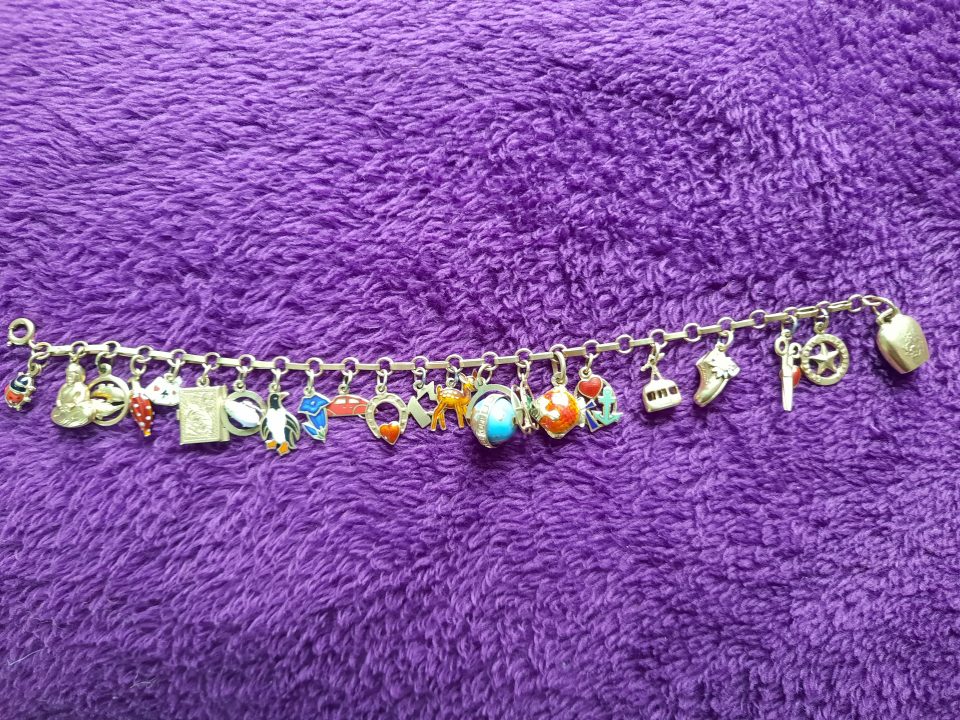
Lola obviously managed to get her golden bracelet back from the pawnbroker, but most of the little pendants of this “Bettelarmband” (beggar’s bracelet) were added after the war
When he came home on leave they would look for some summer dresses for Lola. In the kitchen Toni had the chance to prepare some lard in tins to send home to Lola because Herta loved her bread with lard; she hated bread with the available rancid butter. What Lola did not need she could sell. Toni tried to soothe Lola and told her that nothing would happen to the “old ones” – “there is still a God in heaven!” and he told her that the “Germknödel” of “Mama” (Lola’s mother, Ritschi) were the best in the world and much better than the ones they got at the army, but unfortunately they could not be sent in a parcel like Lola’s wonderful cakes and cookies. Nevertheless he had sent her 1 kg of poppy seeds in a parcel so that she could have the “Germknödel” with poppy seeds and think of him. He told her about a poor boy (a Jew) who worked for them in the kitchen and brought in the water from the well, which was hard work. He did not get paid, but received some food from them. Toni always gave him cigarettes and the boy was so happy because all of them in the kitchen treated him nicely. He had a family and in that way was able to get his hands on some food. On 19 March Toni commented on Lola’s news that “the old ones”, Ignaz and Ritschi, could maybe join Karl and Mitzi in Bolivia, which would be a great luck for them. (So in March 1941 there was still some hope of emigration for the old couple. Unfortunately they did not make it to Bolivia in time and were deported to the concentration camp Theresienstadt.) He asked Lola who had moved out of the flat of the “old ones” and which new people had moved in with them. (This refers to the fact that the Jewish population of Vienna was evicted from one flat after the other and crammed into so-called “collective flats”.) Toni praised Lola how courageous and quick-witted she had become within one year because a year ago she would just have despaired in situations like the ones she had to manage now. Toni was in fear that Lola was sick and did not tell him the truth about her lung problems. He urged her again and again to go to the doctor and to eat more. She should not deprive herself and Herta of food and sweets which she sent to him because, though he was a sweet tooth and they lacked sweet dishes in the army, they had enough to eat.
Furthermore he begged Lola to see to it that Herta learned well at school because that was so important for her later life and he was a bit concerned because she made so many spelling mistakes in her letters to him. Once Lola told him that they had overslept and Herta did not go to school that day. Toni was not amused at all and advised her to send Herta to school even if she was late the next time and write a letter to the teacher for her.
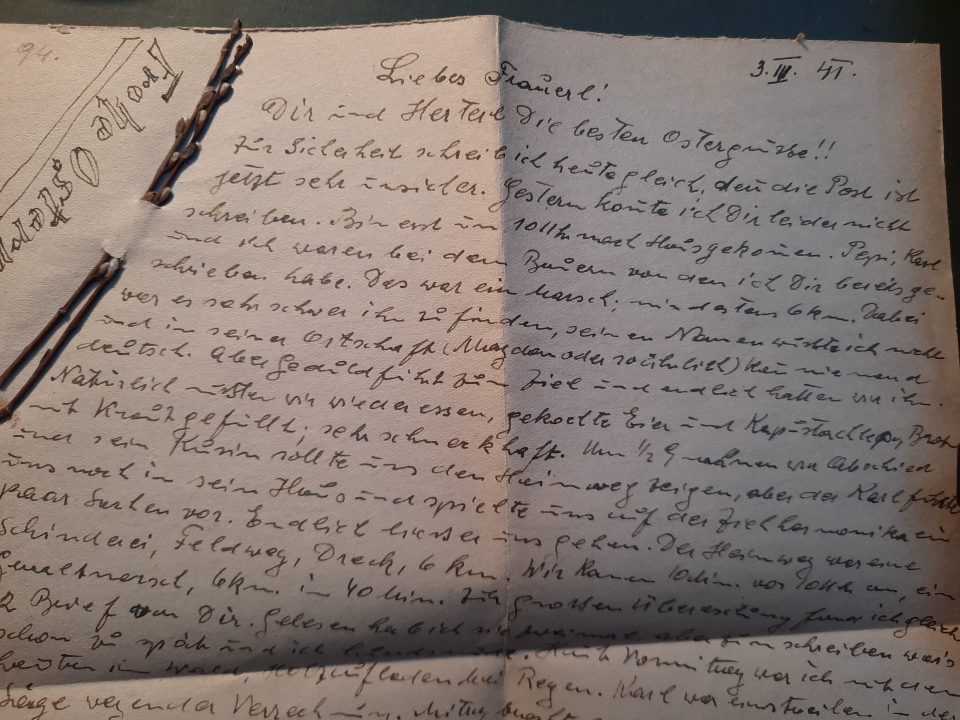
Easter greetings from Toni
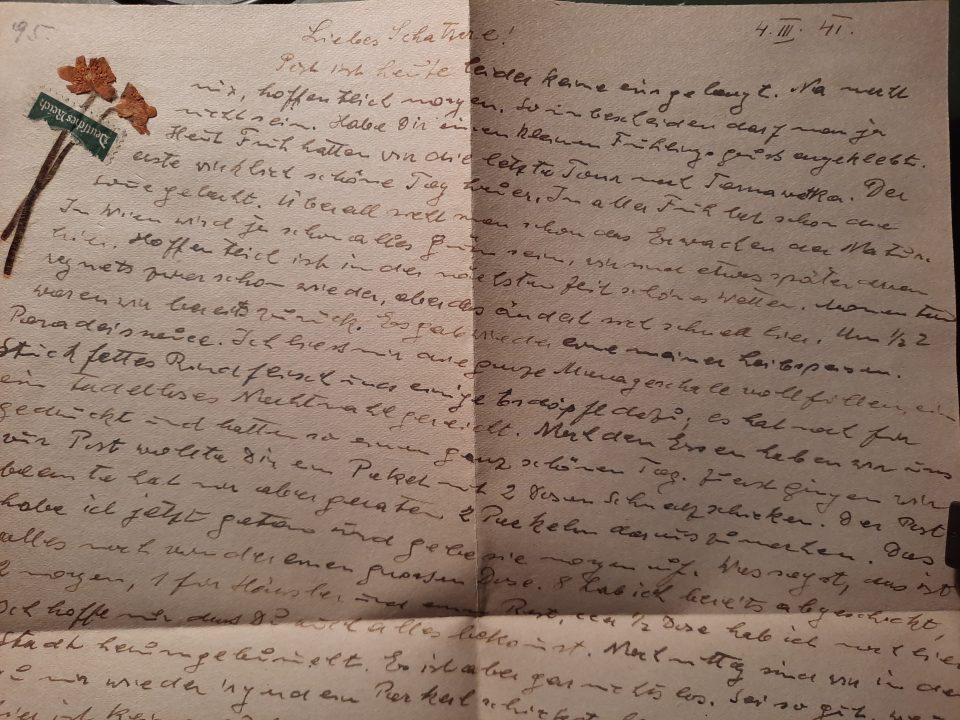
The first spring flowers from Poland
On 3 April Toni sent his best wishes for Easter to Lola and Herta, but he was quite desperate because Lola’s last letters had sounded really strange and he had urged her to tell him frankly, what was really going on. He found out that both of them were sick and that Lola had serious pulmonary troubles, but did not dare to go to the doctor’s. Most of all she had been told that she had to leave their flat. Toni was furious and ordered her to give him all the details, because he would intervene at the highest authorities because it was unacceptable that the lives of his wife and daughter were threatened while he was serving in the army. She should act immediately and if necessary telegraph the details to him. They were not completely defenceless, he wrote. He needed to know which institution or office was involved in order to protect her. “Have no fear; if only I could be with you!” he wrote. He reassured her that he loved her immensely and nothing could destroy their love of ten years and their marriage and nothing could tear them apart; she should never doubt that for a minute. (The Nazis were putting a lot of pressure on “Aryan” husbands to divorce their wives, who would then be deported to concentration camps immediately – see article on “Mixed Marriages and Mixed-Race Children”)
Easter greetings from Toni on 7 April 1941
After Easter Toni learned that the eviction of Lola from their flat (and her transfer to a collective camp) had been “false alarm” and he was more than relieved.
On 16 April Toni wrote that he hoped that the “Yugoslav matter” would soon be over because then the danger of air raids over Vienna would be reduced and he did not need to worry so much about Lola and Herta. He said the soldiers in his troop all just wanted to go home. He hoped that she did not have to pay duty on the suitcase he had sent her because he had paid already everything in Poland and the food he had saved from his rations was duty free as these were German goods. The only thing she might have to pay extra duty on was the bag with poppy seeds. If they had to stay on in the army they would rather be transferred to Yugoslavia because they hoped there would be more possibility to purchase things for their families, just as it had been the case in France. Yet he would much prefer to work for his money again, rather than all this sending of parcels, cigarettes and money, which would not be necessary then. He detested the situation he was in – unable to earn the living for his family and himself. He was still waiting for the 5 RM his sister Milly had promised to send him. After weeks without money he was getting disappointed with his sister and he wrote that ”if she doesn’t give you any money, she could at least send me some; it would not hurt her.”.(His sister had inherited most of the possessions of their family – see article on “Viennese Suburban Inns”)
He asked Lola to send his best regards to his employers if she came to Floridsdorf. If the fish monger required him, they could ask for “work leave” for him, which had the best chance of being granted. He was glad that “Papa” (Ignaz) had work again, even if it was tough for him, it was better than “anything else” (meaning: deportation). Toni thought that as long as Ignaz worked hard, “they would not be sent away”, because he still hoped that they could join Karl and Mitzi in Bolivia. He wanted to discuss with Lola in person how they should proceed “in the matter” (meaning: his request for transfer to Vienna) because he was afraid that it could have negative consequences for Lola. (At that time he was still convinced that his being on the military front line would protect his wife.) Toni had talked to the officer Ruthner about “this matter”, who had promised him absolute secrecy. If it was possible for him to be transferred to Vienna without any negative consequences for his family, he would apply. But she would have to understand that he would stay on the front line if in any way he could be blamed for quitting and they would consequently suffer.
On 2 May Toni answered Lola’s letter and wrote that it was a pity that Lola’s sister Agi had still not managed to leave Vienna with the children, Susi and Josi, for England. (see articles on “Kindertransports” and “Viennese Maids in England”) Toni expected that “in the course of the summer the island (Great Britain) would fall and then all the hardships with the children would have been in vain. It’s only Norbert’s fault. I think he will never change! I feel I will see England, too, but don’t worry, not now!” (The sisters Lola, Käthe and Mitzi, were of the opinion that Norbert Katz – see article on “Football in Vienna” -, their fourth sister Agi’s husband, was always much too hesitant when decisions about the destiny of his family had to be made because his career as a footballer was more important to him.)
Toni had asked their friend Turl to take a nice portrait of Lola four weeks ago and he still had not received a proper photo. He was disappointed with his friend because on the photos Lola had sent him her face was in the shadow, only Herta’s photo was really cute. He conceded that he would have to take the photos of Lola himself, as soon as he came home. He so much wanted to bring a present for Herta, but there was nothing to be had in Poland that she might enjoy. He had sent some curd cheese, which was good and cheap in Poland and several tins with Pepi, who was coming to Vienna, but Lola should please smell the tins and not eat them if they looked or smelled strange because they had already had several cases of food poisoning in the division due to rotten tinned food, “So, please, be always careful!” Toni stressed again and again how much he had enjoyed the “Mohnstrudel” she had made from the poppy seeds he had sent her! Toni was worried that Herta was suffering from headaches and nausea now although she was still such a young child. He promised he would take her to a specialist as soon as he was home because there had to be something wrong. (My mother, Herta, suffered from migraines all her life, probably due to the emotional stress she had to experience as a child.)
Surprisingly in a few of his letters Toni commented on Lola’s spelling and grammar and sent her the corrections, so that she could improve her writing style. For example on 9 May 1941 he wrote to her, “Now some words about your spelling: Schau dazu, das…: dass- linking word, OR in essen kannst…: ihn – pronoun…” One can assume that Lola was not very delighted about these comments on her love letters! Toni assessed Herta’s drawing, too, which Lola had sent him and said that it was quite nice, but the child had absolutely no talent for drawing. Yet Lola should not tell her in order not to hurt her. Meanwhile the civil servants in Vienna were researching Toni’s family background and taking their time. Toni wrote to Lola that they seemed to have all the time in the world, nevertheless she should let him know as soon as they found out where his family had originally come from. (The Nazi authorities were drawing up “Ariernachweise” of every citizen – see article “Mixed Marriages and Mixed-Race Children”). Toni was glad that Herta had had such a nice “First Communion” celebration in church in May; he was just sad that it was another family feast that he had missed. Now Whitsun was approaching and he would not be with them once more!
He had not heard anything about his transfer to the reserve army near Vienna for three weeks, but he was still hopeful. He told Lola that she did not need to be in fear about him and his request because the officers, especially his sergeant treated him well, just as before and he felt that the sergeant could understand his situation and would like to be transferred to the reserve army himself. On 30 May the sergeant called Toni and asked him to provide him with all the data of himself and his wife: birth date and place, religion, parents, etc. Toni was on good terms with everyone in the army and most officers appreciated him. He explained to Lola that this was the Wehrmacht and not the party; no one looked down on him or despised him.
In May Toni asked Lola to send him cigarettes – as usual -, but also newspapers, which were difficult to get in Poland. Recently the newspapers they received were not only old, but also censured, which meant they received only a shortened version. Cigarettes could not be bought privately and they only got four each. He calculated if the soldiers smoked at least 20 cigarettes a day like him this meant 5,000 cigarettes daily for the 250 men and 35,000 per week. So it seemed the army was not prepared for this size of demand because now more and more troops were arriving in Poland. (Toni was lucky to be dismissed from active service in the Wehrmacht on 17 June 1941 as “n.z.v.”: “not to be used” due to his Jewish wife, because Hitler’s attack on the Soviet Union started on 22 June 1941.) Unfortunately he was unbearable if he did not have enough to smoke, he wrote. In Poland tobacco had become a means of payment: 1 packet of tobacco for 12-15 eggs and 5 eggs for one orange. In this emergency he even tried to cut open cigars and make cigarettes from them. On the other hand, fresh food was now easily available and he regretted it so much that they could not be with him and enjoy the abundance of food in this area of Poland around Chelm; so much wonderful milk, butter, cream, eggs and meat!
THE EMOTIONAL STATUS
Toni was desperate when in October 1940 he did not receive any letters from Lola for a long time. He did not know what to do and had already tried all options including complaints to the army headquarters. He was especially worried because he was about to be transferred to the hospital and did not know if and how news about Lola and Herta would reach him there. The military surgeon had decided at the end of October that Toni would have to have his teeth done and he would have to be operated on his ankle, too. He would take him in a car to the military hospital in Rzeszow, where he would have to stay for at least eight days. On 23 October Toni asked, whether Lola maybe was already unfaithful to him and that was the reason why she did not write. He was yearning for her and hoped he might get special furlough after the operation. On 24 October Toni was relieved when the first letters from Lola arrived, although some earlier ones were still missing. So it was not her fault, but the fault of the forces’ postal service. He told her that he was quite depressed, but you could not get drunk on beer there. That was too expensive, only on vodka, but now he would refrain from getting pissed because he was so happy to have heard from her. He was already making plans of how to get back to Vienna. He told Lola that after the operation he would see how that had worked out and maybe she could then go to his boss Hofbauer in Vienna and beg him to hand in an application that he required Toni in one of his fish shops because recently they had had several comrades who were called back home because they were required at the home front. It seemed that now was the right time to try and leave the military front line.
Apart from the letters, Toni’s greatest joy was when he received home-made sweets from Lola because he had a sweet tooth. On 25 October he wrote to her, “Such a sweet thing (an apple cake) from my sweet love is something great!” The second cake he would eat on the train journey. Before the operation he could no longer walk properly, so he did not have to work hard. He would have to leave at 4 am the next day because the train from Dynow to the military hospital in Rzeszow would leave at 5.30. Toni was very curious how the operation in the military hospital would work out. It seemed that they would have to stay in this god-forsaken place over winter because they had already received the winter equipment; furs, snow caps, gloves, etc. He would definitely not hurry back to the barracks from the military hospital. Toni explained that he and Fritz, the military paramedic from Kaiserslautern, who had accompanied him to the hospital,l had gone there in vain because when they finally arrived in Rzeszow on Saturday afternoon, they did not accept any patients any more. So after being fed goulash and potatoes in the hospital kitchen, they travelled back to their barracks and on Monday they would do the same journey again. Rzeszow was a nice modern town, Toni wrote, and he would have seen some nice fabric for Lola, but in this region you could not purchase anything without a ration card, which he did not have. Unfortunately the weather was really bad; it had rained cats and dogs for days and there was mud everywhere on their journey. At the stop in Przeworsk he encountered the fanatic Baumgartner from the “Arsenal” in Vienna and he hoped he would not ever meet him again. Baumgartner tried to get away as quickly as possible, too, probably because he had a “bad conscience because of us” (It can be assumed that he had reported Toni to the Nazis because of Lola’s Jewish origin and had tried to make life difficult for him).
Before his operation Toni told his wife from Rzeszow, “I wish the operation were already over. I’m missing you so much. I’m all alone here. I don’t know anybody, mostly Marmeladinger (what the Austrian soldiers called the Germans), not my cup of tea!” From the military hospital Toni wrote to Lola that she should continue to write to him, although he did not receive any mail in the collection point for the sick, but Fritz Lang, who had accompanied him there, would visit him and deliver the letters at the end of the week. “My dearest little puppet!…..What shall I do, Mucki? I’m yearning so much for you!! Do you still love me? Are you thinking of me? Be many times kissed, my lovely, yours Toni”.
On 1 November 1940 Toni wrote from the sickness ward in Rzeszow that it would help if he could just lean on Lola a little and he said, “We are talking a lot here; playing at soldiers might be quite nice for young guys or singles or those who have no qualifications in their private lives. But we old family fathers should be sent home.” Furthermore he advised Lola that she should not take on so much work because, he jokingly admonished her, he did not want to have a totally exhausted and haggard wife at home when he returned. She should really heed his advice and should limit the caring for his sick sister to the necessary minimum, “Yes, yes, there is nothing to laugh about. Remember that! Or I’ll have to „punish“ you!“ In the night the canteen in the collection point celebrated its first anniversary and all the sick soldiers in the dormitory could not sleep due to the terrible noise they were making in the canteen. Unfortunately Toni experienced again problems “with his nerves”, which he unfortunately knew all too well. He mentioned that he would consult a doctor if his depression did not get any better. He suffered from insomnia and was so fed up with the army that he considered running away. “If that goes on much longer, I’ll end up in the round room (lunatic asylum in Vienna) because of incurable depression.” Toni was in anguish because he had not heard from Lola for nearly two weeks and he was not sure whether she and Herta were well and safe. To his great relief on 8 November he finally had a sign of life from Lola.
On 10 November Toni wrote to Lola with a pinch of irony, “I have reserved the tin of sardines for a little dark-haired woman in Vienna. You won’t know her; she is all in all a quite nice girl, but she nags quite a lot. Just imagine for this nasty woman I have already saved six tins!” and he closed the letter, “I’m so glad if I have something to write about because writing letters to you is the occupation I love best as then you are close to me in spirit and I can tell you everything. It would be much, much nicer if you could sit on my lap and I could recount everything to you in between kisses.” For Toni letter writing was consolation; to be able to tell Lola all his thoughts and observations brought him close to her. He did not know whether she was really interested in everything he narrated, but there was nothing sensational to be reported, “Life is like water here; no stone falls into the water and creates no waves.” “Sometimes I dream how we could renovate our flat – make it much nicer by installing gas; I would paint the whole flat and so on!” Several times Toni mentioned in his letters, that if he had to stay on in this place in Poland any longer he would hang himself.
Toni was restlessly waiting for Pauli’s return from Vienna on 7 January 1941 because he hoped to finally get letters from Lola and hear first-hand how they were doing and what was going on at home. He told Lola that he was already a nervous wreck and was in the mood to leave everything behind and run away. It was high time “that the whole sh… would have an end! Nowhere in the world it can be as wonderful as with my Muckerle. I have to think all the time of my beloved and that’s why I can’t like this place.” He worried whether Lola and Herta were both healthy and whether Lola had already received her winter coat. “Look after yourself and see to it that you are both fit. You know, Pupperle, his is my greatest worry; I have only got you two in the world!” When he received the letter and parcel from Pauli on 9 January he wrote to Lola, “Schatzi, why do you send me things that you can’t have yourself? The sweets are lovely, but you have nothing yourself!”
He assured Lola that he was always true and never unfaithful and that he would never betray her and he trusted that she wouldn’t either. They had to trust each other. Why shouldn’t they survive 7 or 8 weeks without infidelity? When they saw each other again it would be like another three-week honeymoon. Tony was suffering a lot emotionally because he was yearning so much for Lola and there was no furlough in sight; the mail took more than a week to arrive in Poland and some letters were lost. He swore her that he was always faithful and never even thought of another woman while other comrades drenched their sorrows in alcohol and in affairs with local women. He was sleeping badly and his friends, Pepi and Pauli, complained that he was tossing and turning in bed at night and grinding his teeth while sleeping. He was so angry because the officers always found a reason for getting special furlough and they even did not have to justify that in front of the crew, but that did not apply to ordinary soldiers.
Toni had made a rudimentary bedside table for himself and asked Lola for a nice photo so that he could look at her in the morning and in the evening and say good morning and good night to her. He had been looking forward to celebrating his birthday with Lola (Toni’s birthday was on the 27th of February), but now he had to stay in Poland. He asked her to toast him and think of him instead. He had been reading another of the cheap novels and at the end he was in such a sentimental mood that he nearly started to cry when thinking of his “two girls” because he had not seen them for ten weeks. Toni was overjoyed when finally another parcel of Lola arrived with cake and cigarettes and fruit. He had been yearning for “his Drama” cigarettes, which were much better than the ones they got from Germany, “R6”. He worried that Lola deprived Herta and herself of the fruit she had sent him. He definitely did not want to take away anything from them as they had so little themselves because fruit and cigarettes were rare in Vienna. He stressed how much he enjoyed Lola’s “Buchteln” (the recipe is included in the article on “Wartime Cooking”) together with his friends. They always shared the content of their parcels; apples, rum for their tea, “Vanillekipferl” (typical Viennese Christmas cookies). This helped to brighten their moods! Toni seemed to be jealous despite his constant confirmation that he trusted into Lola’s faithfulness because on 9 March 1941 he wrote, “Dearest, in the last days you are writing again a lot about Hans????!!!! “(Hans had been a regular at their coffee house, a friend of the family, a womanizer and the partner of Toni’s sister Milly.)
Spring came suddenly at the beginning of April and that aroused in Toni a strong yearning to be back in Vienna with Lola and Herta. He dreamed of going to the “Prater” with them, where Herta could enjoy the merry-go-rounds and they could drink some excellent beer at the restaurant “Walfisch”. He remembered the beautiful walks across meadows and through forests they had experienced together and how they had enjoyed the first spring flowers and the singing of the birds. Toni was so proud of Lola and thankful, too, because she wrote now nearly every day and sent him so many parcels that he feared she was depriving herself and Herta of the treats she sent him, such as oranges, apples, sweets and chocolate and the many cakes and cookies she baked for him. It was such a pity that he could not see the eyes of Herta when she discovered the Easter surprises. He was missing so much. He had already missed Christmas and now Easter as well. So much was stolen from him because he wanted to enjoy the time with his daughter, when she was still young and expressed childish joy over the presents from the “Christ child” and the “Easter bunny”.
When finally the first signs of spring were visible in Poland, Toni thought how wonderful it would be now in Vienna when the lilac, his favourite plant, was in bloom and how nice it would be to have again a bunch of spring flowers in a vase on the table. He urged Lola not to go out at night too often and to go to bed earlier because that was better for her health, but he knew that she would be angry when she read that, “In my mind’s eye I can see the angry flashes in your eyes and I can smell the poisonous vapour!” What a pity that he could not be with them, when she went to the Prater with Herta, who enjoyed the fun fair so much. Toni was really getting desperate when he had not been on home leave for more than five months and his request for transfer to the reserve army had not been handled for weeks. What’s more his post was 10 days late, too. As a consolation Toni sent some spring flowers to Lola in his letter of 13 May 1941:
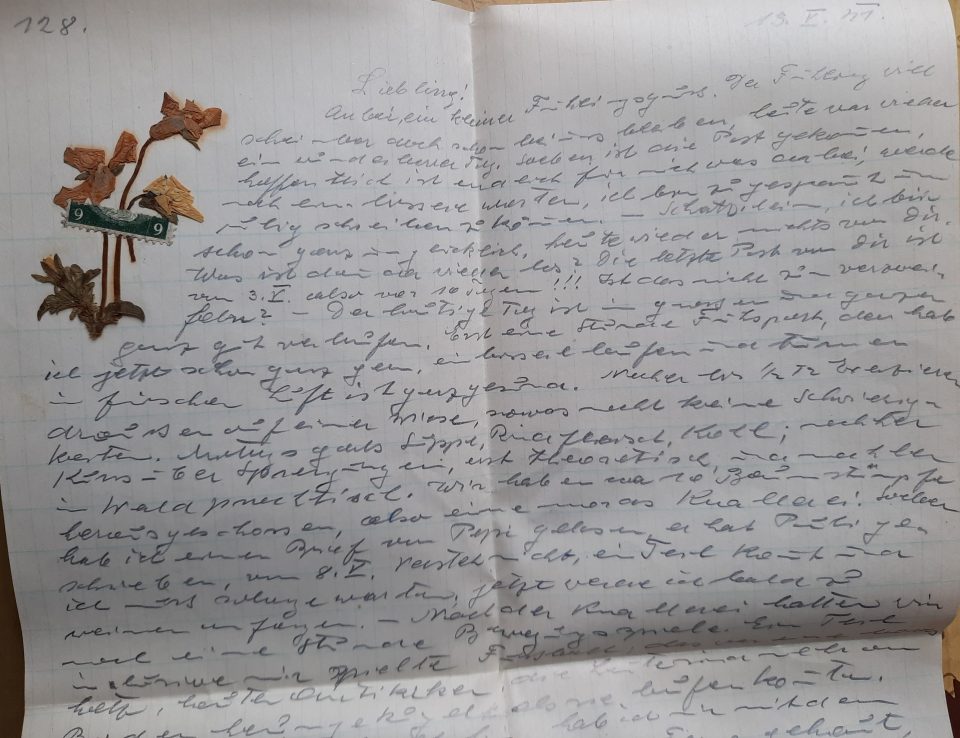
On 17 June 1941 Toni was finally transferred to the reserve army in Vienna and dismissed from active service on the front line on the basis of not being considered “trustworthy” because he refused to divorce his Jewish wife Lola.
Literature:
Buchmann, Bertrand Michael, Österreicher in der deutschen Wehrmacht. Soldatenalltag im 2. Weltkrieg, Böhlau Verlag Wien, 2009
Crha, Ewald, Österreicher im II. Weltkrieg. Konfrontation mit der Vergangenheit. Zeitzeugen berichten, Ennsthaler Verlag Steyr 2007

